

The statistical monitoring of non-profit organizations in Russia is held by the Ministry of Justice of the Russian Federation, on the official portal of which you can find information about all registered non-profit organizations. Based on these data, the number of NPOs in recent years has reduced: in 2016, the registry included 227 thousand non-profit organizations, in 2017 there were 223 thousand organizations, and in early October 2018, the registry includes 219,5 thousand organizations. It is difficult to say to what extent this decline reveals the real situation in the third sector. It is largely caused by the termination of the activities of those organizations that existed only on paper, without even providing annual planned reports to the Ministry of Justice. So, for 2016, the report included 112 675 organizations82 The main results of activity of the Ministry of Justice of the Russian Federation for 2017 // Website of the Ministry of Justice: http://minjust.ru/sites/default/files/itogovyy_doklad_2017_1_0.docx.. In 2017, by the court decision, 4,753 non–profit organizations were excluded from the register, by the decision of the tax authority 7,857 NPOs were excluded as well with a total of more than 18 thousand organizations. During this period, 14,895 new non-profit organizations have been registered.
The main part of the NPOs are registered in the form of public organizations (62766), autonomous non-profit organizations (26029), non-profit foundations (18933), institutions (14366), non-profit partnerships (12864) and associations of legal entities (10853). Among the registered NPOs there are several separate groups determined by their organizational and legal form, namely: 30 832 religious organizations, 20 731 trade unions, 3555 political parties (with regional representative offices), 2744 bar associations, 2718 Cossack societies, 1526 communities of small peoples. In addition, the NPOs formally include state (municipal) institutions, state corporations (including Rostec, Roscosmos, Rosatom and Vnesheconombank).
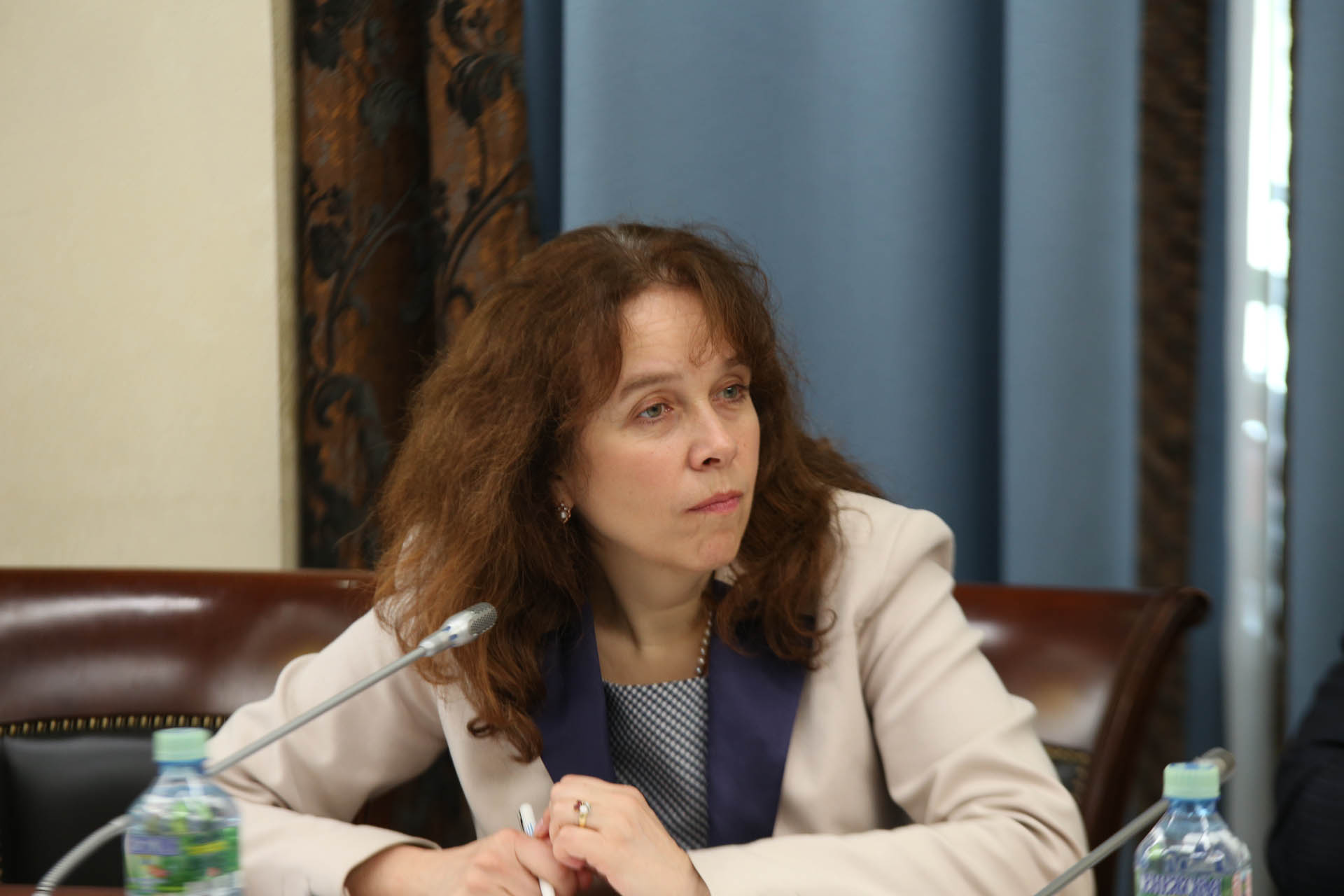
Thus, many organizations registered as NPO are not engaged in non-commercial activities. In order to identify the organizations that are created for the implementation of non – commercial projects, a new category of socially oriented NPO was introduced into the legislation since 2010. In particular, state-owned corporations cannot be included in the list of SO NPOs. At the same time, the classification of NPO as socially oriented organization is carried out on a formal basis – it is enough to mention at least one activity recognized as socially oriented in the Charter of the organization. Today, the vast majority of NPOs (about two-thirds of all registered ones) are socially oriented. They include, for example, religious organizations, i.e., a very special group of NPOs. In addition, the SO NPO include professional sports clubs and other organizations that only nominally belong to the non-profit sector, but in fact are not non-profit organizations. As a result, the category of SO NPO today does not allow to identify organizations created for the implementation of non-profit projects, there is a mixture of the concepts of NPO and SO NPO.
Statistics on socially oriented NPOs is kept by Federal State Statistics Service. On the basis of the published numbers, the dynamics of the development of the sector has not undergone significant changes: in 2015 Russia had 140031 SO NPOs, in 2016 – 143436, and in 2017 – 142641. The most numerous of them are the organizations engaged in activities in the field of physical training and sports (29752), education, science (27331), patriotic, spiritual and moral education of children and youth (18069), charity (15914)83 One organization may carry out several activities.. 25129 organizations are engaged in the provision of social services to the population. The number of SO NPO employees in 2016 amounted to 672 thousand people, in 2017 – to 630 thousand. While in late 2015 Federal State Statistics Service counted about 2.5 million volunteers of SO NPO, at the end of 2016 they already amounted to 3.8 million, and in 2017 the average number of volunteers has fallen again to 2.7 million people 84 According to the method of Federal State Statistics Service, the calculation of the “average number of volunteers” reflects the average number of volunteers – physical persons performing activities in the form of unpaid labor, engaged by the organization during the reporting year, including the average number of volunteers participating in the activities of the organization on an ongoing basis throughout the year, and volunteers involved by the organization within the framework of preparation and carrying out certain events.. The reasons for such fluctuations remain unclear.
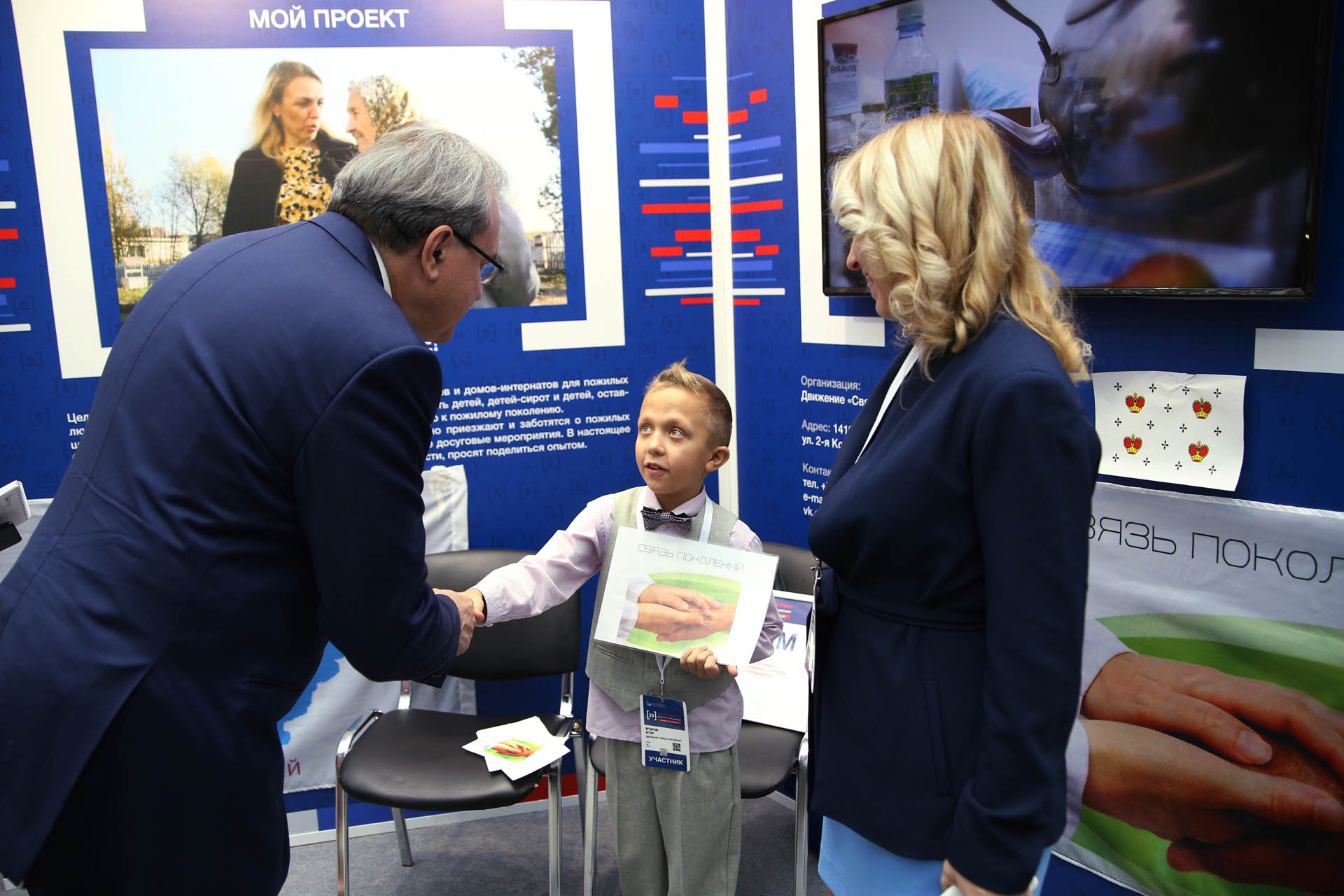
The total income of SO NPOs in 2015 amounted to $686 billion rubles, in 2016 to 831 billion rubles and in 2017 to 848 billion rubles, including revenues from sales of goods, works, services, property rights – 261 billion, revenues of Russian commercial organizations – 199 billion, revenues, grants from Russian individuals – 113 billion, receipts from the federal budget – 43 billion, revenues of budgets of the subject regions of the Russian Federation – 38 billion. As it was noted in the Report of the Civic Chamber of the Russian Federation for 2017, such impressive figures are not consistent with the available data on the total volume of the economy of the real non-profit sector. It is not clear what organizations provide for such indicators, which part of these funds goes through those NPO that are really created for the implementation of non-profit projects. After all, for example, the municipal institutions created in the form of NPOs can receive funding within the framework of state assignments, but it can not be attributed to the financial performance of the non-profit sector itself.
Such gaps in the statistical accounting of NPOs are largely due to the fact that the non-profit sector organizations are studied in bulk, without ranking into groups by the number of employees, real activities and financial indicators. Taking into account what different organizations are included in the number of NPOs, the generalized data do not say much about the real situation and dynamics of the non-profit sector. Simply put, these figures can be compared with the “average temperature in the hospital”. As a result, it is impossible to understand how many non-profit organizations actually operate in Russia in the field of education, culture, health, charity, what human and financial resources they have. Meanwhile, according to expert estimates, only 15-25% of the registered NPOs continue to operate on a permanent basis. Thus, according to the Civic Chamber of Primorsky Territory, there are more than 3 thousand registered NPOs in the region, but the number of active NPOs, actually operating in the relevant areas does not exceed 250, although it is gradually growing due to various forms of state support85 Based on the materials sent at the request of the Civic Chamber of the Russian Federation, from the Civic Chamber of Primorsky Territory.
In this regard, in 2018, the Civic Chamber of the Russian Federation sent a request to the Federal State Statistics Service asking to provide information on the distribution of SO NPOs by the average number of employees in the organization, on the receipts of funds and other property in the context of the average number of employees in the organization, on the sources of formation of funds and other property of the organization by the constituent entities of the Russian Federation, as well as on the number of SO NPOs, which were supported from the federal budget and the budget of the subject regions of the Russian Federation. It follows from the response of the Agency that “in order to obtain representative data on the proposed groups of socially oriented non-profit organizations, it is necessary to conduct a complete survey, however, in the conditions of limited funding, it is not possible to conduct a complete survey”86 Based on the materials of the Federal State Statistics Service, sent at the request of the Civic Chamber of the Russian Federation..
The current situation with no reliable data of how many NPO in Russia really operate on a continuous basis, the areas where they work, the financial flows passing through different kinds of NPO cannot be considered acceptable. Indeed, in the absence of a clear picture of the structure and resources of the non-profit sector, it is difficult to develop clear instruments of state support and a common strategy.
This problem is raised by NPOs themselves. In 2018, the Association of grant organizations “Forum of donors” proposed to introduce a number of changes in the reporting system submitted by NPOs to the Ministry of Justice. It is proposed to introduce the mandatory electronic order, to combine the existing forms into one, to provide data in a structured form available for statistical processing, to make the submission of reports mandatory for all organizations. In addition, it is proposed to distinguish three levels of data, depending on the level of financial income of the organization and whether it is eligible for public funding. The expanded report is expected to disclose information about the mission of the organization, the actual activities, the number of staff members and volunteers, the sources of formation of the organization’s property, as well as information about the expenditure of target funds87 Proposals to change the mandatory reporting of NPO to the Ministry of Justice // Forum of donors, 06.07.2018: http://www.donorsforum.ru/reports/predlozheniya-po-izmeneniyu-obyazatelnoj-otchetnosti-dlya-nko-v-minyust/..
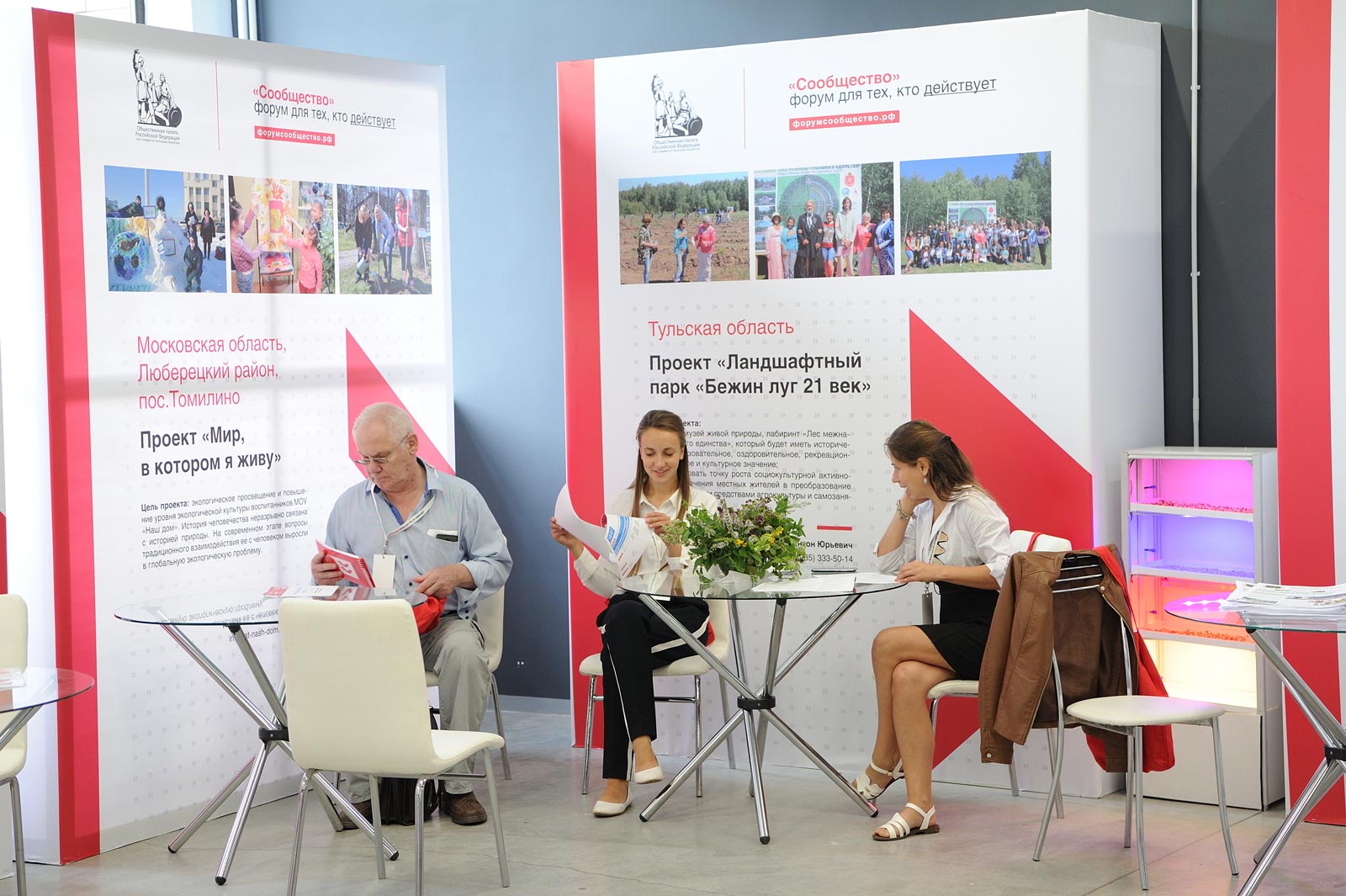
The Civic Chamber of the Russian Federation proposes to open discussion of reorganizing the system of statistical accounting of the non-profit sector, which should involve all stakeholders: NPO employees, experts, representatives of specialized agencies. The new system of statistical accounting should, first of all, allow to rank non-profit organizations, to show the real scale and aspects of their activities. This is a crucial step to setting up more subtle support system and regulation of the non-profit sector.
Among the most complicated problems and difficulties faced by NPOs in their work are financial difficulties (60%), imperfection of the legislative framework (52%), lack of interaction with the media (32%), lack of support from local governments (22%)88 Based on the materials sent at the request of the Civic Chamber of the Russian Federation from the Civic Chamber of Kemerovo Region..
Recent years have been marked by the growth of state support to the third sector.
The main form of state support to socially oriented NPOs are budget subsidies (grants). The total allocations from the Federal budget to the NPOs increased from 9.1 billion rubles in 2016 to 12.9 billion rubles in 2017.
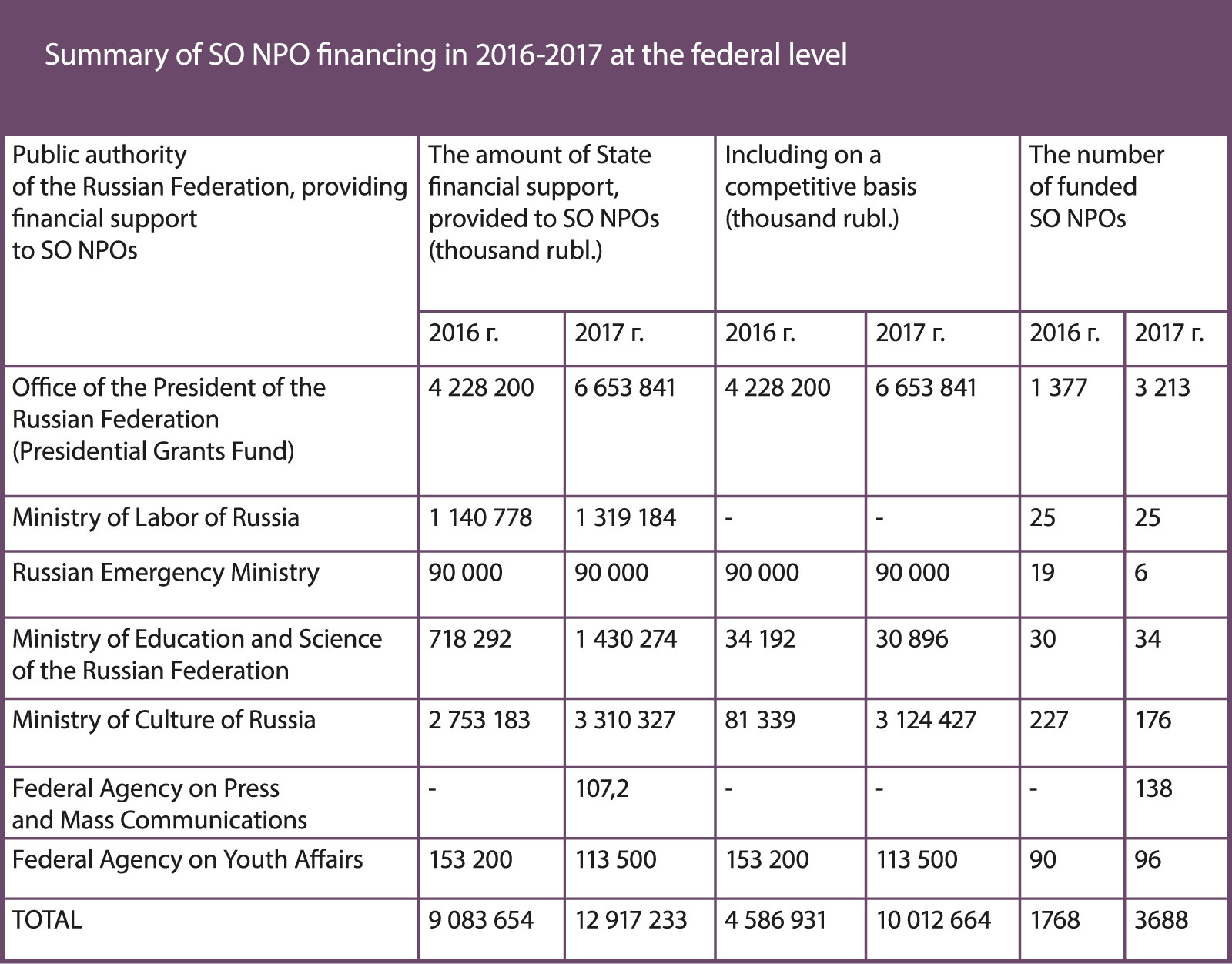
Source: The Ministry of Economic Development of the Russian Federation89 Report on the activities and development of socially oriented non-profit organizations in 2018 // Portal of the unified automated information system on support to socially oriented non-profit organizations Ministry of Economic Development of the Russian Federation, 05.09.2018: http://nko.economy.gov.ru/PortalNews/Read/4439.
In the beginning of 2017, a single Presidential Grants Fund was established, which distributes grants to non-profit organizations involved in the development of civil society institutions. In 2017, the Fund has distributed more than 6 billion rubles among 3213 SO NPOs In 2018, the program of presidential grants provided 8 billion rubles. The contest featured NPO projects in 13 areas in the field of social protection, health, education and science, youth policy, and since 2018, a new field “Identification and support of young talents in the field of culture and art.”
In total, during 2017-2018, the Presidential Grants Fund organized four contests for grants of the President of the Russian Federation for the development of civil society, in which 16,814 non-profit organizations took part. They prepared and filed 35 184 socially significant projects. As a result, 6,786 projects were supported for a total of 14,490 million rubles, including 3 573 projects from all regions of the country for a total of 7.8 billion rubles including the total of two contests in 2018. 9,843 projects from all 85 regions of the country were submitted to the second contest in 2018, the list of winners included 2,022 non-profit non-governmental organizations from all regions of the country. More than half of the supported NPOs (1,049) received a presidential grant for the first time. Many (483) organizations participated in previous contests, but they managed to win only now, after the completion of applications. It is worth noting the steady growth in the number of regional projects (excluding Moscow and St. Petersburg), which become winners of the contests. For example, as compared to 2015, the number of supported regional projects increased fourfold. The number of winning projects from small towns and rural areas has increased, in 2018 1068 organizations received grants totaling more than 1.2 billion rubles (20% more than last year)90 The list of projects from small towns and rural areas // Presidential grants fund: https://clck.ru/EkQXy.. The expansion of geography and the increase in the number of applications suggests that people believe in this system and that they can get financial support for their project.
In 2018, amendments were made to the tax code exempting citizens from paying personal income tax (PIT) while receiving money from presidential grants. The amendments will remove the burden from the payments that NPP make to volunteers or any beneficiaries. Volunteers will be exempted from paying personal income tax if they receive assistance in kind, for example, in the form of payment of a ticket to the place where they will carry out their volunteer activities, as well as accommodation, food and other needs.
One of the main issues of the grant program is the real social effect of the implemented projects. Currently, the presidential grants Fund is developing a system for assessing the efficiency of projects and measures of social impact. In some regions, the presentation of the results of grant projects is held at the sites of regional civic chambers.
Financial support to the NPOs is also provided by the executive authorities of the subject regions of the Russian Federation and local self-government bodies. Government programs of the regions of the Russian Federation in support of the SO NPOs are currently adopted and implemented in 74 regions of the country.
According to the Ministry of Economic Development, 6.6 thousand organizations received financial support from regional budgets in 2017 (5.7 thousand in 2016). The amount of state financial support provided to the NPOs from the budget of the Russian Federation amounted to almost 25 billion rubles (in 2016 – 19.5 billion)91 Based on the materials of the Ministry of Economic Development of the Russian Federation sent at the request of Civic Chamber of the Russian Federation.. In the form of subsidies on a competitive basis in 2017, 8.7 billion rubles was distributed (in 2016 – 6.2 billion). Thus, in Moscow, 273 million rubles was allocated for the implementation of socially significant projects on a competitive basis in 2017: 687 NPOs participated in the contest, 181 projects were supported. In 2018 the contest budget amounted to 400 million rubles92 Grants of the Mayor of Moscow: accepting applications from NPO starts on May 15 // Rossiyskaya Gazeta, 14.05.2018: https://rg.ru/2018/05/14/reg-cfo/granty-mera-moskvy-priem-zaiavok-ot-nko-startuet-15-maia.html.. In Lipetsk Region, funds from the regional budget are allocated annually for the support and development of SO NPOs, in 2018 their size was 20.5 million rubles93 Based on the materials sent at the request of the Civic Chamber of the Russian Federation, from the Civic Chamber of Lipetsk Region.. In 2017, 7.5 million rubles was allocated from the budget of Penza Region to provide subsidies from the NPO of Penza Region, 46 SO NPOs were supported94 Based on the materials sent at the request of the Civic Chamber of the Russian Federation, from the Civic Chamber of Penza Region..
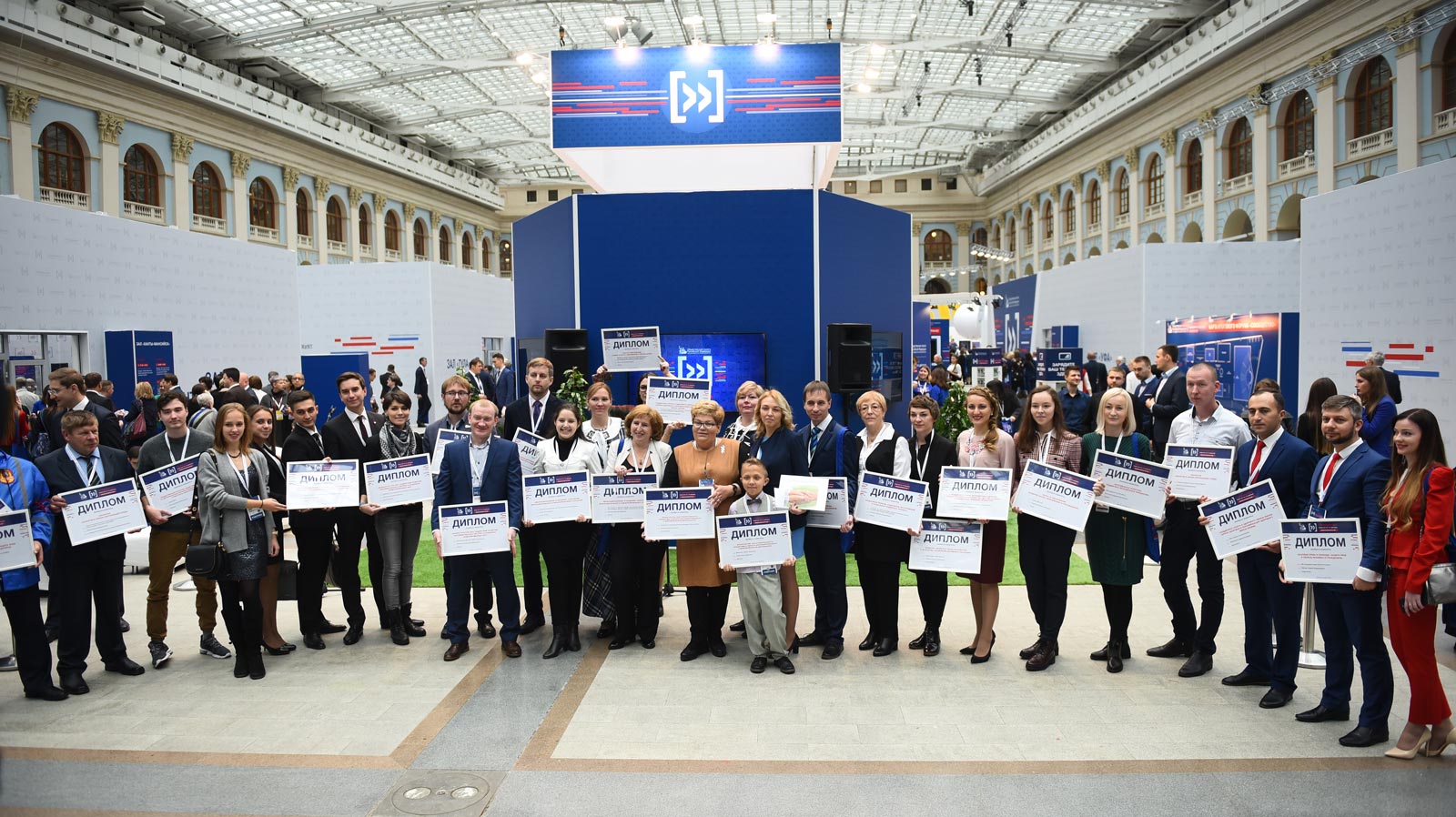
Not all regions publish detailed and accessible information about NPOs contests and their results. An example for the regions is the Presidential Grants Fund portal, where one can submit an application and all documents in the electronic form. In 2018, following this example, a single operator in Yugra was created, the document flow was transferred to an electronic form, you can apply electronically and get detailed information about the grant on the portal of civil society development “Югражданин.рф”95 A single operator for NPO to appear in Yugra // Social information agency, 05.04.2018: https://www.asi.org.ru/news/2018/04/05/yugra-nko-edinyj-operator/..
There is a trend of growing support to the SO-NPOs at the municipal level: the amount of subsidies provided to local budgets for the implementation of municipal support programs for the SO NPOs increased from 2.3 billion rubles in 2016 to 2.9 billion rubles in 2017. The share of the municipal districts and urban districts that implement activities in support of the SO NPOs has grown over the year 2017 from 53% to 62%. At the same time, only 23% of municipal districts and urban districts have adopted programs to support NPOs96 Report on the activities and development of socially oriented non-profit organizations in 2018 // Portal of the unified automated information system on support to socially oriented non-profit organizations Ministry of Economic Development of the Russian Federation, 05.09.2018: http://nko.economy.gov.ru/PortalNews/Read/4439..
According to the survey held by the Civic Chamber in 2018, about half of the participants of the “Community” Forums appealed to the regional and municipal governments for financial and property support, of which more than 30% in one form or another received this support. Similar data were presented by the Civic Chamber of Kemerovo Region97 Based on the materials sent at the request of Civic Chamber of the Russian Federation, from the Civic Chamber of Kemerovo Region..
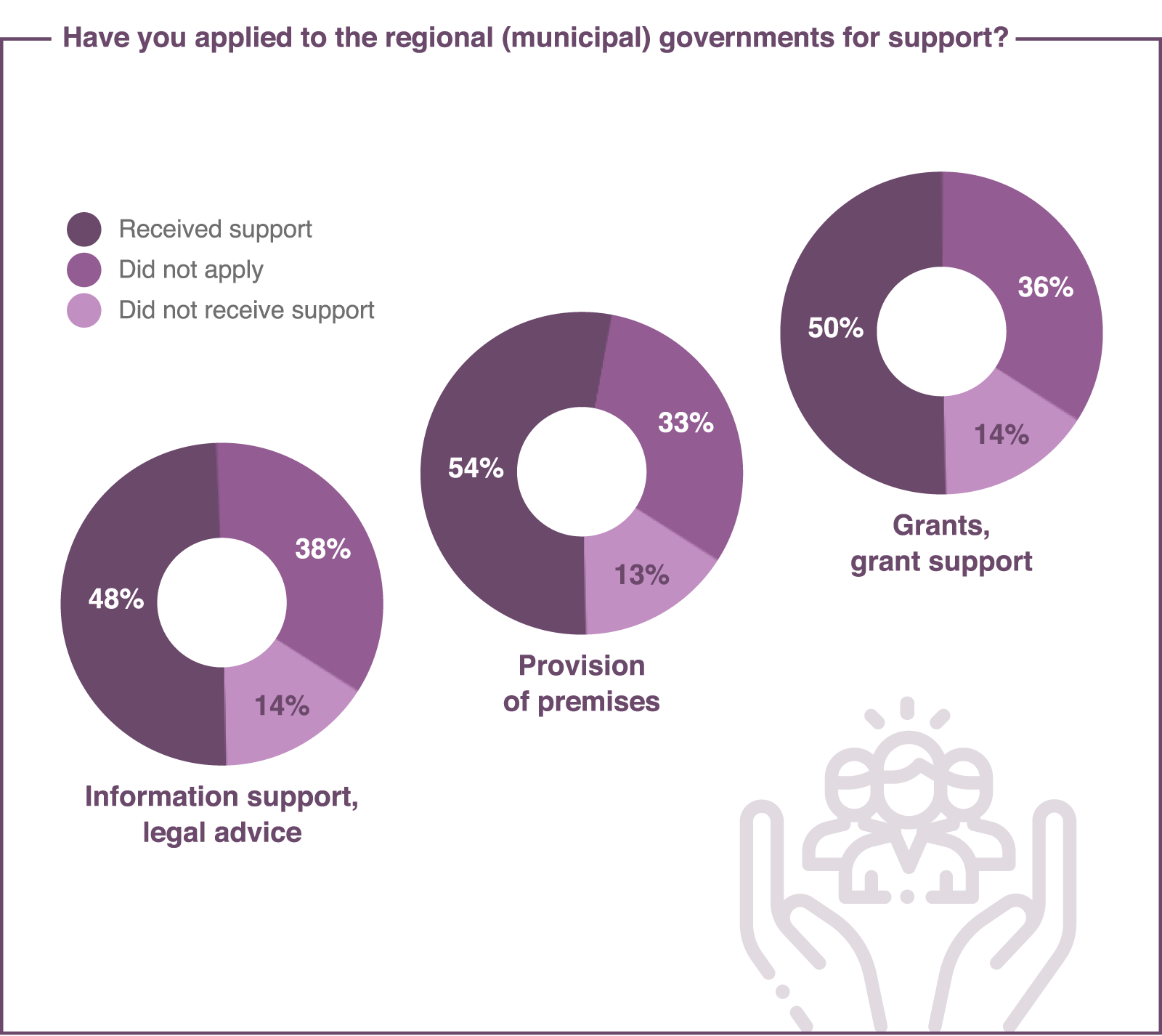
Source: Civic Chamber of the Russian Federation98 Description of the survey, see link 42.
According to Federal State Statistics Service, in 2017, the total revenues to the SO NPOs from the federal budget amounted to 43 billion rubles (in 2016 – 28 billion rubles), from the budgets of the subject regions of the Russian Federation – 38 billion rubles (in 2016 – 49 billion), from municipal (local) budgets – 10 billion (in 2016 – 7 billion), from state extra – budgetary funds-6 billion (remained at the level of 2016). However, as before, there are a number of questions to these figures. First, what can cause such abrupt changes in total revenues from the federal and regional budgets? Secondly, what forms of public support are taken into account? It is obvious that in this case we are talking about obtaining state subsidies by autonomous non-profit organizations. Among the recipients of state support there are NPOs established at state social institutions, professional sports clubs.
In some countries, the focus is on public funding of the organization’s current activities, which provides for the implementation of long-term social projects. The participants of the “Community” Forums, while answering the question of what form of state support should be a priority for the NPOs, divided on this issue approximately equally.
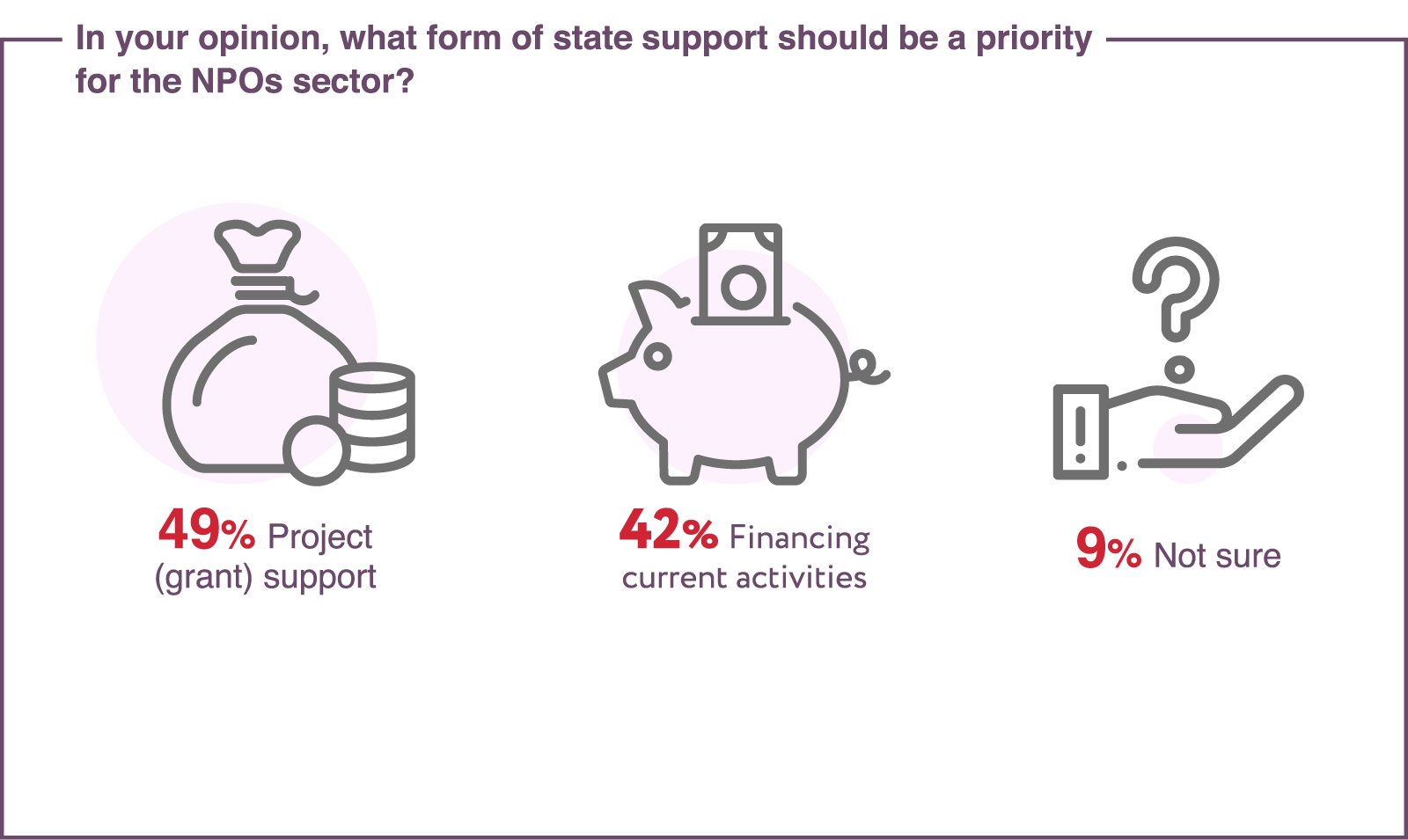
Source: Civic Chamber of the Russian Federation99 Description of the survey, see link 42.
In our country, the state provides property support to the third sector in the form of transfer of non-residential premises for ownership and use. According to Federal State Statistics Service, only 7544 Russian SO NPOs have non-residential premises (building) in the property, about 32 thousand NPOs use non-residential premises free of charge, which are in state, municipal or private ownership, about 26 thousand organizations rent non-residential premises. The total number of the SO NPOs that received real estate for rent on preferential terms or for free use in 2017 amounted to 3.4 thousand organizations (in 2016 – 3.1 thousand), the amount of space provided in 2017 amounted to 969 thousand square meters (in 2016 – 667 thousand), which is an average of 284 square meters per organization (in 2016 – 215 square meters).
In addition, 29 subject regions of the Russian Federation are taking measures to provide the commercial space owned by the csubject regions of the Russian Federation on preferential terms to the NPO and social entrepreneurs.
Legal, consulting, information and organizational support from NPOs in the regions is provided by resource centers, volunteer centers, centers of innovation in the social sphere. The financial support at the regional level in 2017 was provided to 125 resource centers in 67 subject regions of the Russian Federation totaling 166.6 million rubles. In addition, social innovation centers are being created in the regions, which, along with small businesses, can provide support to the SO NPOs. In 2017, the federal budget provided subsidies for the creation and development of 11 such centers (4 of which are new) in amounting to 31.5 million rubles.
According to a survey conducted by the Civic Chamber of the Russian Federation, the vast majority of participants in the “Community” Forums are aware of the resource centers in the regions, but only about 22% regularly use their services.
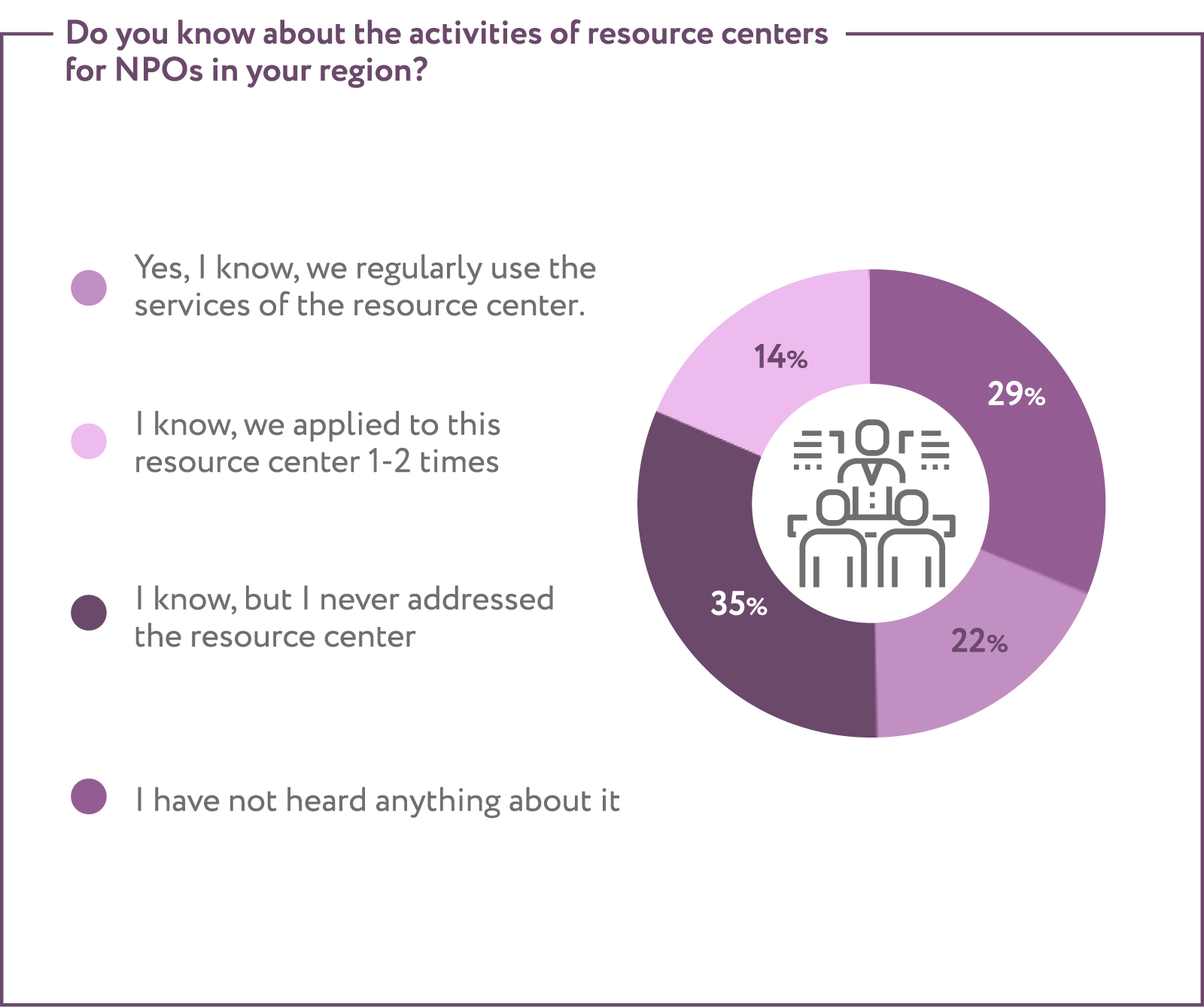
Source: Civic Chamber of the Russian Federation100 Description of the survey, see link 42.
The examples of some regions deserve special attention and replication. An extensive and constantly functioning network of municipal resource centers has been established in Novosibirsk Region. The budget of organizations is about 200 to 600 thousand rubles, they receive these funds from both the regional and municipal budgets. Two persons work as volunteers, they are usually paid somewhere else. They are provided with material and resource base and premises by the municipality101 #Region NPO – Novosibirsk: unique experience of succession in obtaining grants //Website of the Civic Chamber of the Russian Federation,18.06.2018: https://oprf.ru/press/news/2018/newsitem/45683.. In 2018, the online resource center “NPO. Udmurtia was created to provide non-profit102 http://nkoudmurtia.ru. organizations and active citizens with a single information resource. News site is updated almost daily, here you can find previews of the actual events of the Udmurt Republic, information on grant contests and projects, useful links103 Based on the materials sent at the request of the Civic Chamber of the Russian Federation, from the Civic Chamber of the Udmurt Republic.. In 2018, the Siberian Federal District created a single Siberian resource center of NPO104 A single resource center for NPO will be created in the Siberian Federal District // Social Information Agency, 16.02.2018: https://www.asi.org.ru/news/2018/02/16/ulan-ude-volonterstvo-budushhee/..
According to the Ministry of Economic Development, the number of employees of SO NPOs who received training in the provision of services in the social sphere at the expense of funds of the subject regions of the Russian Federation increased from 3.6 thousand in 2016 to 7 thousand in 2017.
The engagement of NPOs in the provision of social services in the public sector is the main way to increase the share of the third sector in the economy and improve the quality of social services. NPOs have obvious advantages. This, of course, does not mean completely abandoning state institutions, but the goal has been set to use the potential and capabilities of NPOs in a way that has long been accepted in many countries. It is the social services of NPO that are most in demand by the population. In Kemerovo Region, the question “In which areas can the non-profit organizations bring maximum benefit?” was asked to residents, who responded as follows: to combat asocial phenomena (55%), charity (42%), social support and social services (41%). Among the representatives of NPOs themselves, two areas are leading – social support and the provision of social services (88%) and charity (72%)105 Based on the materials sent at the request of the Civic Chamber of the Russian Federation from the Civic Chamber of Kemerovo Region..
The state has embarked on the active involvement of NPOs in the provision of social services provided to the public at the expense of the budget. Speaking at the “Community” Forum in Moscow in November 2017, the President of Russia repeated that “we need thousands of such organizations throughout the country willing to take responsibility, to be a reliable partner of the state in the social sphere”106 “We will continue to create favorable environment for the development of the non-profit sector” – Vladimir Putin // Website of the Public Chamber of the Russian Federation, 03.11.2017: https://www.oprf.ru/ru/press/news/2017/newsitem/42739.. The goal was to send 10% of the budget funds allocated to the social sphere to the NPOs, with the corresponding regulatory framework established.
In accordance with the Federal Law of 28 December 2013, No. 442-FZ “On the Fundamentals of Social Services for Citizens in the Russian Federation”, registries of social service providers are formed in the regions and a program of step-by-step access of NPOs to budget funds for providing services to citizens in the social sphere is implemented. The main document in this area is the Complex of measures aimed at ensuring the gradual access of socially oriented non-profit organizations operating in the social sphere to budget funds allocated for the provision of social services to the population for 2016-2020.
According to the Ministry of Economic Development, 72 subject regions of the Russian Federation provide funding to SO NPOs in the social sphere (2016 – 49) as part of the implementation of a set of measures aimed at ensuring the gradual access of socially oriented non-profit organizations operating in the social sphere to budget funds allocated for the provision of social services to the population, in five main areas: social protection and social services, education, culture, protection of public health, physical training sports. The total amount of funds allocated by the subject regions of the Russian Federation to the NPOs in these areas in 2017 amounted to more than 24 billion rubles. The funds were distributed among 4.1 thousand NPO, which received more than 6 million people In particular, in the field of social protection and social services, the cumulative increase in funding for SO NPOs was 98% (from 2.94 billion rubles in 2016 to 5.82 billion in 2017).
In the form of compensation for services rendered to SO NKO under the Federal Law “On the Principles of Social Services for Citizens in the Russian Federation” in 2017, 777 million rubles was allocated (in 2016 – 544 million)107 Based on the materials of the Ministry of Economic Development of the Russian Federation sent at the request of Civic Chamber of the Russian Federation.. At the same time, 455 million went to the Republic of Bashkortostan, where the transfer of services to SO NPO is carried out through the mechanism of re-registration of state (municipal) organizations into non-commercial ones.
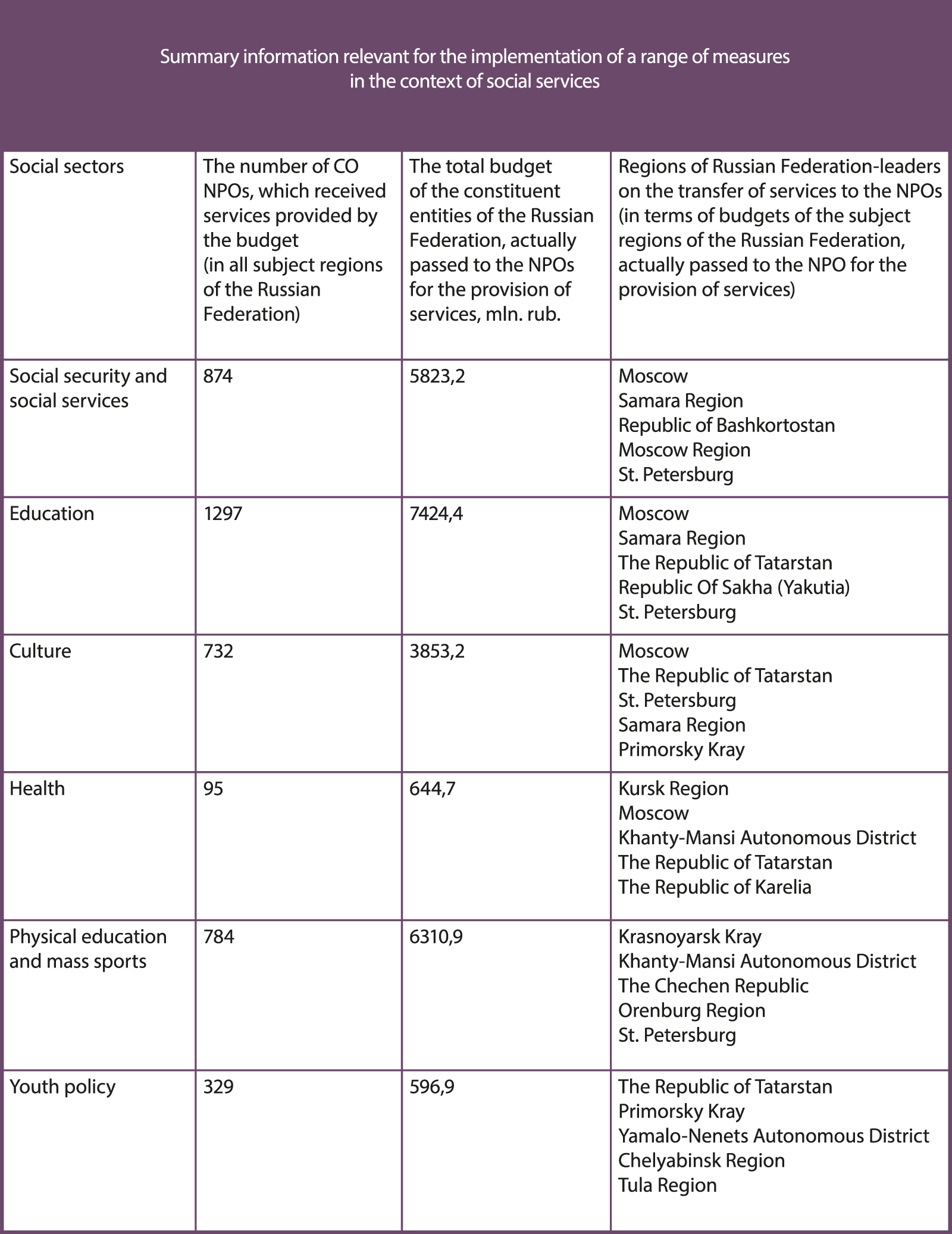
Source: The Ministry of Economic Development of the Russian Federation108 Report on the activities and development of socially oriented non-profit organizations in 2018 // Portal of the unified automated information system on support to socially oriented non-profit organizations Ministry of Economic Development of the Russian Federation, 05.09.2018: http://nko.economy.gov.ru/PortalNews/Read/4439.
In November 2018, the Ministry of Economic Development of the Russian Federation announced at the “Community” Forum the results of the rating of the subject regions of the Russian Federation based on the implementation of support mechanisms for socially oriented non-profit organizations and social entrepreneurship, ensuring access for non-governmental organizations to the provision of social services and introducing competitive methods of providing state (municipal) services in the social sphere. The top five leaders of the rating consisted of Khanty-Mansi Autonomous District, Khabarovsk Territory, Republic of Sakha (Yakutia), Samara Region, Perm Territory109 Results of the rating of the subject regions of the Russian Federation on the results of the implementation of the mechanisms of support for SO NPO and social entrepreneurship // Portal of a unified automated information system to support socially oriented non-profit organizations Ministry of Economic Development of the Russian Federation, 02.11.2018: http://nko.economy.gov.ru/PortalNews/Read/4606..
On January 1, 2017, the Federal Law No. 287-FZ on Amending Federal Law on NCOs in Terms of Establishing the Status of NPO–Provider of Public Benefit Services came into force. The main reason is that those NPOs that provide social services of good quality, are entitled to receive state support and priority access to budgetary resources. Since 2017, the register of SO NPOs – Providers of the Public Benefit Services is being formed, at the end of October 2018, 171 organizations were included in it, 98 of them were included in 2018.
In 2018, the Civic Chamber of the Russian Federation initiated the work of the end-to-end section on the engagement of SO NPOs in the provision of social services held during the “Community” Forums. Representatives of nonprofit organizations took part in the work of the section, which allowed for public monitoring of the mechanisms for access of SO NPOs to the provision of social services. According to the results of the work, a number of problems were identified that impeded the development of this sphere, and proposals were made to overcome them.
First of all, public activists speak about the imperfection of the legal framework. To date, there are no clear mechanisms for providing privileges and preferences to SO NPO providing public benefit services. As a matter of fact, the entry into the register is a quality mark for the NPOs, but for the time being there are no particular advantages – they should be determined by administrative regulations in the regions, but such regulations are few in place. They fail to implement the provision of the federal law, according to which state authorities and local governments should provide support to SO NPOs — Providers of Public Benefit Services as a priority measure (In regional regulatory legal acts, the order of priority support to SO NPOs – PPBS is not disclosed, or general provisions are included that do not provide for any specific benefits to NPOs providing public benefit services).
The inequality of competitive conditions for the entry of SO NPOs into the social services market as compared to small and medium-sized businesses is noted – non-profit organizations do not have the possibility of obtaining debt financing, concessional lending, access to support infrastructure, etc. In addition, the NPO s cannot receive property support on a gratuitous (preferential) basis in the event that they receive reimbursement for the social services rendered, and regional SO NPOs have no preferences when concluding a state contract.
In addition to legislative measures, there are a number of administrative barriers. First of all, we are talking about a nominal transfer of NPO services through re-registration of budgetary organizations to non-profit ones. It was also noted that small NPOs that provide a small set of services cannot be included in the number of social service providers due to the orientation of the authorities on those providers rendering integrated services, like budget institutions.

Also there were a number of technical gaps that impede the engagement of NPOs PO in the provision of social services on a competitive basis. Representatives of non-profit organizations say that there is no methodology for tariffing new, including innovative NPO services in the social sectors. There is no reimbursement for the provision of urgent social services, standards for many social services, including those included in the list of public benefit services. Compensation for the work done often does not cover even the minimum expenses of the organization. For example, in Rostov Region the tariff for social and psychological counseling, including on issues of intra-family relations, is 13.3 rubles per class, in Orenburg Region – 24.81 rubles. The purchase and home delivery of food in Rostov Region costs 15.2 rub., in Orenburg Region – 11.41 rub, the socio-psychological correction – respectively 42.16 rubles. and 4.82 rubles. The regional and municipal social institutions are nominally funded on the basis of the same tariffs. But apart from that, the state assumes many of their expenses for premises, administration and so on. The NPOs have no such support. The tariff is unable to provide even the monthly salary, let alone the bills for accommodation, communications, transportation110 15 rubles for all // Rossiyskaya Gazeta, 29.01.2018: https://rg.ru/2018/01/29/tarify-na-socialnye-uslugi-otstali-ot-zhizni.html..
In addition, the transfer of social services from SO NPOs does not imply the transfer the necessary material and technical base. There was also a huge amount of paper reporting by SO NPO — providers of social services, problems in drawing up an individual program for the recipient of social services, and a number of other difficulties.
As a result of the discussions, a number of proposals and recommendations were made to the executive authorities aimed at facilitating the access of SO NPOs to the social services market and the improvement of competitive conditions.
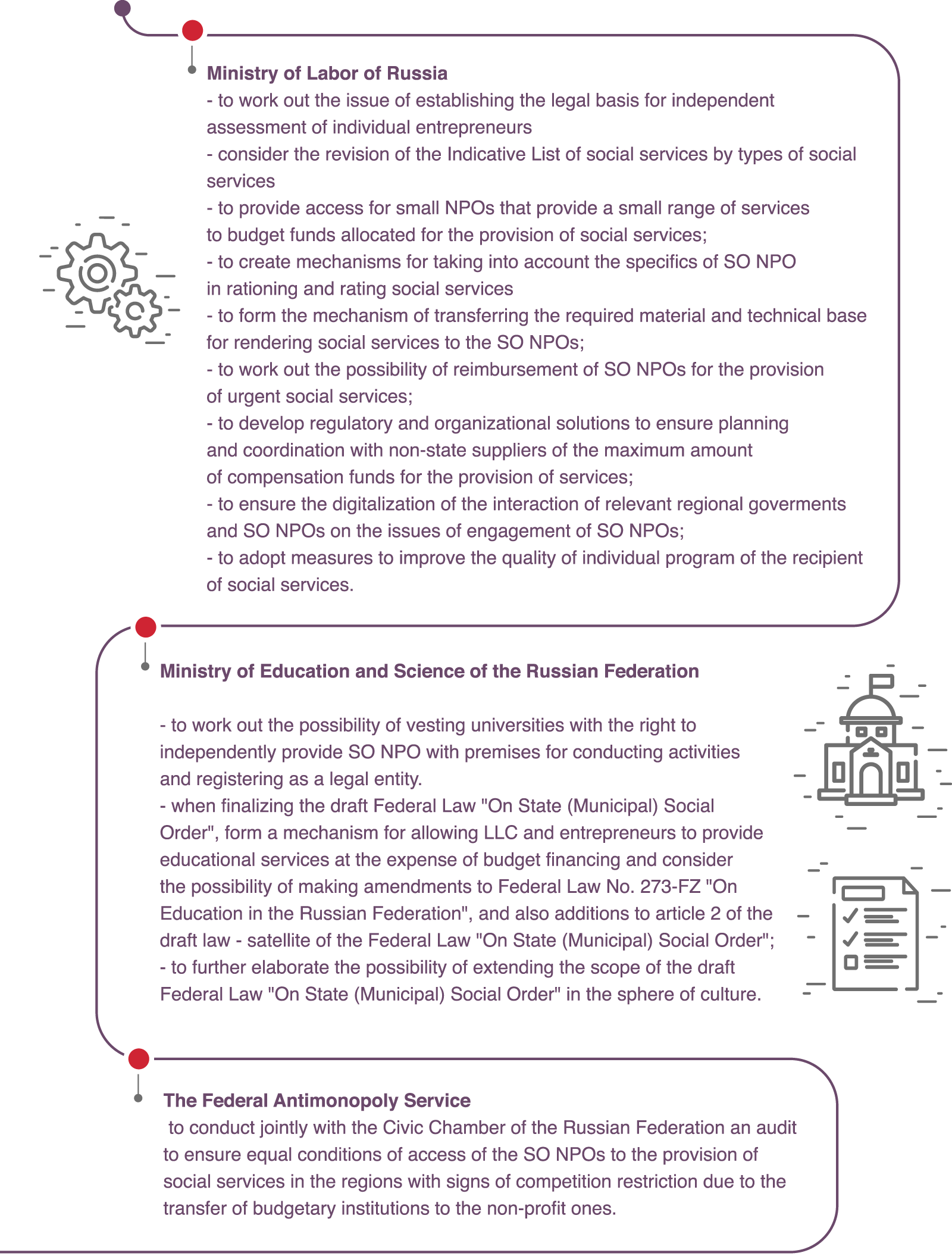
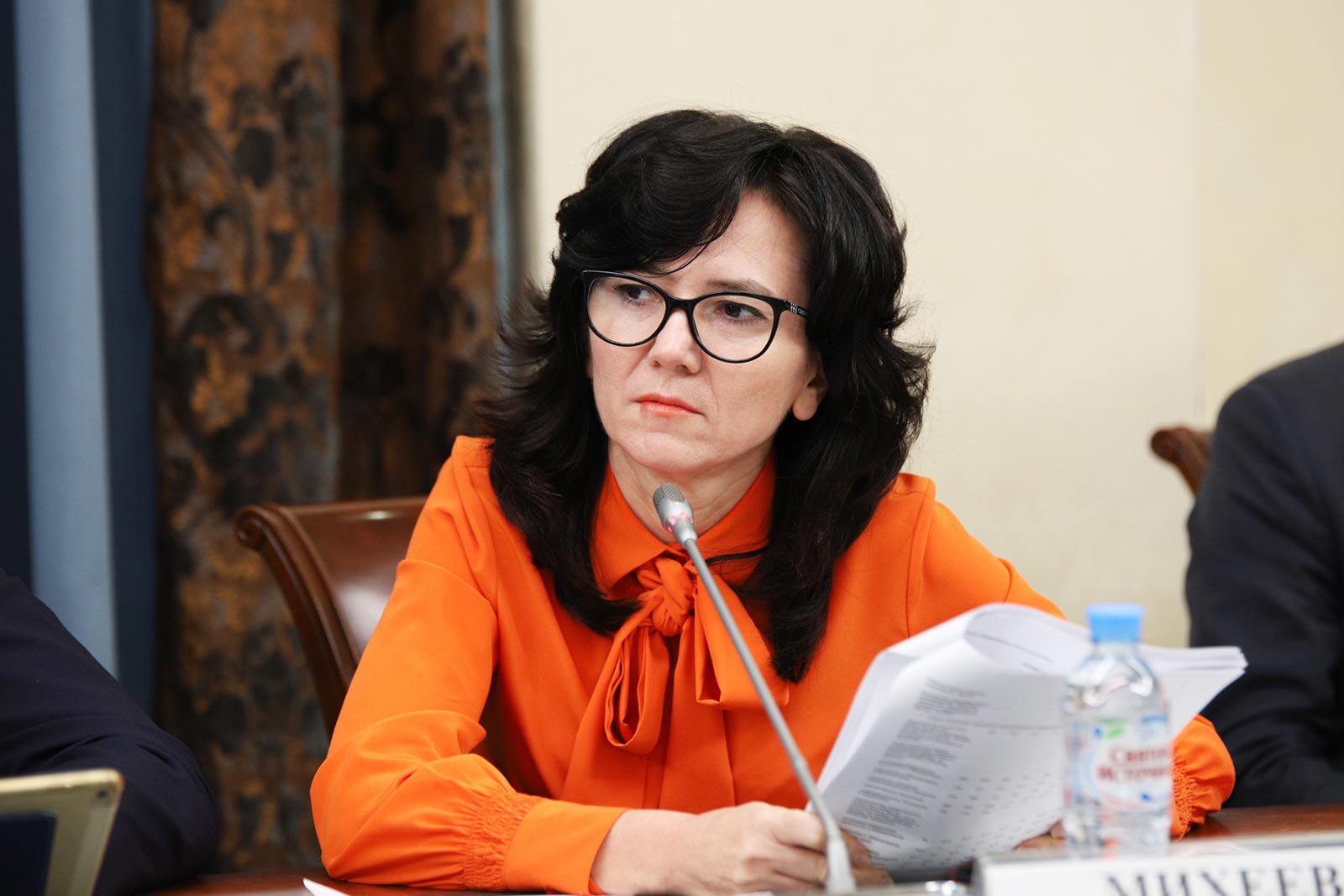
A new draft law of the Ministry of Finance of the Russian Federation “On the state (municipal) social order for the provision of state (municipal) services in the social sphere and amendments to certain legislative acts of the Russian Federation” is meant to help NPOs to compete with budget organizations in the social services market. It is assumed that with the adoption of the bill, the NPOs will be able to overcome the existing barrier in the pricing of services. The draft law makes it possible to make the information about the scope of services that the state undertakes to provide public, and establishes uniform approaches to the selection of performers. The draft law extends to the sphere of education, health care, social security and employment of the population, physical training, sports and tourism. At the same time, this will be a framework law, that is, it will simply introduce into the legal field two new mechanisms for attracting private organizations to provide citizens with a range of services (social order and certificate), and the implementation of these opportunities will depend on regional governments. If a law is adopted, its provisions will begin to apply when forming a state order for social services for 2020 and subsequent years, and holding contests with the participation of NPOs on electronic platforms from 2024. During this time, the relevant departments should develop an array of legal acts necessary for the implementation of the law.
The Civic Chamber of the Russian Federation held public examination (zero reading) of the bill. Its emergence seems timely and necessary, the access of non-governmental organizations to the social services market will be facilitated and greater certainty and the uniformity of law enforcement practice will be introduced in this area. The law will stimulate the introduction of advanced tools in the social sphere. However, there are some comments to the bill. The text does not define the procedure for choosing the method of performing services (there are no delineations between the use of competitive and non-competitive methods for selecting service providers). In addition, the NPOs, as participants in the system of state social order, are not specifically highlighted. It was also proposed to provide a clear mechanism for the responsibility of service providers for unfair and improper fulfillment of their obligations. All the proposals were referred to the relevant Ministry.
One of the main problems in the development of the non-profit sector in Russia is extremely weak awareness of the NPOs activities. Essentially, our citizens are not yet accustomed to consider non-profit organizations as an integral part of the life around them, in the way that happened in countries with a long tradition of the third sector.
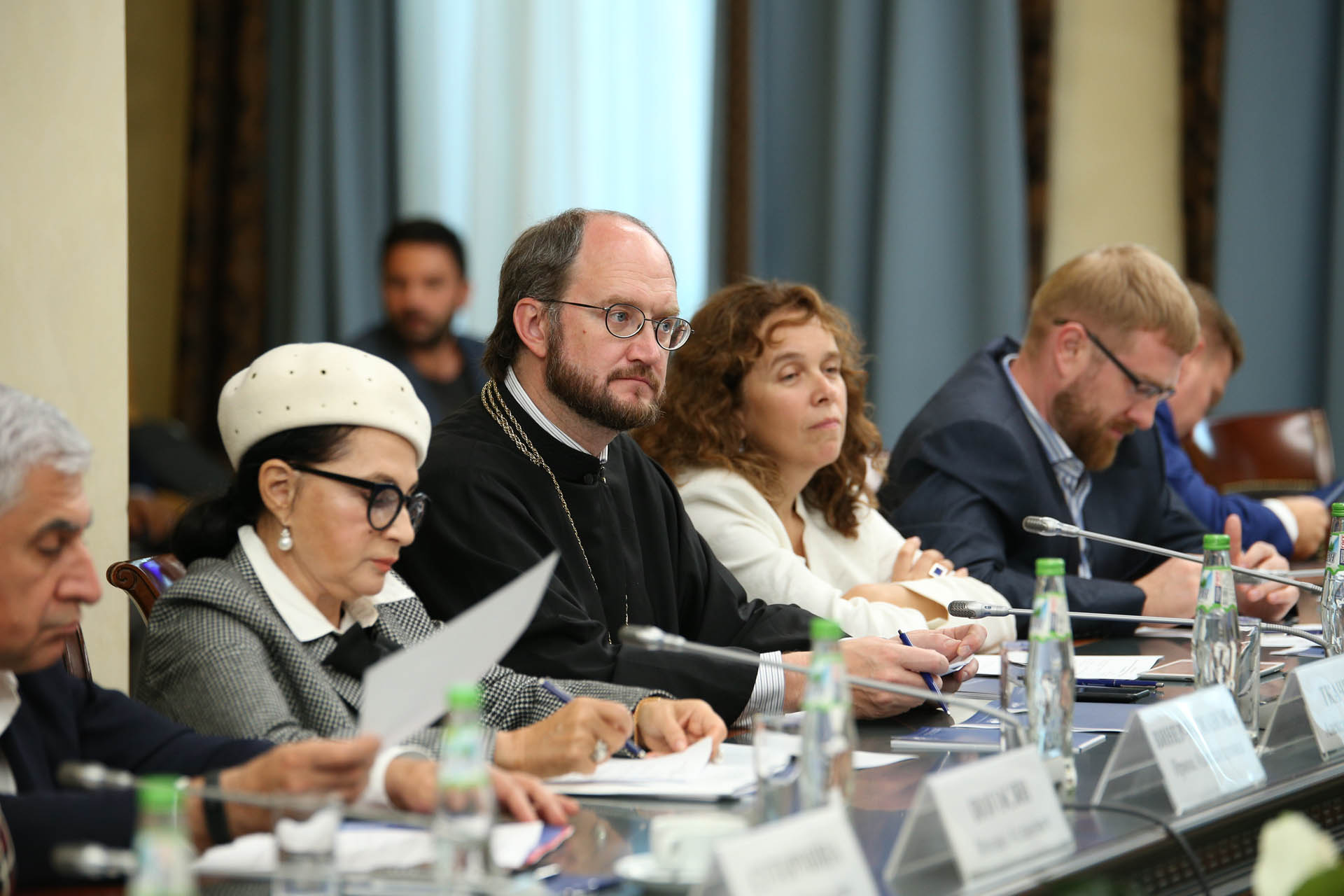
According to a study of Zirkon analytical group conducted in 2018, even in Moscow, with a high level of declared awareness of citizens about the activities of NPOs (63%), the vast majority (85%) said they did not use the services of non-profit organizations. Of those respondents who stated that they helped strangers in the past two-three years, only 9% said they were helping through the activities of NPOs and only 2% of Muscovites were able to identify charitable actions in which they participated; even fewer people have named specific NPOs (“Give Life” Foundation, “Faith” Foundation).
Most Muscovites perceive the NPOs as full subject regions of the solution of problems in the social sphere, but do not see the benefits of organizations of the third sector in comparison with other players in this market. With all that, Muscovites are demonstrating a positive attitude and interest in charity and public benefit activity: 43% of respondents would like to receive information on the activities of NPOs.
According to the Civic Chamber of Kemerovo Region, among the population, youth (38%), veteran (34%), human rights (32%), student (30%) and environmental (30%) public organizations are most in demand112 Materials sent at the request of the Civic Chamber of the Russian Federation from the Civic Chamber of Kemerovo Region..
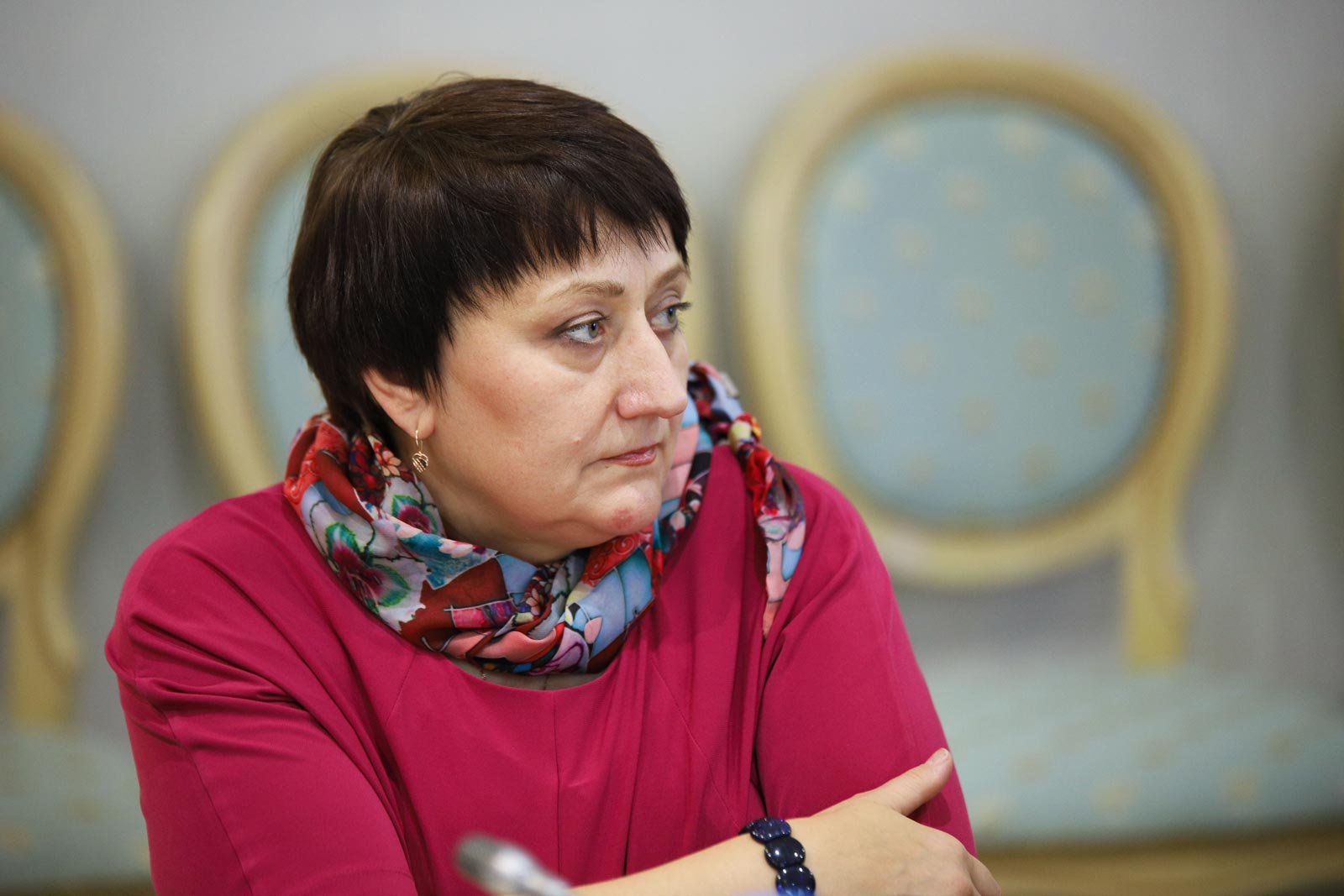
With a declared willingness to use the services of non-profit organizations and take part in non-profit projects, Russians are poorly aware of what the existing SO NPOs do in practice and how you can take part in their activities. Those SO NPOs that actually render help, as a rule, have limited financial resources, they do not have the opportunity to invest money in covering their activities, in attracting professionals who know how to work in the information space, and often they simply don’t have time.
Indeed, in the information field, the presence of SO NPOs is barely felt. This issue was raised at a meeting of the President of the Russian Federation Vladimir Putin with members of the Civic Chamber of the Russian Federation in August 2017. The President instructed to analyze the implementation of the provision of services for the dissemination of social advertising and to submit proposals to improve their accessibility for the SO NPOs. To this end, in November 2017, Coordination Council for Social Advertising and Social Communications was established under the Civic Chamber. First of all, the council monitors the creation of commissions for placing social advertising at federal TV channels. Public Television of Russia (OTR), the TV channel Zvezda, Channel One and the All-Russian State Television and Radio Broadcasting Company have adopted such commissions so far113 According to the Commission of the Civic Chamber of the Russian Federation on the development of the non-profit sector and the support of socially oriented NPOs.
Their websites display information with requirements for social advertising, and any organization, including a charitable one, can study these requirements and send its social advertising for broadcast. In addition, the Civic Chamber of the Russian Federation received information from the Ministry of Communications, that commissions on advertising were also created by VGTRK and the First Channel. However, public monitoring did not detect any presence of these commissions on the sites of these channels.
The procedure is currently being developed for conducting examinations of social advertising. The point is that if an NPO has made a social advertisement (including for collecting donations) and wants to place it in the media (first of all, on TV channels), it can turn to the Coordination Council, the experts of which will give a conclusion, is it really a social advertising, is it good enough? Having this conclusion, a NPO will be able to apply to the television channel with a request to place an advertisement in the air. It is important that when broadcasting social advertising the source of the message is not lost– i.e. specific non-profit organization.
In 2018 theCivic Chamber of the Russian Federation conducted a survey on the topic “informational transparency of NPOs in Russia”, which was attended by representatives of NPO, mainly small regional organizations with up to 10 people (76%)114 Survey “Information openness of non-profit organizations in Russia” was conducted from April 27 to June 5, 2018 at the initiative of the Commission for the Development of the Information Community, Mass Media and Mass Communications of the Civic Chamber of the Russian Federation. The sociological study included 484 persons representing 85 subject regions of the Russian Federation. The survey was conducted both among the members of NPOs and citizens, who actively interact with these organizations (federal and regional politicians, public and religious figures, representatives of research centers, print and electronic media).. The survey showed that about 14% of active regional NPOs regularly use social advertising, and the vast majority of respondents (88.2%) prefer to use the opportunities of social media to disseminate information, 68.4% publish materials in traditional media. NPOs tend to establish communications without intermediaries, including via the Internet, and an indicator of the real activity of NPO is the presence of a website and a page on social media. At the same time, only a quarter of respondents stated that they did not have regular contacts with the media, the vast majority resort to the services of the local newspapers, TV and radio channels (only 4% named Russian newspapers). According to the Civic Chamber of the Republic of Karelia, in order to inform the public about its work, local non-profit organizations often use: Internet-63.5%; holding mass events-20.3%; media-16.2%115 Based on the materials sent on request of the Civic Chamber of the Russian Federation, from the Civic Chamber of the Republic of Karelia..
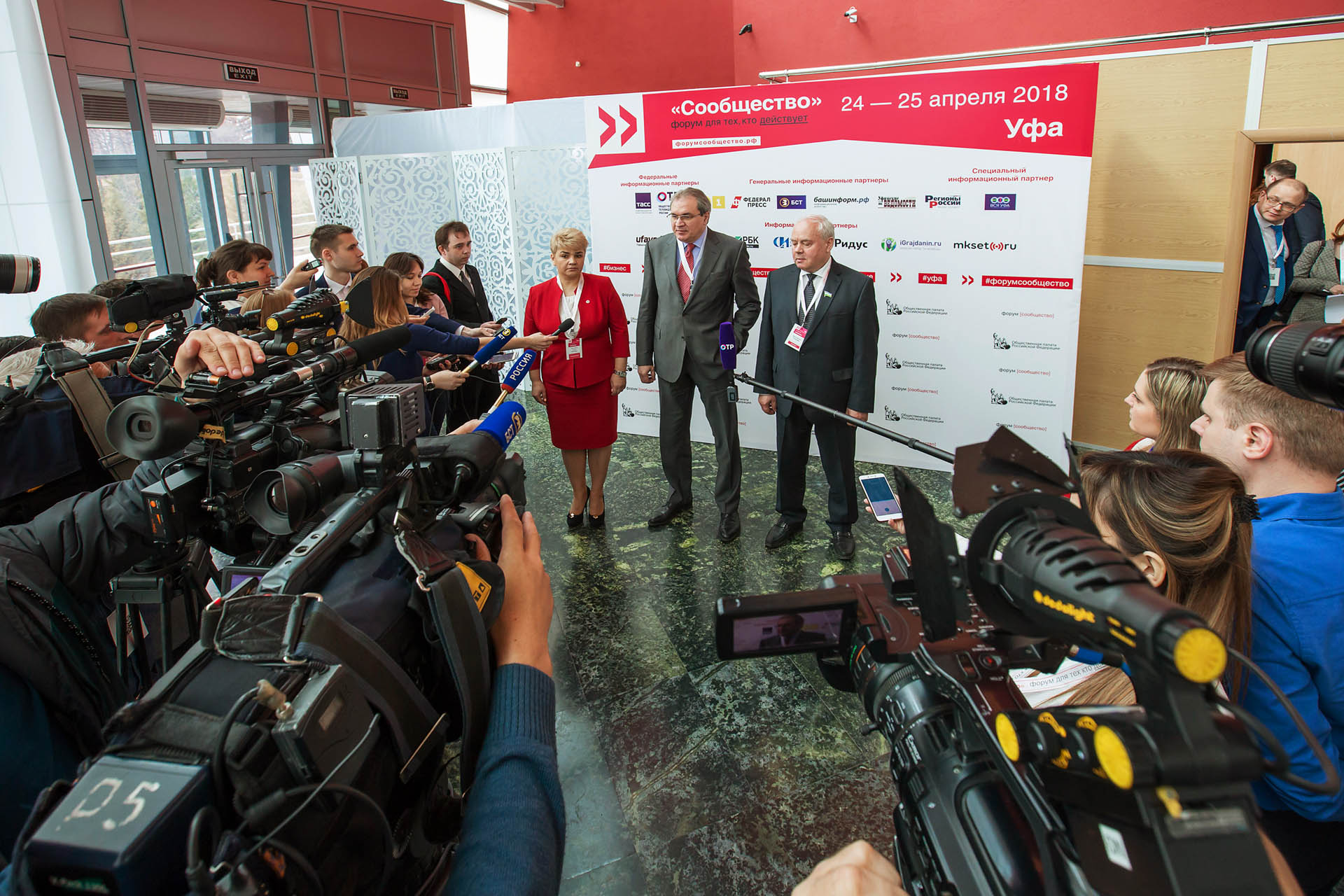
The main problem of interaction between the media and NPO, according to public figures and experts, is that representatives of the nonprofit sector do not always know how to tell interestingly about their activities116 What prevents the NPOs to communicate effectively with the media? The Civic Chamber of the Russian Federation will clarify it during monitoring //Website of the Civic Chamber of the Russian Federation, 17.04.2018: https://www.oprf.ru/press/news/2018/newsitem/44942.. There is a problem in the very approach to presenting information: often NPOs present not specific projects and affairs, but simply their organizations, which is of little interest to the media117 Are NPOs open for communication with the media? Civic Chamber launches a poll//Website of the Civic Chamber of the Russian Federation, 27.04.2018: https://www.oprf.ru/press/news/2018/newsitem/45119..
Since 2018, the Civic Chamber of the Russian Federation has been implementing the project #NPO Region , within which best regional practices are being presented to support non-profit organizations and assist them in entering the social services market. Every region has its sparkle and uniqueness. Tambov demonstrated successful experience in billing services provided by the NPOs. In Yakutia, local governments are trying to include remote districts into active work, and NPOs can register and receive documents on the basis of Multifunctional Center for Provision of State and Municipal Services. In Krasnoyarsk, they began to actively work on the access of NGO to the social services market and introduced this area as a priority project. All the best practices are posted on the Website of the Civic Chamber of the Russian Federation118 Project #NPO Region // Website of the Civic Chamber of the Russian Federation: https://www.oprf.ru/1449/2133/2552/2561/..
The main way to increase public confidence in the activities of NPOs is the transparency and openness of their activities: ideally, anyone should have an opportunity to study the detailed open access public reports on the work of the organization, implemented projects, financial flows. In Russia, the practice of public accounting by the NPO spreads slowly. According to the survey “Informational openness of NPOs in Russia”, in which answers were mainly collected from representatives of small operating NPOs from the regions, about half of organizations prepare annual public reports on their activities. The annual “Point of Reference” contest is intended to stimulate the publication of public reporting by NPOs. In 2018, applications from 307 non-profit organizations from 47 regions of the Russian Federation were received, 252 of which were accepted by the jury119 Moscow has summed up the results of the contest “Point of Reference” // Social Information Agency, 22.11.2018: https://www.asi.org.ru/news/2018/11/22/v-moskve-podveli-itogi-konkursa-tochka-otscheta/..
As noted the Civic Chamber Report for 2017, in most countries with a developed third sector there is a system of grading the NPOs upon the level of public reporting. The access of NPOs to state financing programs, tax and other benefits and preferences implies that the organization provides more detailed information about its activities, including financial flows, in other words, more stringent requirements for transparency. Therefore, the distinction between different categories of NPOs involves the introduction of a more flexible reporting system and reporting standards of NPOs.
According to a survey conducted by the Civic Chamber of the Russian Federation in 2018, the majority of participants in the “Community” Forums (representatives of NPOs, civil society activists) support the introduction of differentiated reporting forms for different types of NPOs.
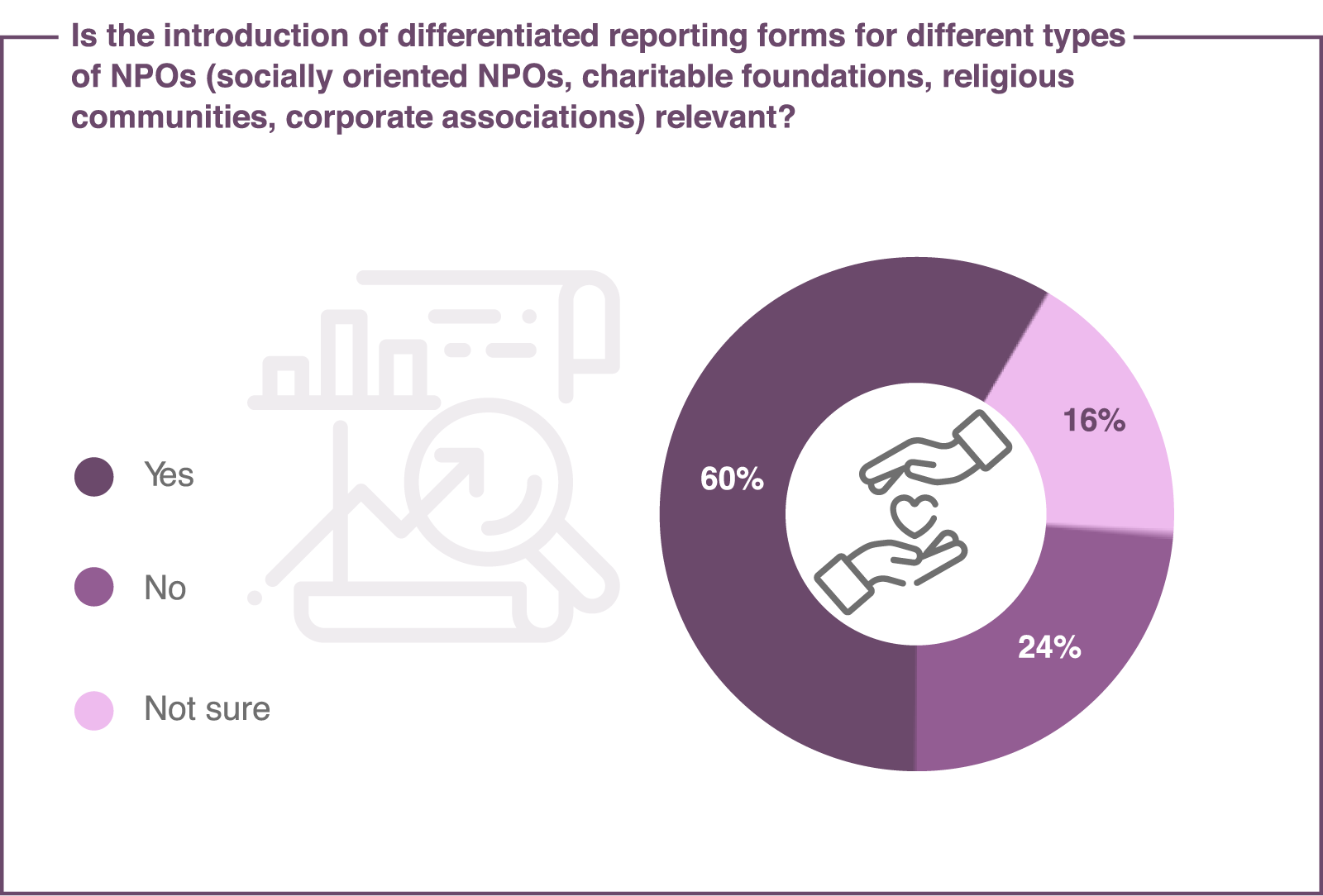
Source: Civic Chamber of the Russian Federation120 Description of the survey, see link 42.
In 2018, experts from the All-Russian Civil Forum, who presented the draft “Standards of information transparency of NPO” addressed this issue121 The Vice Prime Minister will consider the proposals of the United Civil Front on the standard of information transparency for the NPO // Russian Agency of Legal and Judicial Information, 13.06.2018: http://rapsinews.ru/incident_news/20180613/282982361.html.. The proposed standard includes the obligation to disclose relevant information on activities, as well as the sources and amounts of income and expenses of the NPOs PO. Information disclosure includes three levels of openness – basic, advanced and complete, depending on the degree of the organization’s readiness to place information about its activities in the public domain.
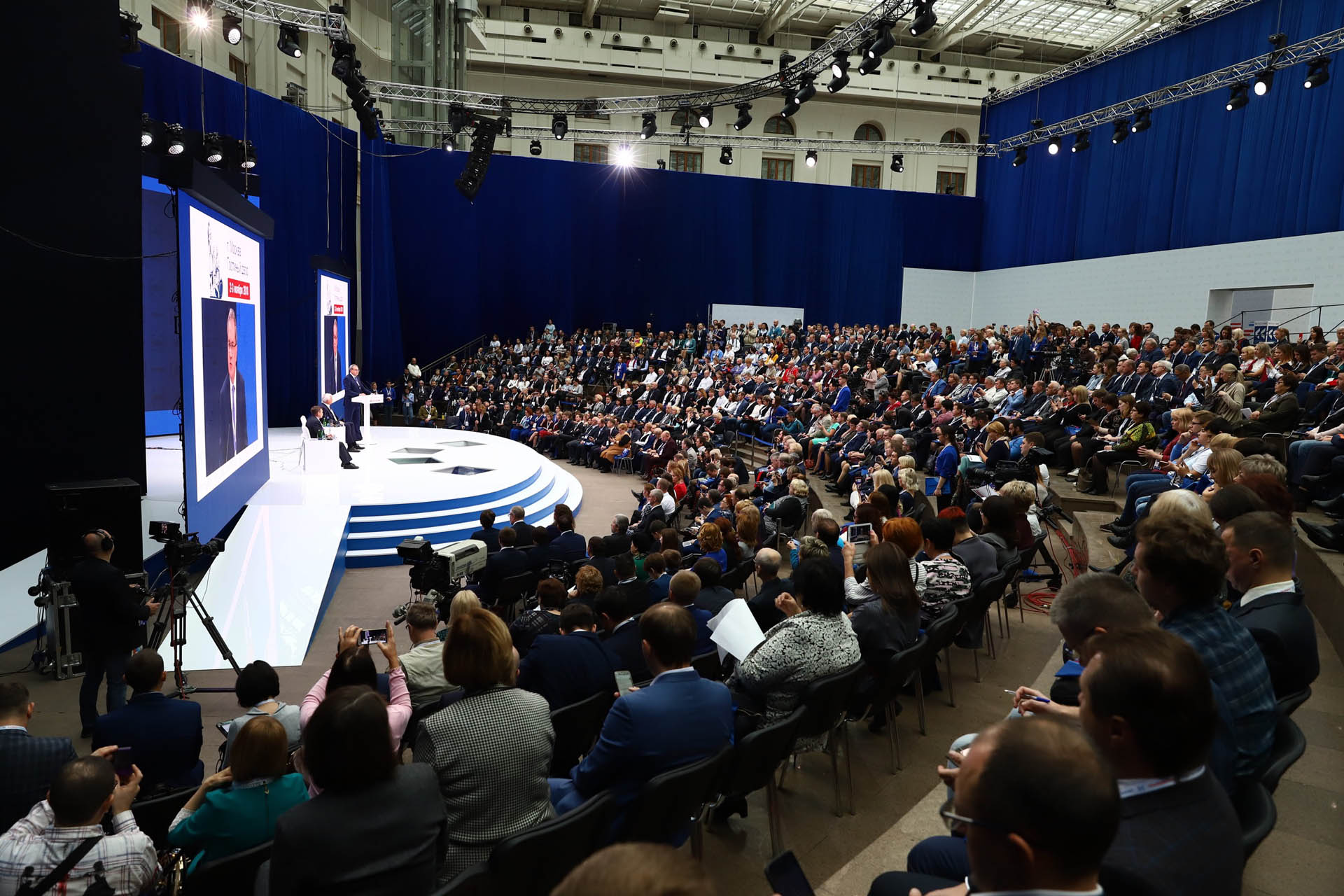
Innovations on the reporting of NPOs, established by the Order of the Ministry of Justice of the Russian Federation of August 16, 2018 No. 170, led to an active public discussion among representatives of the third sector122 The Order of the Ministry of Justice of the Russian Federation dated August 16, 2018 N 170 “On approval of the reporting forms of non-profit organizations”: http://www.consultant.ru/document/cons_doc_LAW_306150/2ff7a8c72de3994f30496a0ccbb1ddafdaddf518/.. The order approves new forms of NPOs, expands the concept of “foreign sources” and establishes the obligation of reporting on the expenditure of funds and property received from foreign organizations and individuals, either from the Russian legal entities and citizens receiving funds from foreign sources.
The sector’s response varied from a proposal to revise / cancel this order to the willingness to accept this innovation, provided the procedure for implementing the Ministry of Justice’s requirement is clarified: how should the NPOs receive information on foreign funding of their counterparties, how the responsibility for the authenticity of information provided to NPOs will be distributed, to whom the new reporting rules will be applied, etc. Of particular concern in the context of reporting NPOs in the professional community was the issue of obtaining reliable information about foreign funding of organizations – counterparties of Russian NPOs, including donor organizations. In the absence of clarifications from the Ministry of Justice regarding the practical implementation of new reporting requirements for NPOs, doubts were expressed as to the feasibility of requirements to include in the reports the information about cash and use of other property received from Russian counterparties with foreign funding sources.
The Civic Chamber closely monitors this situation, consults with the expert community and develops proposals for alleviating the burden of accountability for non-profit and charitable organizations.
2018 was declared the Year of Volunteer in Russia.
Thousands of volunteers took part in the provision of high-level World Championship in Russia. The campaign to recruit volunteers set a new record among the World Championships in the number of applications submitted – about 177 thousand, during the 2014 World Cup in Brazil 152 thousand applications were submitted. In total, more than 17 thousand volunteers of the Russia-2018 Organizing Committee were selected. Applications were submitted from 190 countries around the world, 73%-from Russia. A large part of the volunteers (80%) refers to the age group of 18-25 and the oldest volunteer was 80 years old. 64% of applicants were women. More than 70% of the volunteers were students of educational institutions of higher education123 Thank you, 2018 World Cup volunteers! // RIA Novostihttps://ria.ru/sn_volunteers_sport/20180717/1524693779.html.. From March 1, 2018, volunteers are recruited to work at XXIX World Winter Universiade 2019 in Krasnoyarsk.
From December 1 to December 10, Good People Festival, an annual civil society festival was held in Moscow. The event was organized by the Civic Chamber of the Russian Federation. The aim of the festival was to show the versatility of volunteerism and its impact on the socio-economic and social problems, stress the comprehensive scope of the volunteers and show the results of the Year of Volunteer. This year the Festival was an open platform for all Moscow residents who wanted to learn about volunteering and try oneself in different areas.
The Civic Chamber of the Russian Federation has launched August 1 the All-Russian action “Good Deeds Marathon”, dedicated to Year of Volunteer in Russia. As part of the action, it is planned to collect the most successful volunteer and charitable projects on one platform and replicate them in the regions of Russia in the form of an exciting online quest with the engagement of active citizens from across the country.
All-Russian action “Good Deeds Marathon” is held by the Civic Chamber of the Russian Federation from 2016, with the support of the Federal Agency on Youth Affairs. During this time, its participants included over 110 thousand Russians who made more than 60 thousand good deeds for the benefit of society.

An important event was the adoption of amendments to the Federal Law of August 11, 1995 No. 15-FZ “On Charitable Activities and Charitable Organizations”. The law has received the new name of the Federal Law “On charitable activities and ultroneous (voluntary) services”. The law equated the concepts of “volunteering” and “ultroneous services” and gave them a clear definition. The law introduces the concept of volunteer (ultroneous) organization and organization – organizer of volunteer (ultroneous) activities, defines the powers of federal and regional government bodies to support volunteer (ultroneous) activities. For the first time, the basic conditions for engaging in voluntary activities are clearly defined at the legislative level. It is envisaged that volunteers can carry out their activities both individually and as part of organizations, the legal conditions for volunteers to carry out their activities, which can be enshrined in a civil law agreement between a volunteer and a beneficiary or a legal entity, are defined.
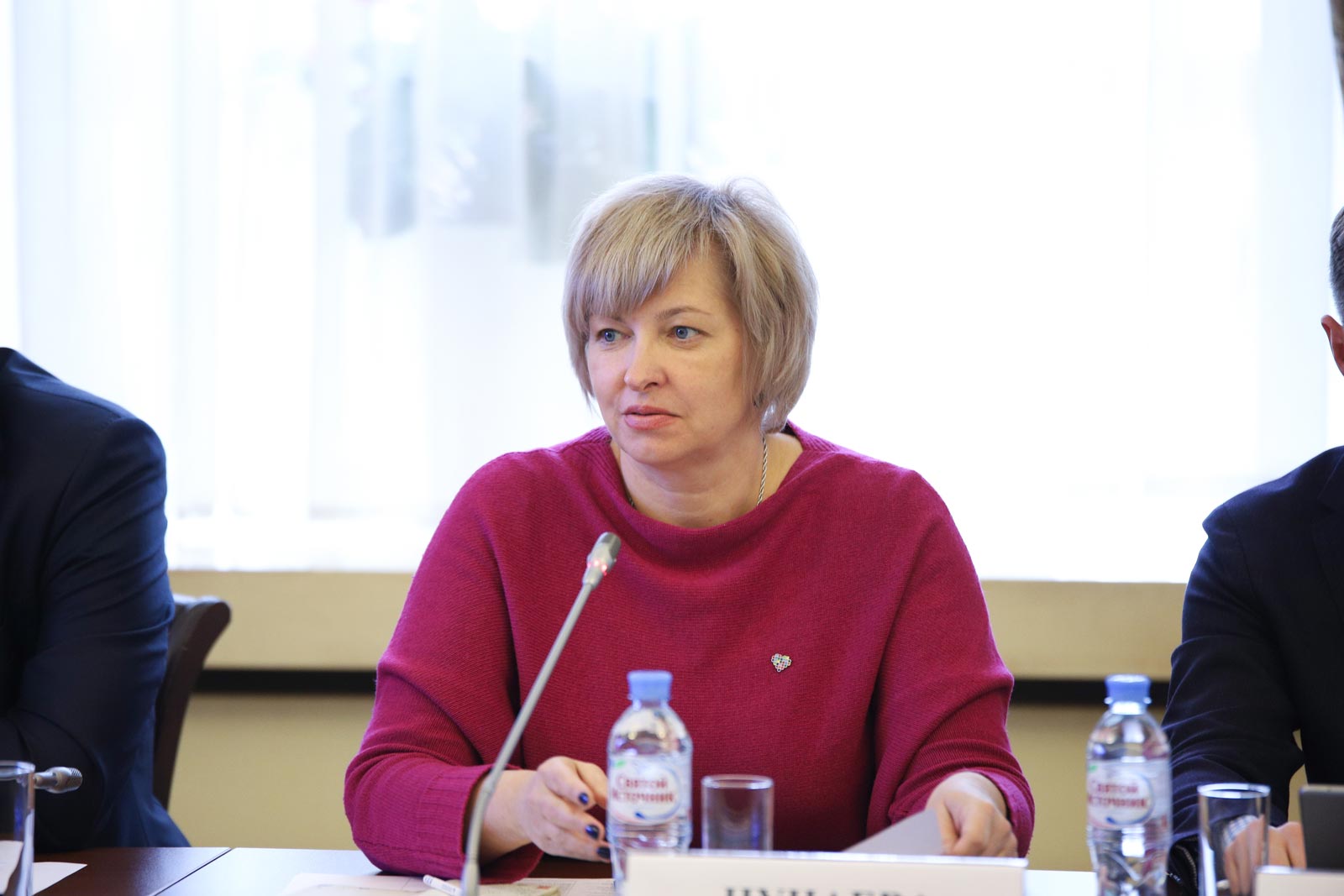
The Civic Chamber of the Russian Federation took part in drafting of the law, held in 2017-2018 public hearings in 63 federal entities. However, the Government of the Russian Federation has not yet developed and adopted by-laws regulating the relationship of volunteering organizers with subordinate state institutions. Therefore, the law is not yet fully effective.
In 2017, the Agency for Strategic Initiatives developed the Volunteering Support Standard, which includes nine steps in key areas: involvement of all interested regional executive authorities in support of volunteering, development of a transparent procedure for interaction between the government authorities and volunteers and organizations, provision of infrastructure support measures, training volunteers and officials, encouraging volunteers, financial and information support for volunteers126 The Ministry of Economic Development of Russia has prepared a Report on the development of volunteering (ultroneous) in the Russian Federation // Portal of the unified automated information system to support socially oriented non-profit organizations of the Ministry of Economic Development of the Russian Federation, 04.09.2018: http://nko.economy.gov.ru/PortalNews/Read/4436..
The most significant barrier hindering the entry into the volunteer movement is the underdevelopment of infrastructure — various volunteer centers willing to work with citizens, as well as inaccessibility of information about ongoing social events and projects. The creation of Russian volunteer resource centers has started just recently and they are in the process of finding their own development strategies: such centers are being created both by socially oriented non-profit organizations and with state assistance. In 2014, the Association of Volunteer Centers was formed127 Association of volunteer centers: авц.рф., uniting the major regional centers of volunteering. During the first half of 2018, a roadmap of the Federal Program “Resource Centers” was developed and approved. The Directorate of the Year of Volunteer jointly with the Association of Volunteer Centers is working on the mass formation of a network of volunteer centers in educational organizations (in 2018 more than 6.5 thousand school teams and 350 volunteer centers in universities opened128 According to “data provided to the Civic Chamber of the Russian Federation, the Association of Volunteer Centers and the Russian School Movement.), regional volunteering resource centers (centers opened in more than 30 subject regions in 2018, 47 subject regions are in the process of forming their centers129 According to “data provided to the Civic Chamber of the Russian Federation, the Association of Volunteer Centers.), as well as centers of silver volunteering for the elderly (30 regional centers opened in 350130 According to “data provided to the Civic Chamber of the Russian Federation, the Association of Volunteer Centers.). The target models were developed based on the best practices for each type of infrastructure with engagement of the Civic Chamber Coordination Council for the Development of Volunteering. Over 450 thousand volunteers were registered on the Volunteers of Russia portal, and the number of vacancies for personal fulfillment through volunteering exceeded 35 thousand. (20 thousand events and 15 thousand projects)131 According to data provided to the Civic Chamber of the Russian Federation by the portal добровольцыроссии.рф.. Based on the analysis of domestic and foreign experience, the Federal Agency on Youth Affairs created a model of a resource center to support volunteering and prepared methodological manuals “A Model for Developing Resource Centers to Support Volunteering in the Subject Regions of the Russian Federation” and “Best Practices for Organizing Resource Center Activities”.
The largest volunteer resource center in Russia is Mosvolonter, established in 2014 as the main element of the volunteering support infrastructure in Moscow, it supports over 490 NPOs and accompanies the activities of more than 56 thousand volunteers132 According to “data provided to the Civic Chamber of the Russian Federation, the resource center “Mosvolonter”.. The leaders in the organization of the volunteer movement are also the Krasnoyarsk Territory, the Republic of Bashkortostan, and Kaliningrad Region.
Upon the initiative of the Volunteer Search Team “Liza Alert” and the support of the Agency for Strategic Initiatives, the Unified Search Center for Missing People was created.
A significant step forward was the massive opening of volunteering (ultroneous) centers in educational institutions. The program, which was initiated by the Association of Volunteer Centers, is aimed at promoting the volunteer movement among schoolchildren. As part of a joint project of the Association of Volunteer Centers and the Russian Schoolchildren Movement “League of School Volunteer Units”, 6.5 thousand teams of young volunteers have been created in schools throughout the country133 According to “data provided to the Civic Chamber of the Russian Federation, the Russian School Movement.. Until the end of 2018, it was planned to create volunteer centers at 350 universities, and by 2024 such centers should appear in 60% of all educational organizations – schools, colleges and universities.
Another barrier in the development of volunteering in Russia is the insufficiency of educational programs, as well as the lack of competencies in working with them among representatives of state institutions that attract volunteers. To solve this problem, the “Learn.PRO” educational platform with online courses for civil servants, public sector employees, volunteer organizers and volunteers themselves was launched. In the fourth quarter of 2018, over 25 thousand users completed the training134 According to the data provided to the Civic Chamber of the Russian Federation by the ЕИС “Добровольцы России”, добровольцыроссии.рф.. An educational standard was developed for volunteers, regional schools of volunteers were opened in 82 subject regions of the Federation.
Mentoring is an important area of voluntary activity. As a rule, it means attracting retirement professionals as specialized teachers for young professionals. This issue has been addressed in detail in the “Community” Forums in the regions of Russia. Participants came to the conclusion that further development of mentoring will contribute to State support and coordinate the efforts of State and civil society. It was proposed to provide state support for the development of mentoring within the framework of federal priority projects aimed at increasing labor productivity, to develop regulatory legal acts on the development of mentoring in various fields, to recommend to state authorities of the subject regions of the Russian Federation to provide grants to NPOs running social projects for the development of mentoring and several other measures.
In his annual Address, the President of the Russian Federation in 2018 noted that he considered the development of the mentoring movement a significant task, namely the All-Russian Generation Relay project supported by the Civic Chamber of the Russian Federation was aimed at reviving mentoring and actively involving the country’s veterans community in this activity. In 2018, the project held 13 training seminars in all federal districts of the Russian Federation, more than 2600 volunteers of the All-Russian movement “Volunteers of Victory”. The project provides an opportunity for the veteran community to participate in the formation of morality, patriotic feelings, and the transfer of experience to modern Russian youth. According to a study conducted in July 2018, 95% of veterans noted the need to continue the project further. 52.5% of veterans noted improvements in their activities, thanks to interaction with young people in the framework of the project. 72% of veterans said that the project contributes to the efficiency of work in the veteran organizations themselves.
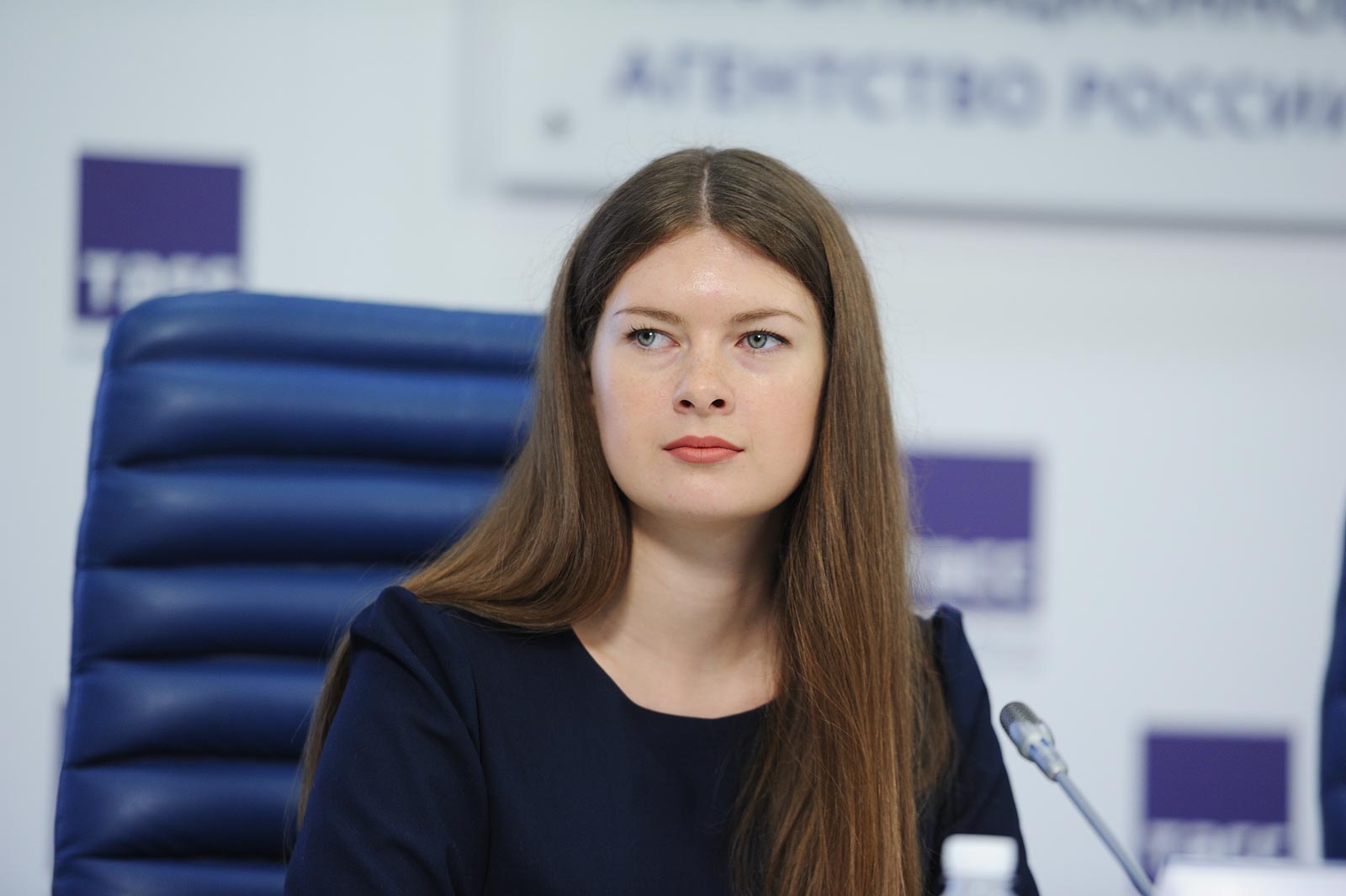
A vivid manifestation of patriotism is the work of volunteer firefighters. Today the All-Russian Public Organization “All-Russian Voluntary Fire Society” has more than 290 thousand volunteers in its ranks. More than 15 thousand settlements with the population of about 6 million people are under the protection of the Society’s fire volunteers135 According to “data provided to the Civic Chamber of the Russian Federation by the All-Russian Voluntary Fire Organization.. In 2018, the voluntary firefighters of the All-Russian Voluntary Fire Organization were involved in extinguishing natural fires in the territory of the Ural and Siberian federal districts. With the engagement of voluntary firefighters, the All-Russian Voluntary Fire Organization extinguished more than 600 wildfires with about 500 people and more than 100 units of equipment involved.
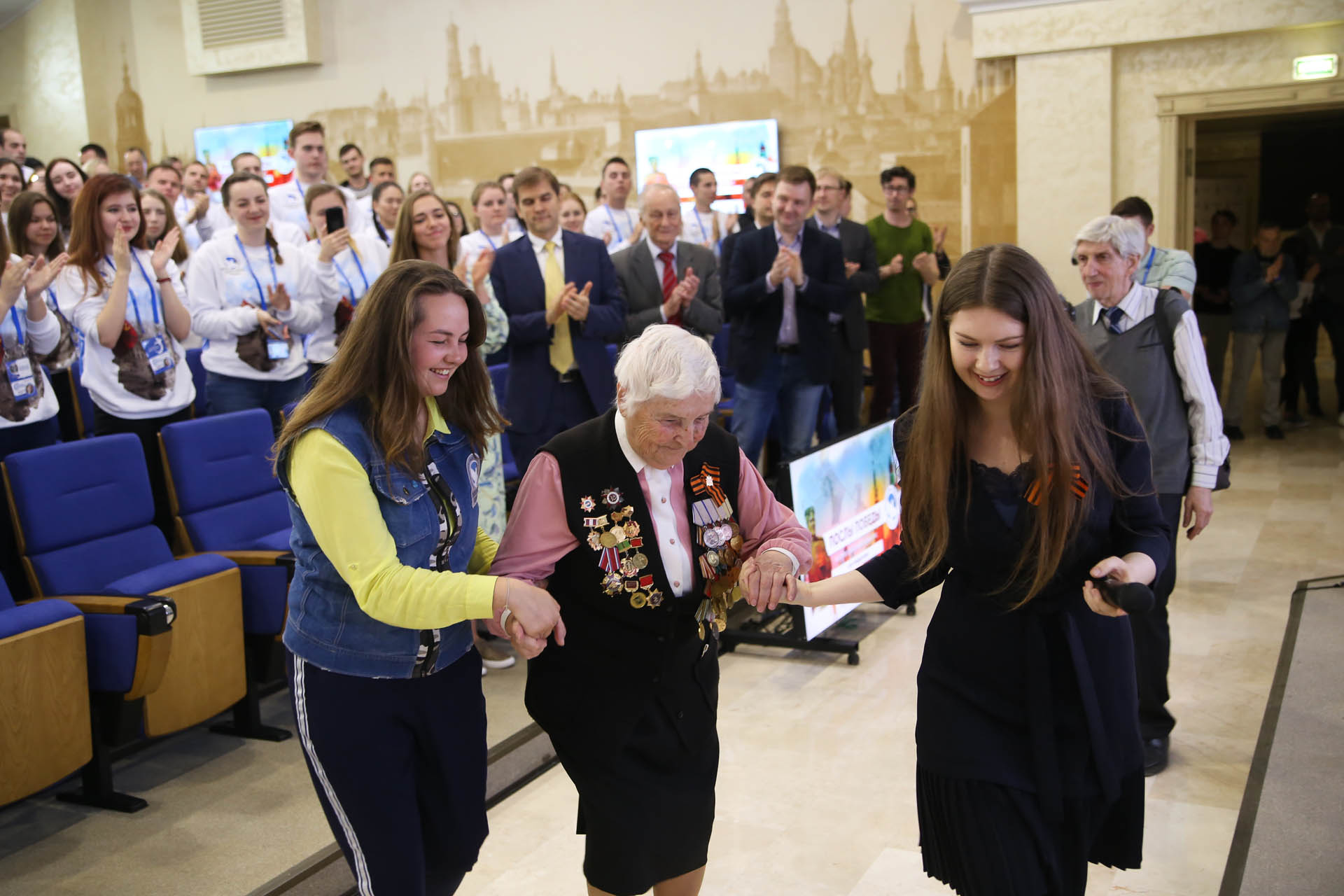
The responsible and significant area of volunteering – volunteering in emergency situations continues its development. The All-Russian Public Organization Russian Union of Rescuers136 Site of the All-Russian public organization Russian Union of Rescuers: http://www.ruor.org/about/, systematically interacting with the Russian Ministry of Emergency Situations and the executive authorities of the subject regions of the Federation, carries out activities in the field of fire safety, search and rescue, provides assistance to victims of natural disasters, other disasters and social conflicts, leads active work on the preparation of various segments of the population of the rules and skills of first aid to victims of emergency situations, and promotes the ideas of volunteering, humanism and charity. The organization has more than 24 thousand voluntary rescuers137 According to data provided to the Civic Chamber of the Russian Federation by the Russian Union of Rescuers.. Also within the framework of the organization, the Russian public specialized rescue squad is functioning, bringing together over 500 highly skilled volunteers of rescuers from among the sportsmen-climbers, speleologists, mountain tourists and dog trainers. Almost daily, the squad members participate in rescue, educational and training activities throughout the country.
The organization does a lot of work among children and young people: there are more than 200 student community rescue teams, more than 240 thousand children and adolescents are involved in a complex of activities aimed at developing a safety culture and working out behavioral skills in various emergency situations. Every year, the Russian Union of Rescuers, with the support of the Council of the Federation and relevant ministries, implements the civil-patriotic project “Heroic Children”, within which Russia searches for children and teenagers who have committed heroic acts to save human life. The 20 most distinguished children on the eve of the National Unity Day take part in the awards ceremony at the Federation Council. A broad coverage of the actions of children-heroes in the media serves as an example and forms an active life position and a desire to help their neighbor in a wide range of children and adolescents.
Volunteering in the area of preserving historical memory continues to develop. Activists of the Russian Public Movement “Search Movement of Russia” in 2018 conducted 1,525 expeditions to former battlefields in 37 regions of the country. The remains of the 16,700 fallen defenders of the Fatherland were found and solemnly buried in the earth, 625 names of heroes were established. The search engines opened public reception rooms, The Fate of a Soldier, in which volunteers helped the descendants of war participants, to find out where their ancestor had perished, to establish their fate using new archival data.
The problem of perpetuating the memory of fallen heroes on military memorials remains urgent. Thus, the searchers of Orenburg managed to establish more than 1000 soldiers who died in hospitals and were buried in Orenburg, whose names were absent not only on the military memorial, but even in the burial passport. In Vologda Region, the searchers have identified the names of 225 soldiers buried in the region and missing in documents and on memorial plates. This means that the relatives of the heroes do not have information on the place of repose and may not visit this place. As part of a broad public discussion of this issue initiated by the Civic Chamber, it was decided to organize a systematic public monitoring of this problem by volunteer searchers, petitions were sent to the authorities.
Hundreds of thousands of volunteers of the Victory Volunteers All-Russian movement, with the support of the Civic Chamber of the Russian Federation, helped to organize key Victory Day events, including Victory Parades and the Immortal Regiment. Preparations began for the 75-th anniversary of Victory in the Great Patriotic War. The Victory Volunteers have an idea to create the International Volunteer Team for the 75th anniversary of Victory in 2020. It was presented at large international youth forums and found a response from young compatriots living abroad.
According to sociologists, in Russia about 22% of families keep a family archive and study family history, while only 5% do it systematically. Only 9% of respondents were able to identify the names of all eight great-grandparents, and 13% could not name a single name138 Every fifth family in Russia keeps a family archive // Romir Research Holding, 07.12.2017: https://romir.ru/press/agentstvo-moskva---romir-kajdaya-pyataya-semya-v-rossii-vedet-semeynyy-arhiv.. In the Year of the Volunteer and the 100th Anniversary of the Archive Service, the Civic Chamber of the Russian Federation together with the Victory Volunteers All-Russian Public Movement and the Russian State Humanitarian University Historical-Archival Institute developed My History All-Russian project. The main idea of the project is to provide volunteer assistance to residents in the study of family archives and compiling a family tree. In October, on the basis of the Civic Chamber of the Russian Federation the first volunteers training session was held. In the spring of 2019 year volunteers will begin actively advising citizens on the family tree.
Most of the world’s largest corporations implement long-term corporate volunteering programs, a global corporate volunteering council has been created with their engagement. Since 2014, the National Council for Corporate Volunteering has been operating in Russia139 The Council was established on December 15, 2014 at the initiative of the Association of Managers following the results of the third Moscow International Forum “Corporate Volunteering”, which brings together representatives of the most active domestic and international companies. (Source: National Council on corporate volunteering: http://nccv.ru/)., which brings together more than 40 companies, whose projects involve more than 40 thousand corporate volunteers. The National Council was created to consolidate forces and resources in the development of corporate volunteerism in Russia and represents business community association managers, developing corporate volunteering in the companies.
In 2018, the Russian delegation took part in the 25th IAVE International Volunteering Conference. Within the framework of the conference, co-organized by Russia, our delegation organized over 60 events. According to the head of the UN Volunteers Program, Olivier Adam, “Russia is the leader in organizing the volunteer movement”140 UN Representative: Russia is the leader in organizing volunteer movement // RIA Novosti, 27.07.2018: https://ria.ru/sn_volunteers/20180727/1525438295.html..
In August 2018, at the All-Russian Youth Educational Forum “Tavrida”, leaders of volunteer projects in the field of culture united in a social movement “Volunteers of Culture”, the main goal of which is to develop the social activity of citizens in art, to support young people’s interest in the activities of libraries, theaters, museums and other cultural institutions. Over 201 thousand projects in the field of cultural volunteering were received at the All-Russian Volunteer Russia Contest in 2018, which testifies to the great interest of young people and citizens in this topic.
In 2018, the All-Russian “Read-the-Country!” campaign took place. More than 6 thousand participants, 500 volunteers took part in it, and 152 libraries from 47 regions of Russia supported the event141 According to “data provided to the Civic Chamber of the Russian Federation, the Association of Volunteer Centers and the Russian School Movement..
The development of digital technology has not bypassed the scope of volunteering. The development of common information system “Volunteers of Russia” allows using modern technologies and simplifies the search for volunteers, beneficiaries and opportunities for self-actualization as a volunteer. As of November 2018, more than 400,000 volunteers, 12,000 organizations, 20,000 events, and 15,000 projects were registered.
Among the priority areas of volunteer assistance, Russians name helping seriously ill children and adults, helping orphans, families in difficult life situations, helping older people, retirees and, finally, organizing children’s leisure, additional education, and developing competencies. The real areas of volunteer activity of Russians are slightly different. According to data of the All-Russian Public Opinion Research Center in early 2018, the most common form of volunteer practice was engagement in landscaping (72% of Russians report about the experience of this kind of activity), money transfer to the needy (51%), assistance in collecting donations (47%). 28% of respondents declare assistance to socially vulnerable groups using their professional knowledge and skills, 22% of Russians report participating in charity events. Less common is the “practice of personal communication with representatives of socially vulnerable groups” (18%)142 Volunteering in Russia: Today and Tomorrow// The All-Russian Public Opinion Research Center , 03.04.2018: https://wciom.ru/index.php?id=236&uid=9020..
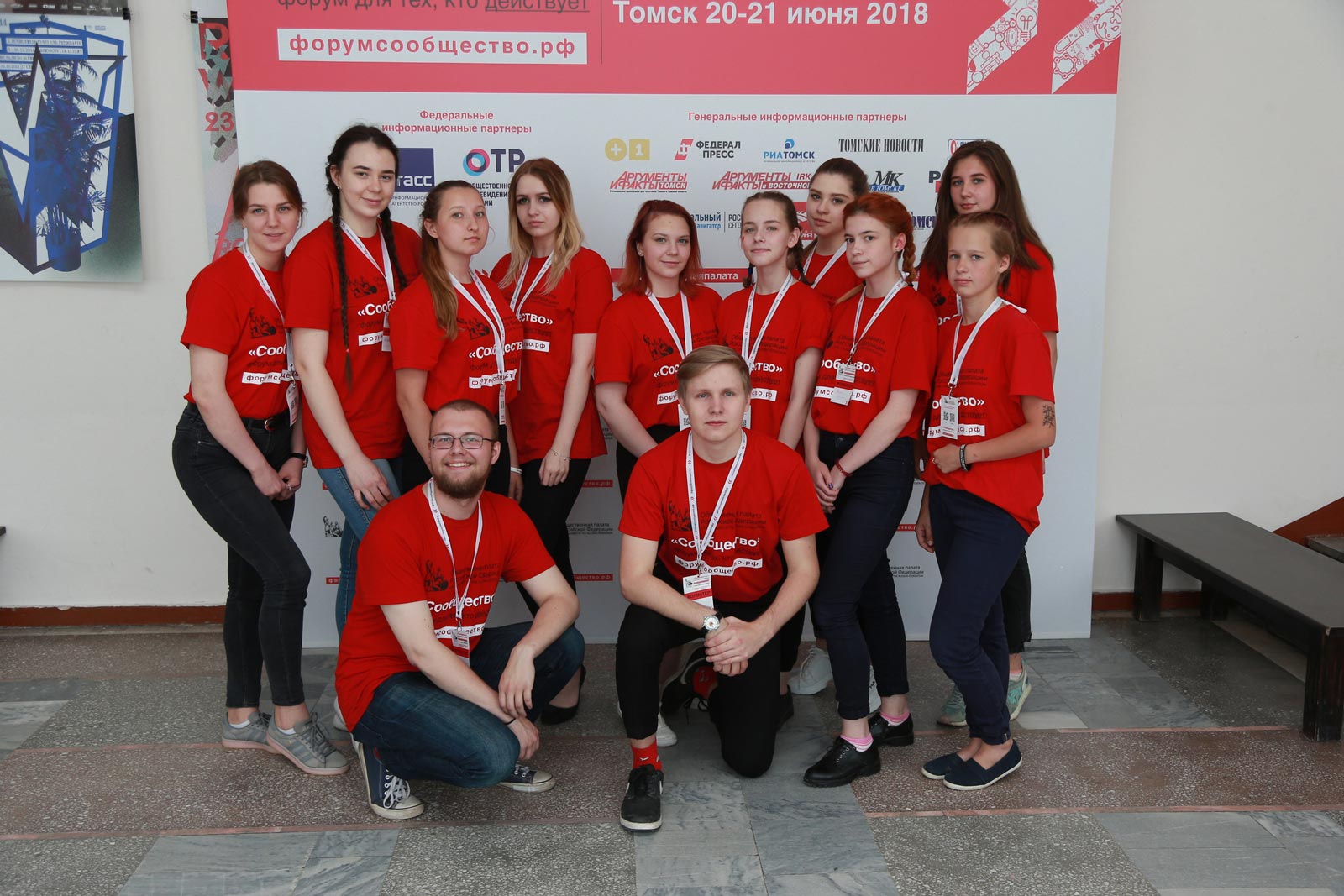
In 2018, the seventh Volunteers for Children campaign was organized by the Foundation for the Support of Children in Difficult Life Situations, the Civic Chamber of the Russian Federation and other organizations. 80 regions in the period from April 20 to September 15, 2018 carried out activities in their regions aimed at active involvement of citizens of all ages in volunteering to support children and families with children. 8.25 million people took part in the events of the action, and assistance was provided to more than 2 million children and families with children in difficult life situations. During the action 170 million rubles were raised143 525 600 minutes of good // Support Fund for Children in Difficult Life Situations, 04.12.2018: http://fond-detyam.ru/press-sluzhba/novosti-fonda/14502/..
In the statistics on volunteering, as the non-profit sector, there is some variation. In the regions, the same volunteers take part in various regional actions held with state support, while in statistics they are counted as a separate “participants in a volunteer action”. At the same time, simultaneously with the “event-driven” volunteer movement, in recent years a lot of informal volunteer initiatives have arisen in our country, which in fact make themselves distant from state support, often they are not even registered. It is clear that as a result, our understanding of the extent of volunteerism is far from complete.
So, according to Federal State Statistics Service, in 2017 in Russia, the average number of volunteers of socially oriented non-profit organizations was 2,377 thousand people. According to Russian Patriotic Center, there were about 5.3 million volunteers in the country in 2017. And according to surveys conducted by the National Research University Higher School of Economics, 38% of Russians over the last month had to perform any unpaid work for other individuals or organizations for at least one hour, and most Russians did it themselves (69%), rather than through existing organizations. Only one third of Russians involved in volunteer work, believes that they can be called a volunteer144 The Ministry of Economic Development of Russia has prepared a Report on the development of volunteering (ultroneous) in the Russian Federation // Portal of the unified automated information system to support socially oriented non-profit organizations of the Ministry of Economic Development of the Russian Federation, 04.09.2018: http://nko.economy.gov.ru/PortalNews/Read/4436..
Due to the difference in approaches to the definition of the concept itself, the method of its measurement, as well as the difference in methods and procedures for collecting data, there is no agreed information on the level of development of volunteering in the country, and it is difficult to accurately present the overall picture of the development of volunteerism in our country. Just as in the case of the non-profit sector, it hinders the development of volunteering and makes it difficult to regulate the quality of the sphere.
In this regard, the Civic Chamber of the Russian Federation considers it appropriate to move from the now accepted calculation of the volume of ultroneous (voluntary) labor in “people” to the generally accepted in world practice of calculating labor in man-hours. We can cite two situations as an example. In one case, 100 volunteers for two days assisted in holding the forum, in the other case 10 volunteers every day throughout the year distributed free food to the homeless. Meanwhile, they would be taken into account in the statistics as “110 volunteers” which is not justified. It also makes sense to move from counting volunteer labor in the whole country to accounting of volunteer labor by types of activities that vary greatly. One thing is to participate in major sporting events, receiving a lot of positive impressions, and another one is to work as a volunteer in the hospice facing human grief every day.
It is reasonable to move from counting the volume of volunteer labor “in general” to counting the volunteer labor in terms of the required level of qualification and the cost of the product (or service) created. Volunteering includes, among other things, highly skilled labor, for example, programmers creating sophisticated free software for access of poor people or charitable organizations to high-tech products.
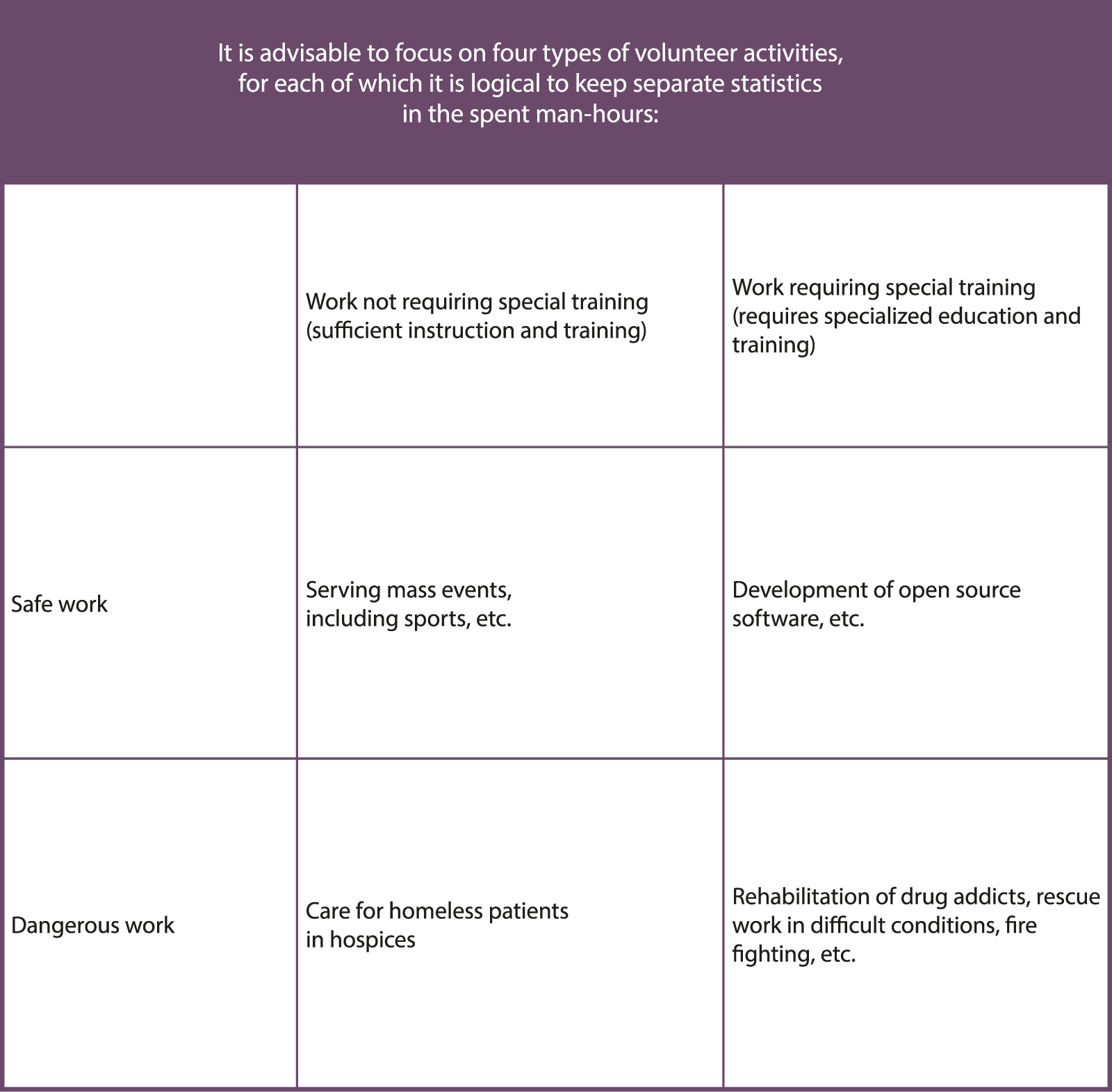
The event that summed up the Year of Volunteer was the contest “Volunteer of Russia”145 All-Russian contest “Volunteer of Russia – 2018” – driver of the Volunteer Year // Unified Information System “Volunteers of Russia”: https://xn--90acesaqsbbbreoa5e3dp.xn--p1ai/contests/2018/dobrovolec.. This year the contest was launched in a new format –12 updated nominations appeared, the Acceleration program was created – a three-month program for the development and training of the initiators of the most successful projects. The contest becomes a meaningful social lift for volunteers. In 2018, the contest received a new scope – 15,839 applications were filed (in 2017, about 1.6 thousand applications were filed). An important event of the year was the All-Russian contest to support the best regional volunteer practices “Region of Good Deeds”, organized by the Federal Agency on Youth Affairs together with Federal State Budgetary Institution “Russian Patriotic Center”. As part of the contest, in 2018, 200 million rubles was allocated for the implementation of regional volunteering support programs, from 2019 to 2024, funds were allocated for these purposes in the amount of 1 billion 450 million rubles. For the entire history of the volunteer movement, for the first time, the state allocated funds from the federal budget as subsidies to subject regions for strengthening infrastructure, implementing educational programs, etc.
The charity sector in 2018 gave mixed signals. On the one hand, there were publications about the rapid development of the sector – about an increase in the number of charitable organizations, movements, actions, about the growth of donations. On the other hand, many foundations complain of difficult financial situation and talk about the threat of closure146 In Overdrive// So It Goes, 01. 10. 2018: https://takiedela.ru/2018/10/na-predele-vozmozhnostey/..
In addition, public opinion polls record the accumulated information fatigue from charity events. So, 60% of Muscovites replied that do not want to receive messages about charitable events and activities147 Poll: 60% of Muscovites do not want to receive e-mail messages about promotions and events/charity/Social Information Agency, h 15.10.2018: https://www.asi.org.ru/news/2018/10/15/opros-blagotvoritelnost-sotsialnaya-aktivnost-moskvichej/..
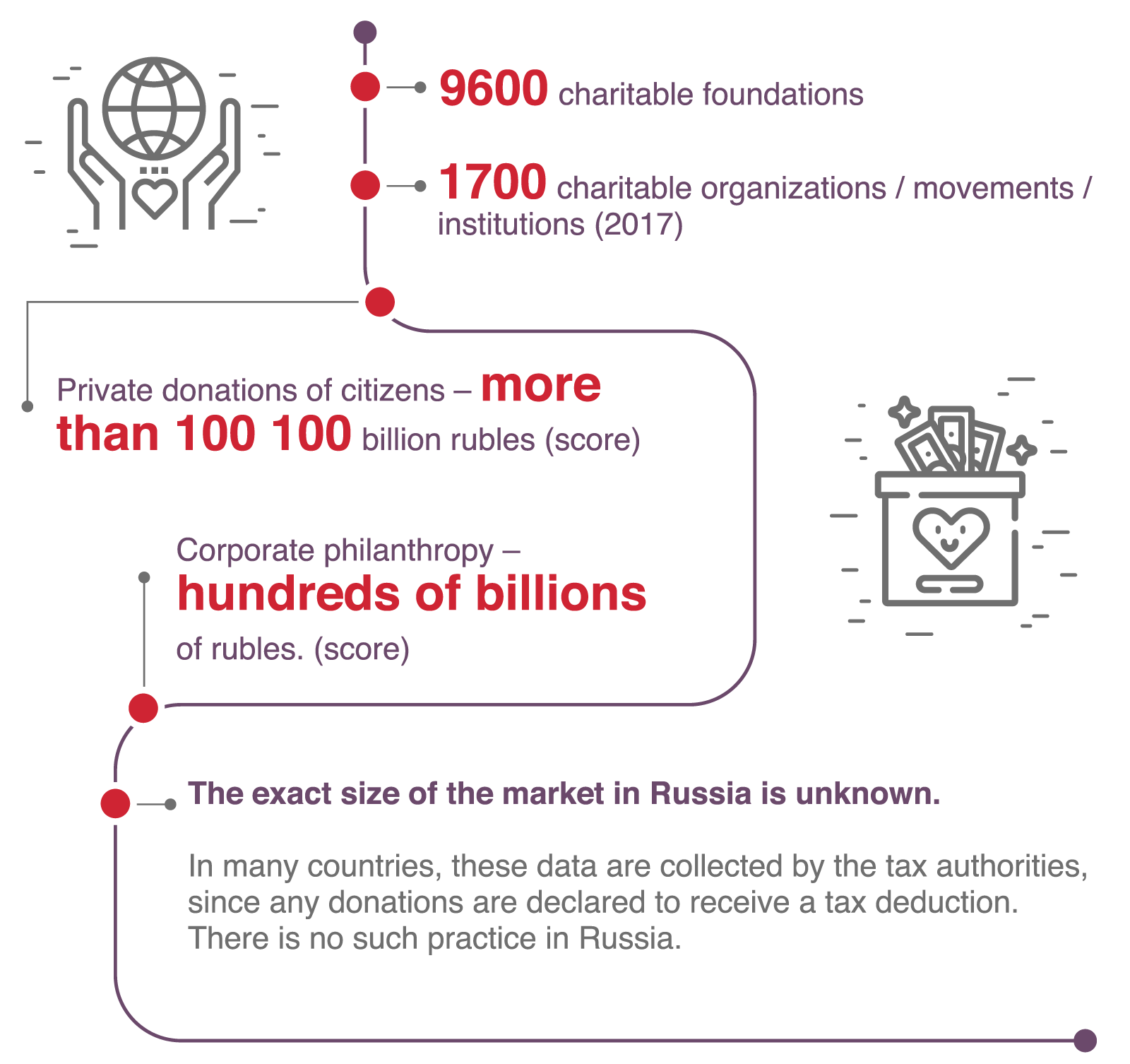 148 We do not become richer, but become kinder//business magazine Profile, 06.03.201: http://www.profile.ru/obsch/item/125159-my-ne-stali-bogache-no-stali-dobree. 149 Charitable budgets don’t grow//financial newspaper, 02.01.2018: https://fingazeta.ru/opinion/interview/446752/. 150 Charitable budgets don’t grow//financial newspaper, 02.01.2018: https://fingazeta.ru/opinion/interview/446752/.
148 We do not become richer, but become kinder//business magazine Profile, 06.03.201: http://www.profile.ru/obsch/item/125159-my-ne-stali-bogache-no-stali-dobree. 149 Charitable budgets don’t grow//financial newspaper, 02.01.2018: https://fingazeta.ru/opinion/interview/446752/. 150 Charitable budgets don’t grow//financial newspaper, 02.01.2018: https://fingazeta.ru/opinion/interview/446752/. 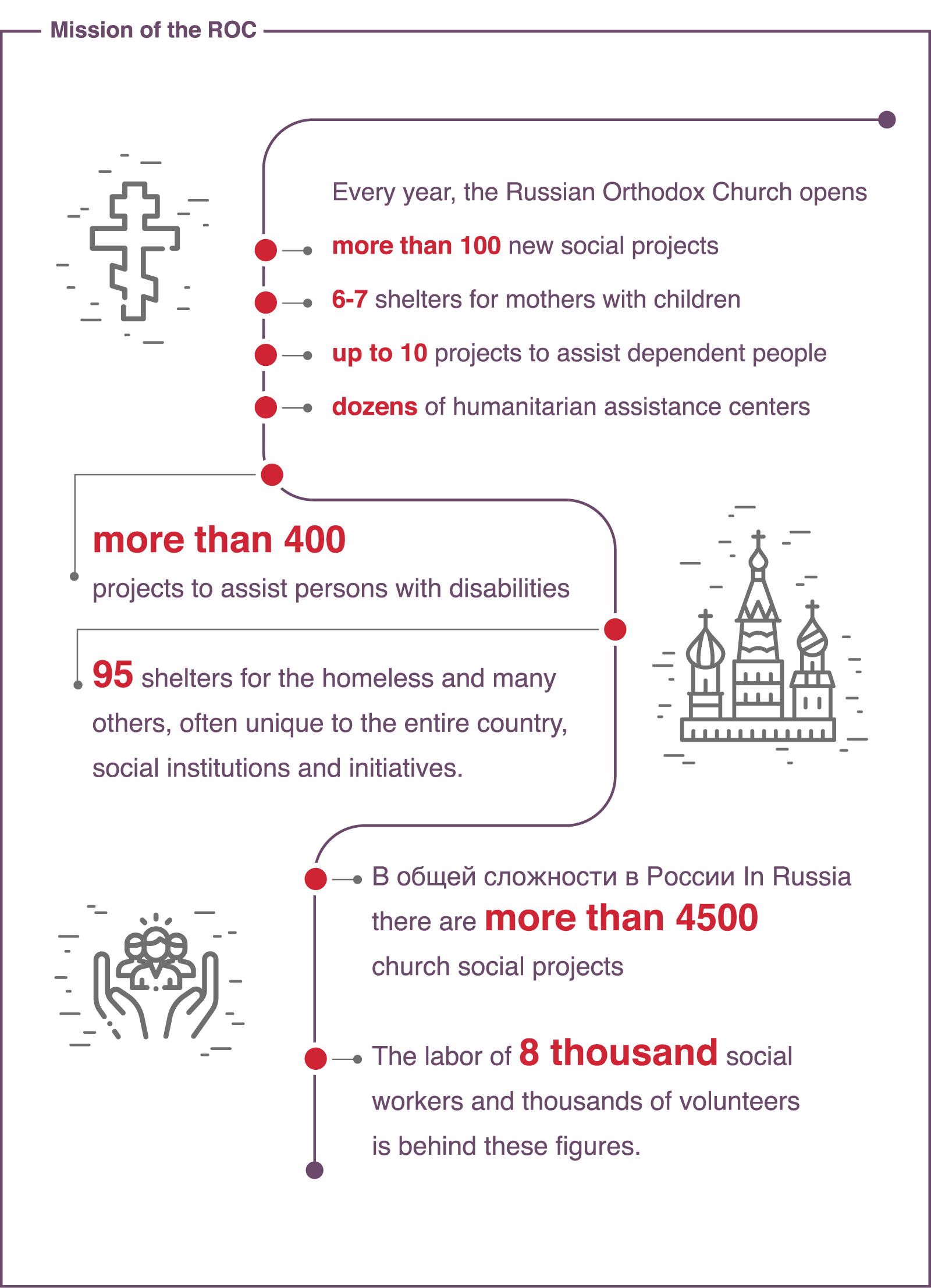 151 Does the Church help people? Page of the Synodal Department for Charity: https://www.facebook.com/diaconia.ru/videos/545726422515736/.
151 Does the Church help people? Page of the Synodal Department for Charity: https://www.facebook.com/diaconia.ru/videos/545726422515736/. In general, for Russians, an episodic type of charitable behavior remains characteristic – this is confirmed by numerous polls of various years152 For example, see. Charity and Help//Levada Center, 14.08.2017: https://www.levada.ru/2017/08/14/blagotvoritelnost-i-pomoshh/; Rating of private charity: regions and charity are the leaders //journal “Philanthropist”, 24.10.2014: http://philanthropy.ru/analysis/2014/10/24/18456/..
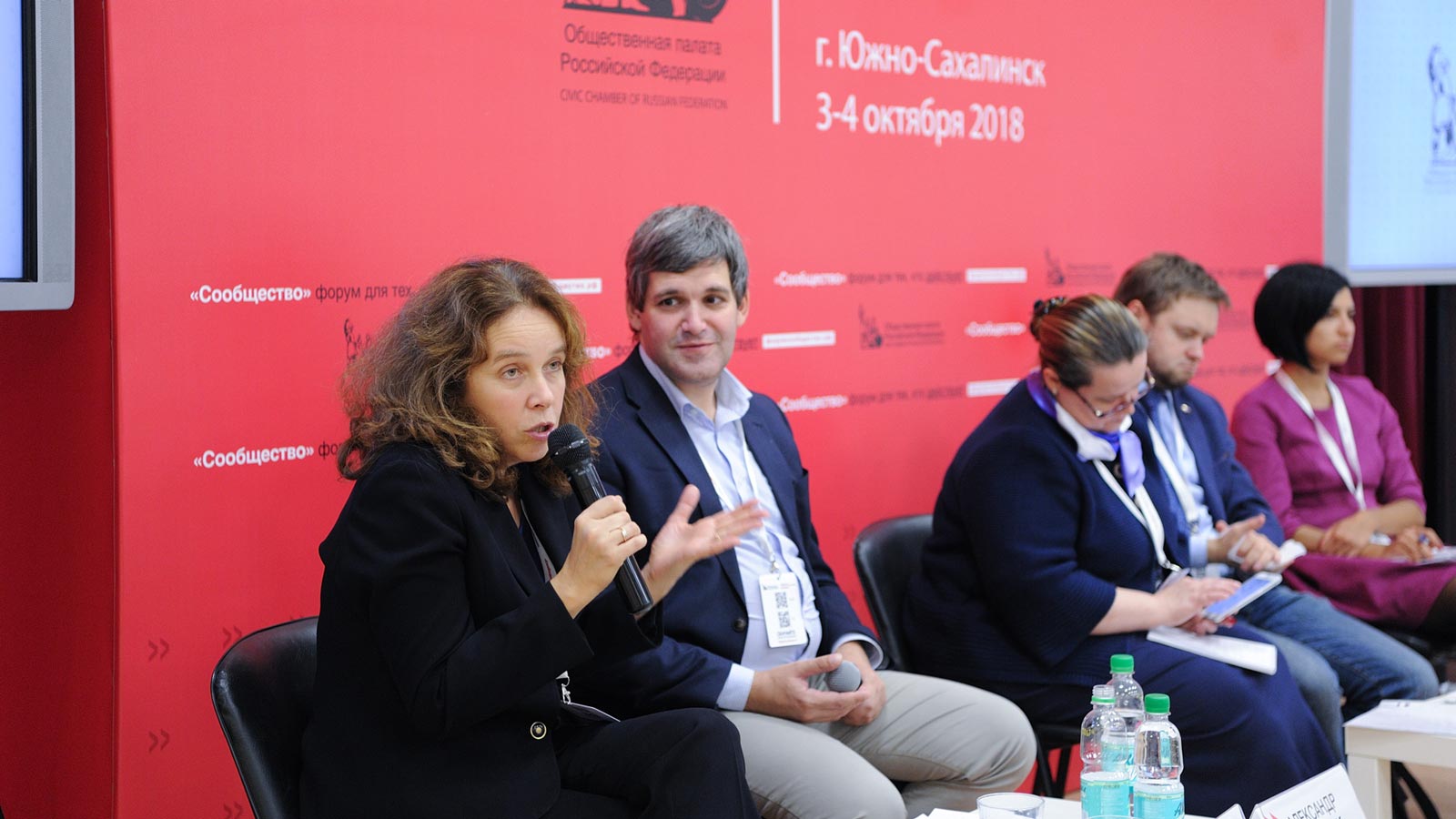
Among the trends of the “external” environment of philanthropy (the behavior of donors – the public and business), there is a noticeable decline in the population’s willingness to donate money – the share of new regular payments by subscription or “auto payments” decreases and, in general, the personal budget for charity decreases. The professional community of the charitable sector today prefers to move on to project activities and gradually refuses from targeted assistance, is ready to raise important social problems and offer solutions to the state, is ready to unite to solve acute problems.
According to a poll by the Civic Chamber of the Russian Federation, 53.7% of respondents occasionally give alms, transfer money through SMS, transfer things or products to the needy. Also, 24.2% of respondents occasionally donate for the construction of a temple, an animal shelter, the restoration of an art monument or a valuable natural site.
16% of respondents are not engaged in charity.
32% of respondents are engaged in various charitable activities on a regular basis:
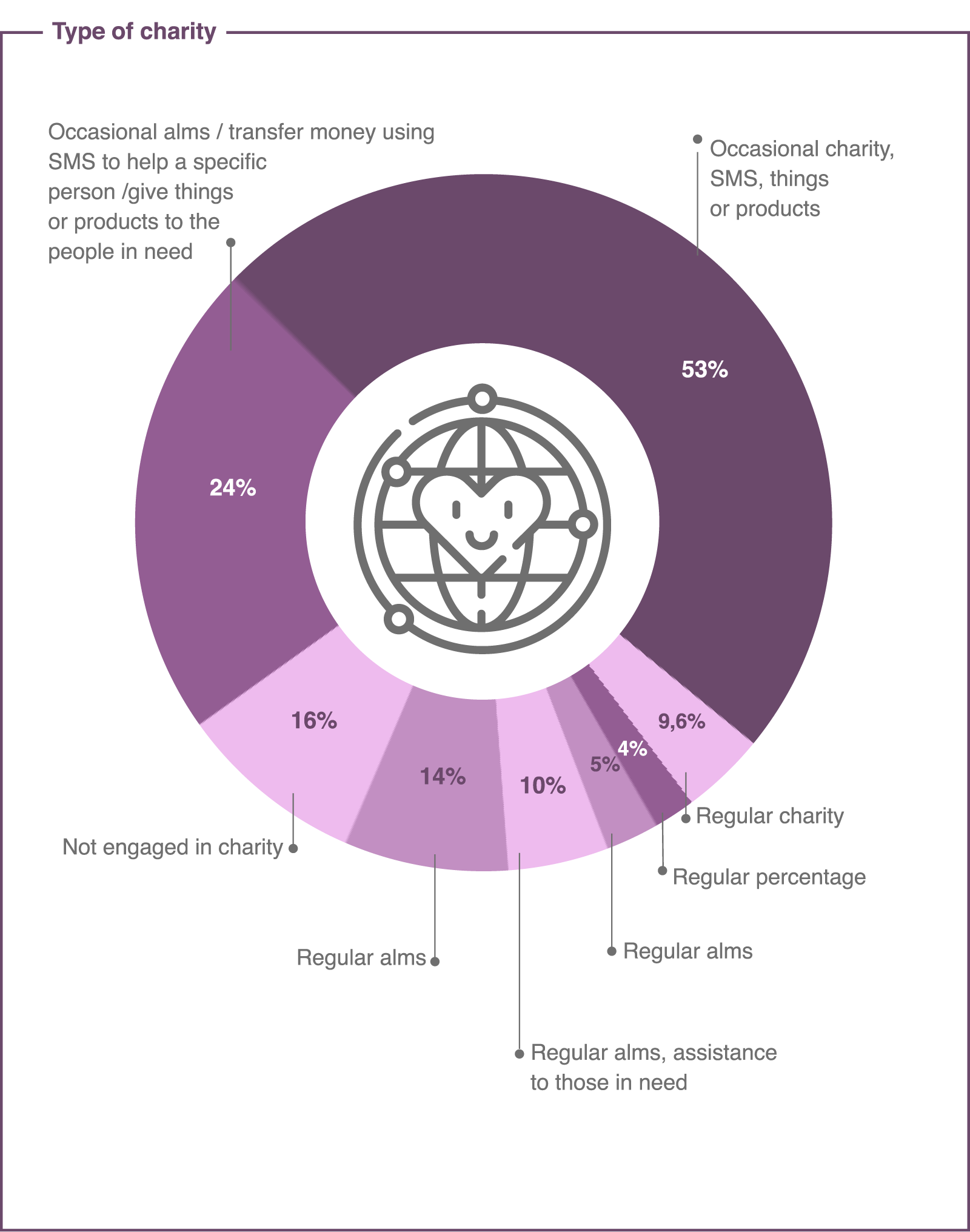
Source: Civic Chamber of the Russian Federation153 The survey was conducted from 24 August to 22 October via online questionnaires. 1257 respondents took part in the survey. Part of the questions in the poll were prepared with the support of POF. Description of the sample. Gender: 71% – female; 29%-male. Age: 19%-up to 20 years; 20.4%-from 21 to 30; 22.5%-from 31 to 40; 17.9%-from 41 to 50; 13.2%-from 51 to 60; 6.9% are older than 60; the other 0.1%. Education: 3.9% – incomplete secondary or below; 6.1% – general secondary (school); 3.1% – primary vocational (vocational school, college, lyceum, etc.); 9.6% – secondary special (secondary vocational school, technical school, medical school, etc.); 10.1% – incomplete higher education (studying at a university without obtaining a diploma); 60.3% – higher education; 6.7% – post graduate school, academic degree, title; 0.2% – other. Employment status: 17.6% – study; 11.2% study and work; 53.8% work; 11.1% are retired and work; 3.8% are pensioners; 1.5% are unemployed; 0.2% – other. Sector of employment: 18.6% – commercial organization; 17%- non-profit organization; 24.1% – state organization; 24, 9% – budgetary organization; 2.9% – individual entrepreneurs; 9.6% are self-employed; 2.9% – other. Financial standing: 2.2% – high, no material difficulties; 20.9% – relatively high, although some purchases are not affordable; 53.1%- average, enough money only for basic purchases; 19.1% – below average; 2.3% – below average, not enough money for many things; 1.8% – very low, living in extreme need; 1.8% – difficult to answer; 0.3% – other. Place of residence: 20.7% – capital of the Federation subject region; 51.2% – city; 26.6% – rural settlement; 0.5% – other.
According to a poll held by the Civic Chamber of the Russian Federation, the most popular areas of donations from citizens are helping people with serious illnesses (53.1% of respondents), orphans (43.7%) and people with disabilities. (35,6%). Interestingly, the top 3 answers coincide with similar POF154 Attitude to the charity//POF, 21.12.2017: https://fom.ru/TSennosti/13898. poll.
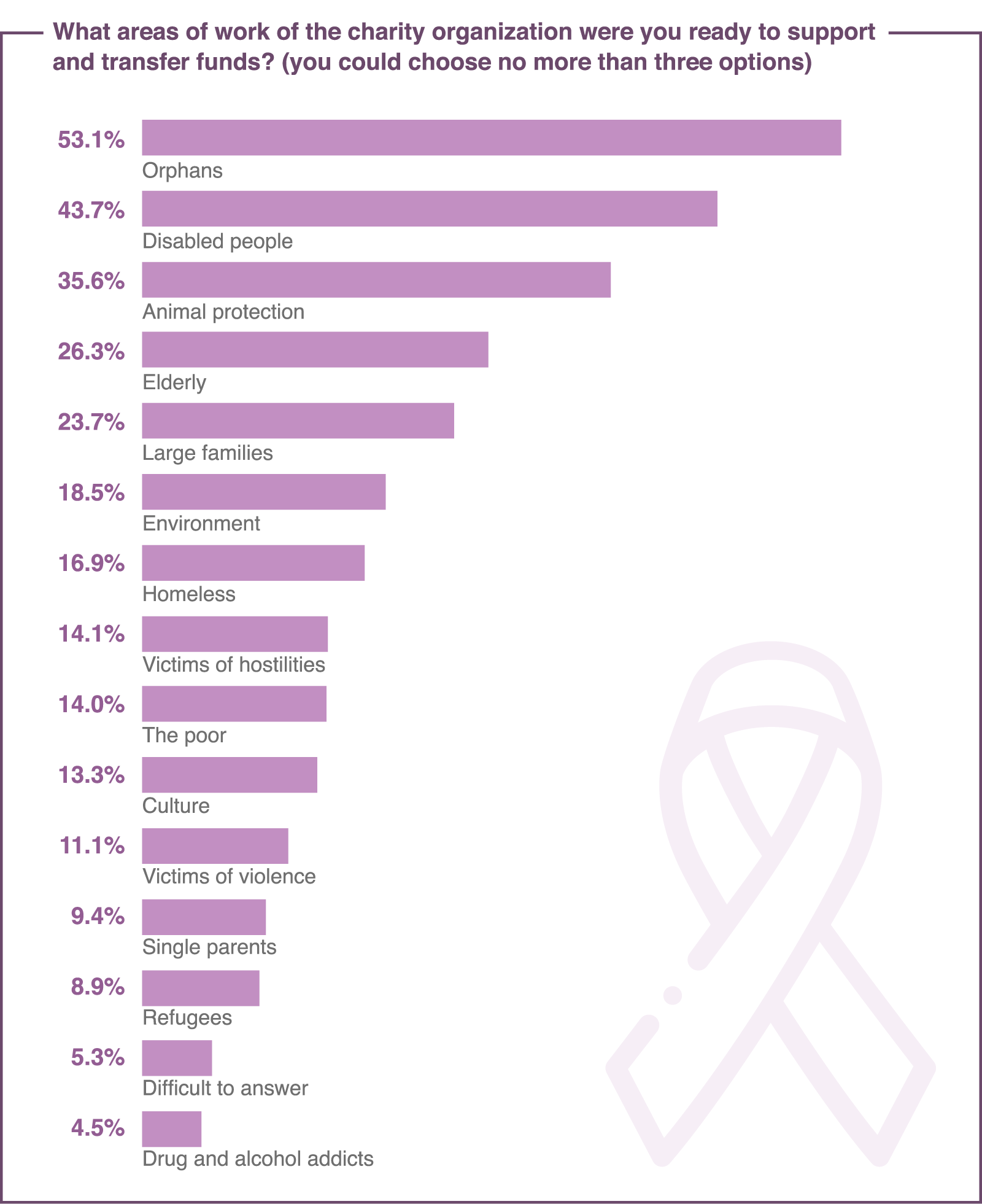
Source: Civic Chamber of the Russian Federation155 For survey description see link 153.
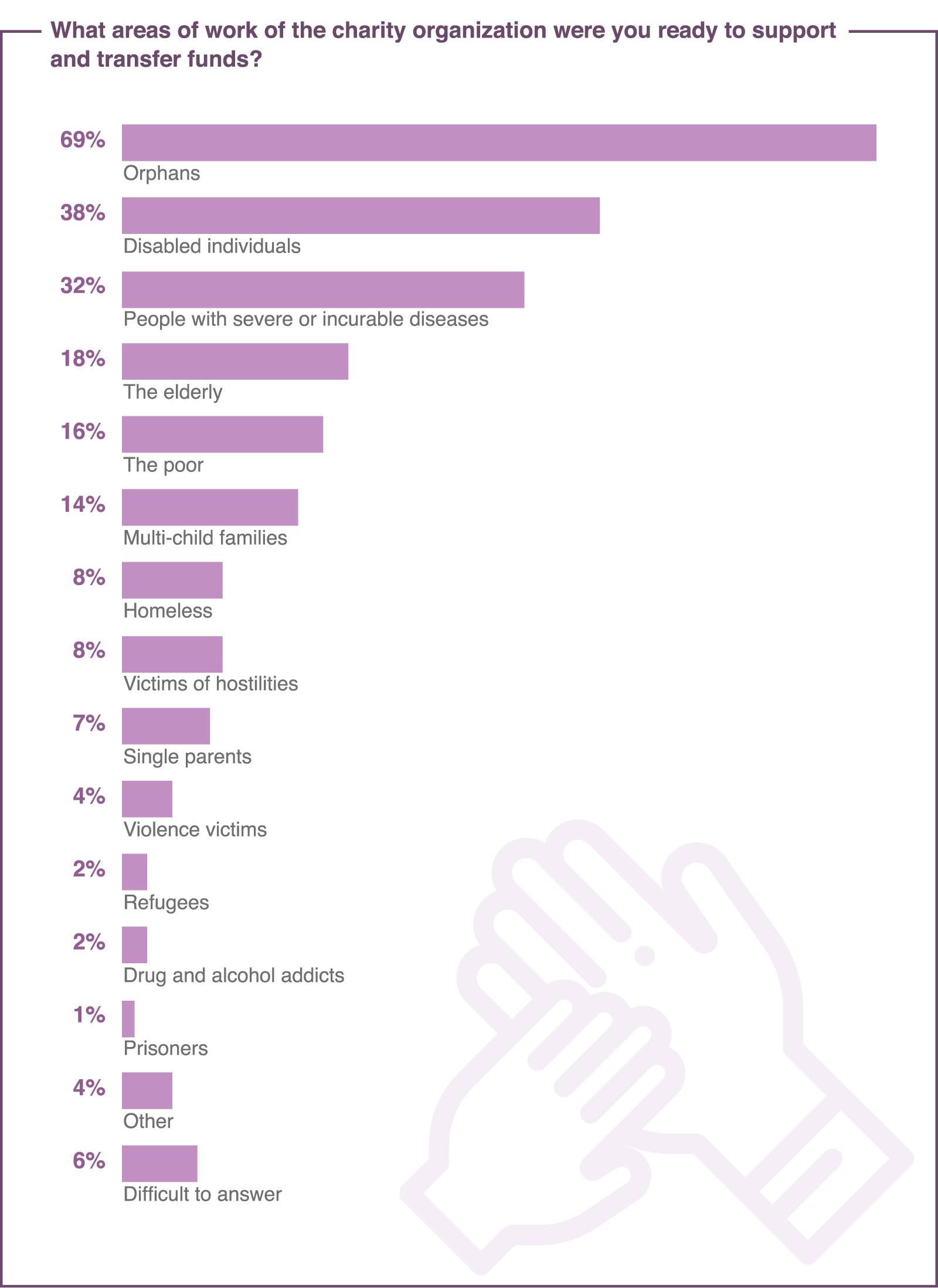
Source: Civic Chamber of the Russian Federation156 Attitude to the charity//POF, 21.12.2017: https://fom.ru/TSennosti/13898.
At the moment, the charity sector experts talk a lot about the importance of regular donations for the financial sustainability of charitable foundations and organizations157 “You don’t know how to help — ask”: charity in Russia//TASS: 05.09.2018 https://tass.ru/obschestvo/3582934.. So, in August 2017, Mitya Aleshkovsky, a co-founder of the “Need Help” charitable foundation and director of the “So It Goes” information portal, launched a “50 rubles” flash mob, through which he requested to issue a regular monthly donation of 50 rubles to support the foundation’s projects158 Mitya Aleshkovsky//Facebook 28.08.2017: https://www.facebook.com/photo.php?fbid=10214417312366041&set=a.1210300377068&type=3&theater.. In less than a day, the fund collected 5,139 new regular donations (before the start of the flash mob, the fund had only 63 regular donations). In 48 hours it managed to gather 707 827 rubles, and 564 088 rubles a month159 Successful fundraising campaigns of Russian NPO: “care calculator” and online auctions // Social Technology Greenhouse, 27.03.2018: https://te-st.ru/2018/03/27/fundraising-of-russian-ngo/..
However, donations from the population remain irregular. So, according to a survey of POF 86% of respondents do not think they can afford regular donations160 Attitude to the charity//POF, 21.12.2017: https://fom.ru/TSennosti/13898..
The participants of the Civic Chamber of the Russian Federation poll responded to a similar question with a more favorable answer for the development of the trend of regular donations, but the result is still generally low – only 8.1% of respondents donate money regularly and 23.3% of respondents considered they can afford it, but 51, 6% of respondents do not think they can afford regular donations.
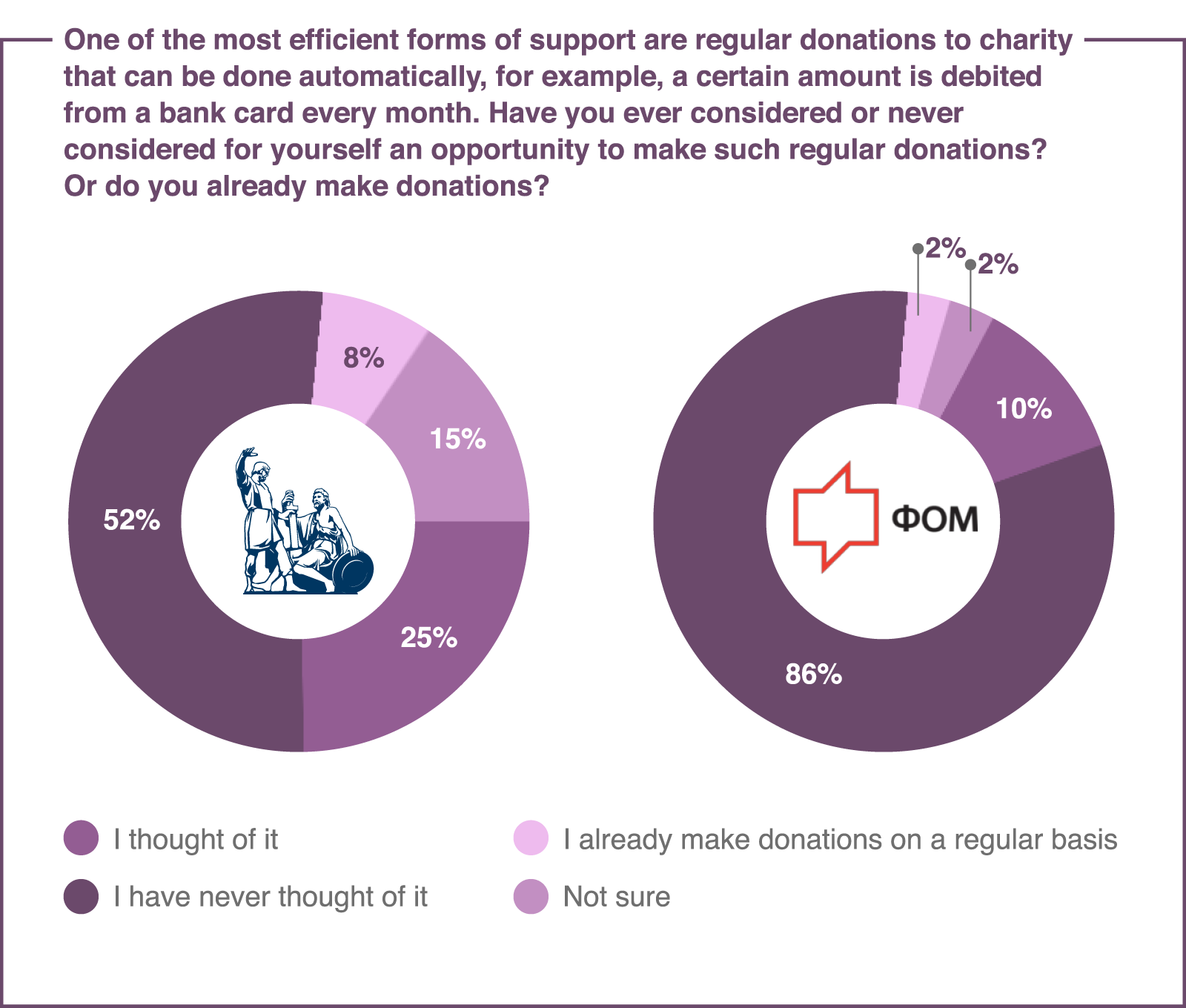
Source: Civic Chamber of the Russian Federation161 Description of the survey, see link 153. Source: POF162 Attitude to the charity//POF, 21.12.2017: https://fom.ru/TSennosti/13898.
Experts note that charitable activity through volunteering is coming to replace donations. Professional volunteering (pro bono) is actively developing: accountants, IT volunteers, lawyers are ready to join the NPOs. Corporate volunteering is developing.
Business also prefers not to increase charitable budgets, but concentrates on the development of corporate volunteering projects.
Also, some experts speak of a decrease in demand for a model of interaction between business and charitable foundations “donor-recipient” in Russia: business is no longer satisfied with the role of donors in the classical sense of the “cash cow”. Today, investors are interested in supporting local communities that are able to further scale up their activities independently. Actually part of the Russian business is ready to become a social investor163 Philanthropy at the threshold of the systematization. Analysis of trends, risks and opportunities of charity in Russia // Platform Social Design Center, September 2018: http://pltf.ru/2018/09/17/filantropija-na-poroge-sistemnosti-br-analiz-tendencii-br-riskov-i-vozmozhnostej-blagotvoritelnosti-v-rossii/..
In addition, some representatives of socially responsible business are switching to new models of partnership with NPOs in accordance with the goals of sustainable development, and prefer to develop social communities in their regions.
Business begins to introduce the practice of charitable deductions from the sale of commercial goods and services. As an example, we can cite the project Imaginarium Good held by the Civic Chamber of the Russian Federation jointly with Cosmodrome Games. Eight charitable foundations took part in creating Imaginarium Good Zhivi, Korablik, Ronald McDonald House, Vera, Sheredar, Nastenka, Sozidaniye and Rusfonf. All the cards in the new game were created on the basis of drawings by pupils of orphanages and children with serious illnesses. 100 rubles from the sale of each box will be given to charity to help children164 Board game Imaginarium Good to be presented at the festival “Good People” // Website of the Civic Chamber of the Russian Federation, 01.12.2018: https://www.oprf.ru/press/anno/newsitem/47449..
Government and and charity sector foster partnership. In 2018, the Government, in cooperation with the professional community began developing a new version of the concept of development of charity in Russia. The Government notes that the Concept should not only clarify certain tools to support the federal level, establish new tax breaks or expand property support, but also give impetus to further development of charity. In particular, the sector should offer ideas on creating motivation for state institutions to work more actively with charitable organizations, to motivate businesses to better understand the charitable sphere and to more closely involve managers of charitable programs in social policy development processes at the federal and regional levels165 Experts discuss a new concept for promoting the development of charitable activities//Social Information Agency, 12.10.2018: https://www.asi.org.ru/news/2018/10/12/ eksperty-obsuzhdayut-novuyu-kontseptsiyu-sodejstviya-razvitiyu-blagotvoritelnoj-deyatelnosti/amp/? __twitter_impression = true..
The charity foundations and organizations are increasingly working online. Gradually, the funds are abandoning offline events, in favor of the Internet undertakings. They develop activities in social media and online services to engage citizens. Active work on the part of charitable foundations and organizations is carried out by online polarization and recurrent donations166 Development, dialogue, volunteering: trends of the year in charity // Philanthrop magazine, 10.01.2018: http://philanthropy.ru/analysis/2018/01/10/59748/.. Social activists say that the online donations tool has yet to be developed and insist on further simplification: for example, it would be convenient if the “charity” button appeared in the mobile Internet bank167 We do not become richer, but become kinder//business magazine Profile, 06.03.2018: http://www.profile.ru/obsch/item/125159-my-ne-stali-bogache-no-stali-dobree..
Many funds today began to reflect on the possibility to ensure financial sustainability168 Trends, changing the social sphere//Vladimir Potanin Charitable Foundation, 16.02.2018: http://www.fondpotanin.ru/novosti/2018-02-16/38518839.. All major funds today employ professional fundraisers and actively use crowdfunding. Some NPOs were able to reach self-sufficiency and became social entrepreneurs. For example, with the support of the Center for Social Innovation, the project “Altaiskaya Avoska”, in which completely blind people work, received permission to open a shop at Barnaul airport and thus was able to pay the work of people under its care.
TODAY, CHARITABLE FOUNDATIONS AND NPOs ARE GENERALLY READY TO DEVELOP IMPORTANT LONG-TERM PROJECTS AND HAVE MOVED FROM SIMPLY PROVIDING SERVICES TO TRYING TO CHANGE THE SITUATION AT LARGE.
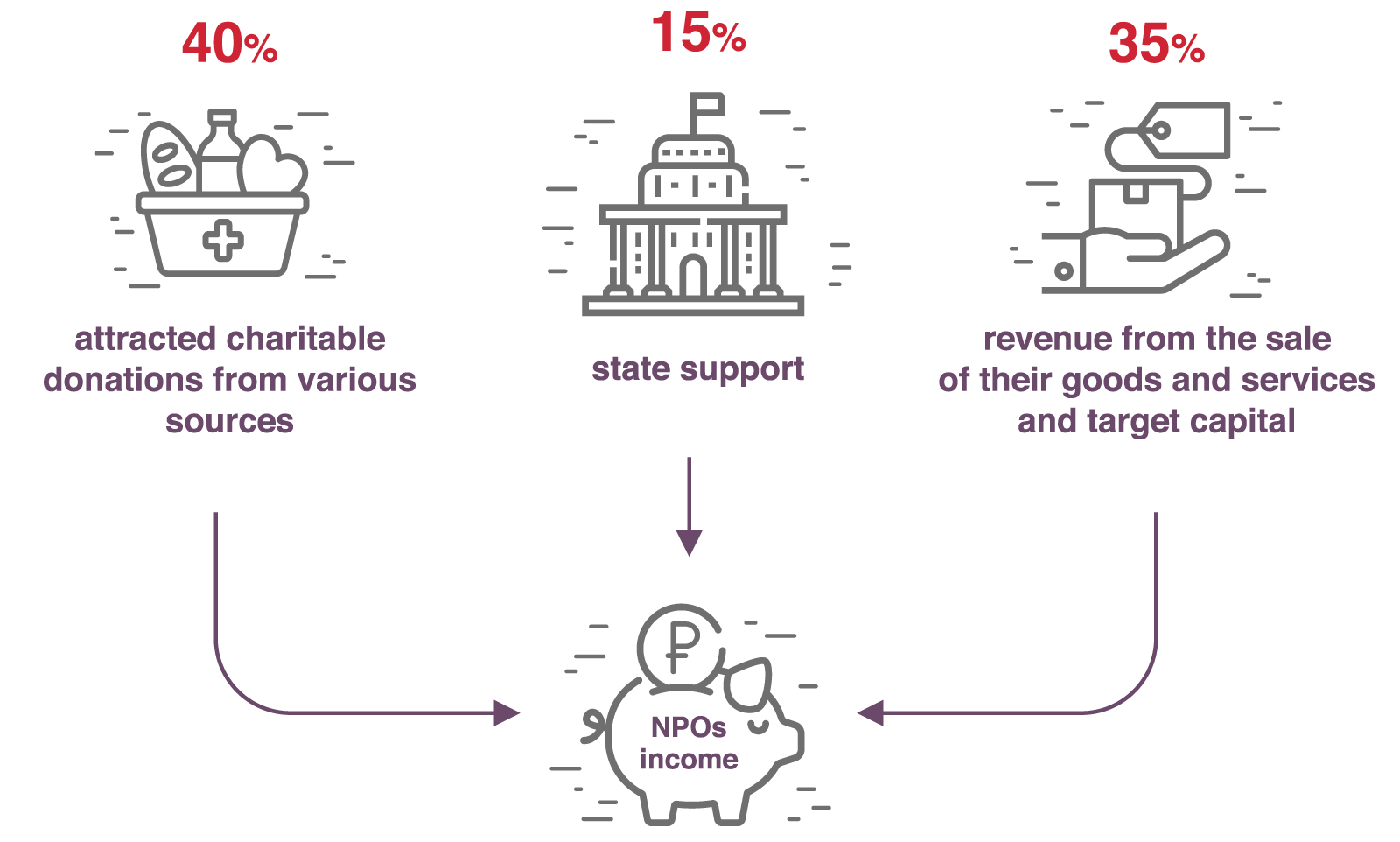
Source: Foundation “Need Help”169 Five years of fundraising in Russia//Need Help, 25.05.2017: https://nuzhnapomosh.ru/research/2017/pyat-let-fandrayzinga-v-rossii/.
Within the framework of the survey, the Civic Chamber of the Russian Federation tried to find out the attitude of citizens to financing charitable foundations by the Russian state, foreign states, foreign charitable foundations, foreign corporations and international organizations and development agencies. Russians have the least doubts about the support of a charitable foundation by the Russian state – 85.5% of respondents consider it permissible. 57.6% of respondents believe that the funds should be allowed to be raised from international organizations and development agencies; 53.3% of respondents – from foreign charitable foundations; 43.1% – from foreign countries and 40.4% – from foreign corporations.
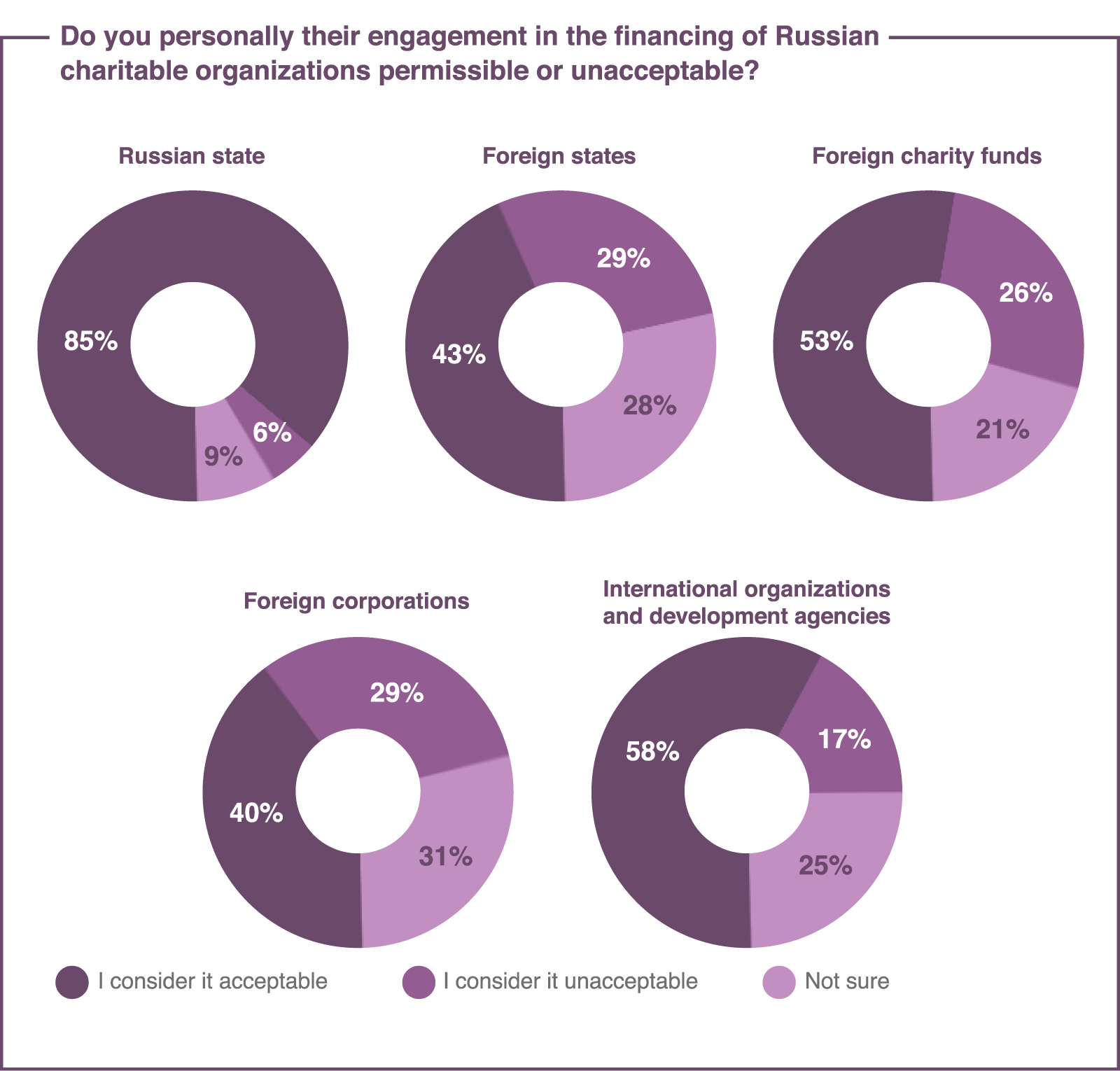
Source: Public Chamber of the Russian Federation170 Description of the survey, see link 153.
Today, charitable foundations and NPOs are generally ready to develop important long-term projects and have moved from simply providing services to trying to change the situation at large. Charitable funds are becoming newsmakers of the social agenda. While such funds are few, they still appear. In 2018, such projects included, for example: Rusfond’s project on the development of a national registry of bone marrow donors, the Joy of Old Age Foundation project on changing the policy on long-term care for the elderly171 Development, dialogue, volunteering: trends of the year in charity // Philanthrop magazine, 10.01.2018: http://philanthropy.ru/analysis/2018/01/10/59748/., Timchenko Foundation’s project on remote monitoring of chronic diseases in the elderly in rural areas, Filtech projects of Rybakov Fund to promote technologies of charity in the digital age172 Philtech website – Accelerator for social technology startups: http://go.philtech.ru/., the program Lift to the Future of the charity foundation of AFK System searching for technological solutions of social problems173 Digital transformation of charity — “this is a big internal challeng//IA REGNUM, 25.09.2018: https://regnum.ru/news/society/2488449.html..
Well established social partnership projects of NPOs and the State174 Social partnership: NPO and State//Website of the Civic Chamber of the Russian Federation, 24.01.2018: https://www.oprf.ru/press/news/2018/newsitem/43714.. For example, great success has been achieved in the field of children’s palliative. Now, NGOs and the state are trying to apply the same approaches to the adult palliative.

One of the main trends of recent years is the willingness of charitable foundations and organizations to unite and create specialized communities: joint fundraising events are held (Meet for Charity, Hearty Bazar, etc.), the All Together Association is created – a project to combat fraud in the field of charity176 The All Together association project: http://stop-obman.info/..
Experts talk about increasing the level of professionalism of managers in the third sector and about raising the demand for professionalization on the part of representatives of the sector. In this regard, there are more and more new proposals for the training and development of employees and volunteers of charitable foundations and organizations.
Large funds are increasingly resorting to social appraisal of the results of their activities177 Hartnell K. Charity in Russia. Summary report // Philanthropy for Social Justice and Peace featuring magazine Alliance, WINGS and CAF Russia, January 2018: http://www.psjp.org/wp-content/uploads/2018/01/Philanthropy-in-Russia_RUS_fin.pdf.. There is still a lot of controversy on this issue, since there are no universal and objective evaluation criteria. The sector participants are working together to work out suitable approaches. In particular, there are contests “Objective Charity”, “Point of Reference”178 contest Reference Point // Donors Forum Website: http://www.donorsforum.ru/projects/tochka-otschyota/$The non-profit sector is becoming more and more open – the results of “Starting Point” contest announced // Donors Forum website, 22.11.2018: http://www.donorsforum.ru/reports/nekommercheskij-sektor-stanovitsya-vse-bolee-otkrytym-obyavleny-itogi-konkursa-tochka-otscheta/?fbclid=IwAR0X-F-PNyVfESjkGgBt9JgAqqMlRyzh2reQJu7TBEjBk57584aWOx3NyuM.
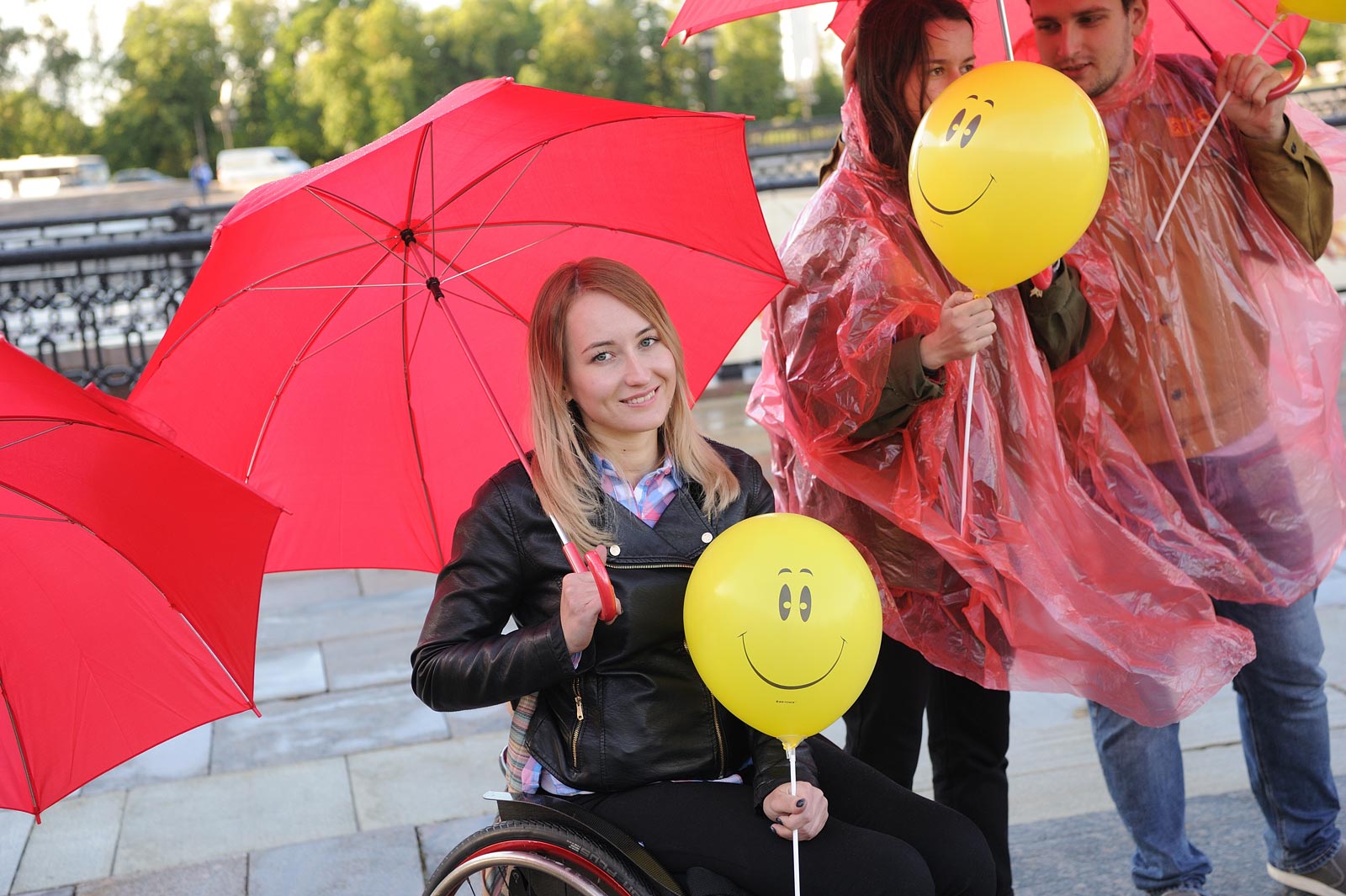
In general, the mentioned trends indicate the development of the sector and its professionalization, however, many unresolved problems remain within the sector.
The media continuously transmit stories of children and adults who are deprived of the opportunity to receive free medical care and are forced to seek help. At the moment, the problem has reached a huge scale, but the authorities still do not react to it. Although, according to the Constitution, the Russian Federation is a social state whose policy is aimed at creating the conditions that ensure a decent life for a person and the protection of his/her health.
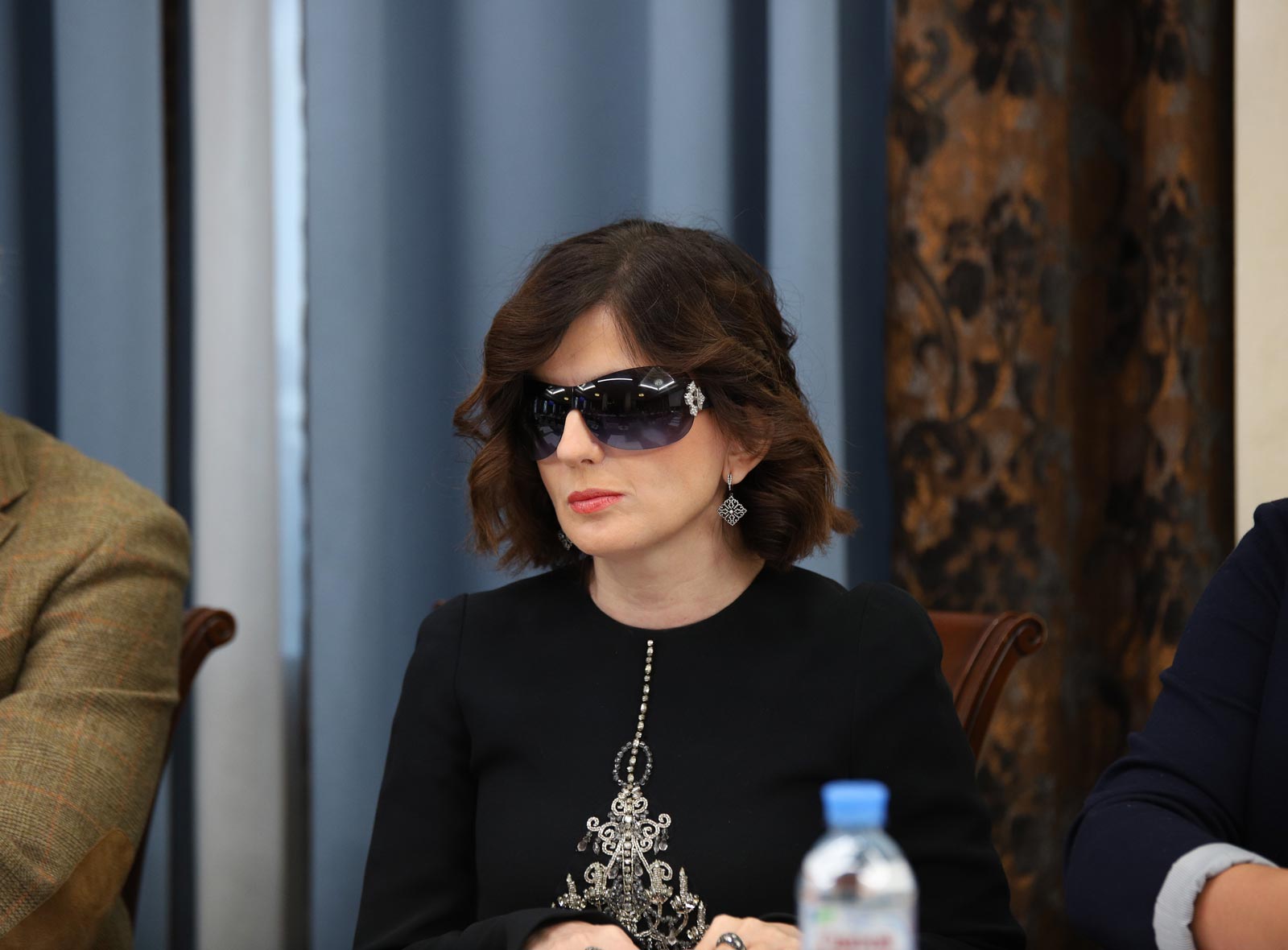
Social activists ask themselves questions: why is this happening? Is there really no way to grow up domestic highly-qualified specialists or send them to overseas internships? Is there really not enough medical equipment in the country?
Solving the problem is possible only after increasing the responsibility for such cases by the Ministry of Health. It is necessary that in each case the heads of the ministry explained the reasons, why free treatment in the country is not available for people. The Civic Chamber considers it important to know through whose fault the citizens are deprived of the right to recovery179 On the right to recovery // Website of the Civic Chamber of the Russian Federation, 15.01.2018: https://www.oprf.ru/blog/?id=2290..
This led to the fact that today in the field of charity there is a place for fraud and unfair practices. The most pressing problems of the sector in recent years are false charity and toxic charity.
The conditions for the development of these problems are created by the people themselves. According to public opinion polls, citizens trust funds that provide assistance to specific people, rather than those who provide assistance to entire categories of citizens or raise funds to solve a social problem in general (for example, improving the environmental situation in a particular region or solving social orphanhood).
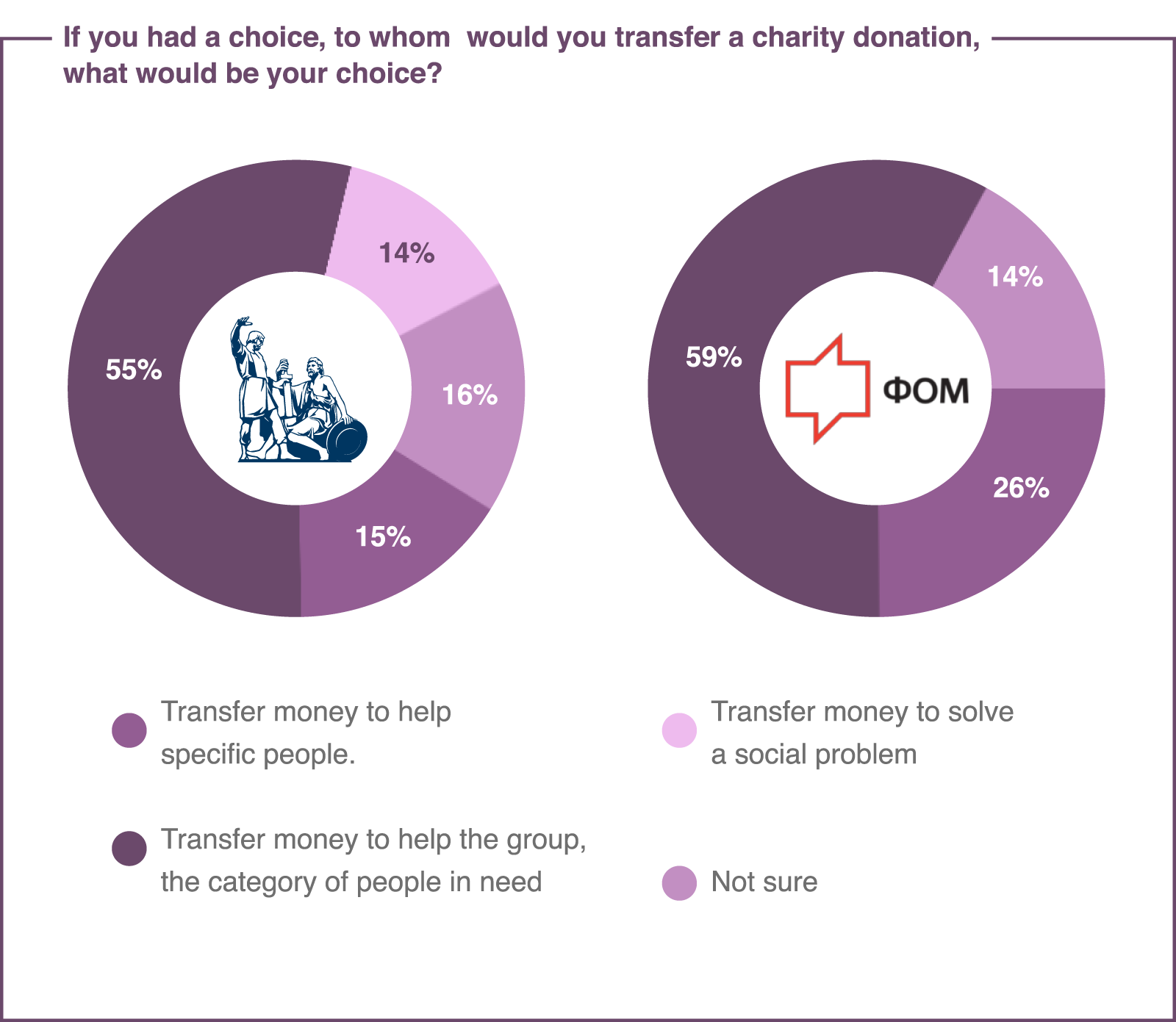
Source: Civic Chamber of the Russian Federation180 Description of the survey, see link 127. Source: POF181 Attitude to the charity//POF, 21.12.2017: https://fom.ru/TSennosti/13898.
The community of the charity sector is actively shaping ethical standards and seeking protection from crooks, but pseudo-charitable foundations that send “volunteers” on electric trains don’t care about ethics. Most citizens are not so deeply immersed in the topic of charity after seeing an emotional picture emotionally quickly send money to a transparent box or make a click.
The problem of collecting cash in boxes is that the so-called face-to-face campaigns are an accepted practice of attracting private philanthropists and informing citizens about social issues around the world. Fundraising with the use of boxes for fundraising is used in Russia not only by scammers, but also by reputable funds, and you need to look for solutions to this problem by combining the efforts of foundations, law enforcement agencies and volunteer organizations.
Within the sector, it is necessary to create broader coalitions — we need registries of trustworthy organizations that exist in other countries. But these registries should be created solely by organizations, not from above. Today, various lists of NPOs have already been created – for example, organizations verified by Welcome.Mail.ru, but apparently this is not enough182 Elena Topoleva: to combat crooks, we need registers of well-meaning NPO // Mercy.ru, 10.29.2018: https://www.miloserdie.ru/news/elena-topoleva-dlya-borby-s-moshennikami-nuzhny-reestry-blagonamerennyh-nko/?fbclid=IwAR2_Z1OI97WAmYgXIDz5cj2LsnXD0ZzK-QfBnHHb8zpNADyUX8w-ERedpY0..
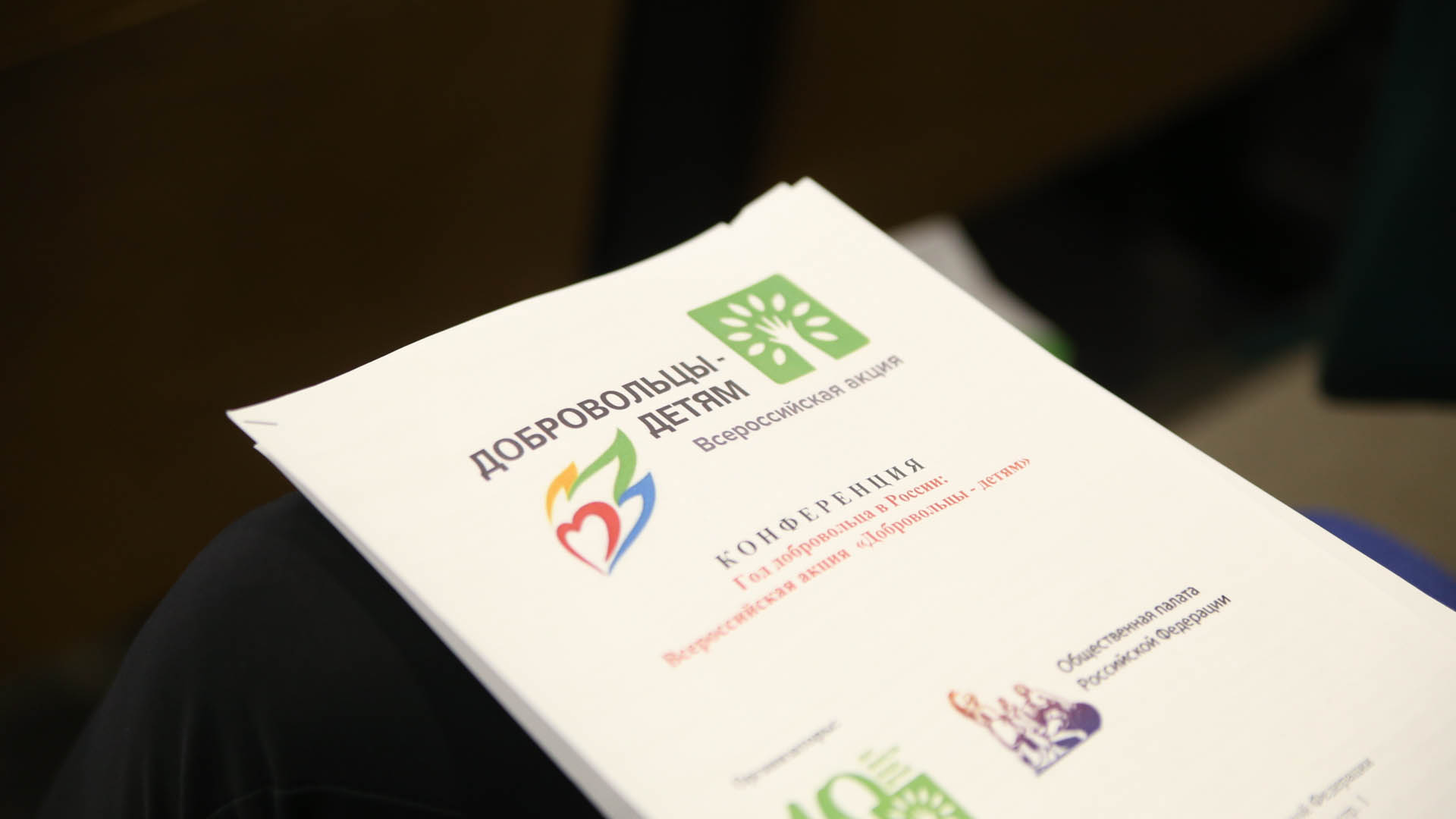
It will not be possible to defeat the scammers only by the forces of the non-profit sector – the state must be involved in this process. For the time being, law enforcement agencies have no particular interest in illegal fundraising on the street, since these cases qualify as insignificant. Greater attention to bodies attracts fundraising through advertising on federal television channels.
Modern legislation does not help to protect against crooks. On April 13, 2018, the State Duma submitted a draft amendment to the law on charitable activities (No. 441707-7 “On Amendments to the Federal Law “On charitable activities and charitable organizations”), which determine the requirements for installing and using the donation boxes (the bill is on preliminary consideration)183 Bill No. 441707-7 “On Amendments to the Federal Law” On Charitable Activities and Charitable Organizations “(in terms of introducing the concept and types of donation boxes) // System for ensuring legislative activity: http://sozd.parliament.gov.ru/bill/441707-7.. The draft law was developed by a group of deputies jointly with representatives of the largest charitable organizations in the country and prohibits the collection of funds through donation boxes for NGOs that do not have the right to engage in charitable activities.
In addition to external legislative regulation, the third sector needs internal self-regulation in the fight against crooks. The charitable community should itself propose mechanisms for assessing the professionalism, ethics and transparency of charitable organizations, and also work more actively with law enforcement agencies to curb the activities of false charity foundations, twin foundations of well-known organizations. Charitable funds may initiate the creation of a “trust rating”, which will include an assessment of colleagues within the professional community184 Trust for five stars: charitable foundations were offered to create an internal trust rating // Site of the Civic Chamber of the Russian Federation, 11/03/2018: https://www.oprf.ru/press/news/2018/newsitem/47190..
There are also proposals to extend the practice of public control to charitable foundations and organizations, but not all representatives of the sector support this initiative.
Unfortunately, the methods of toxic charity today are resorted to not only by crooks, but also by charitable foundations themselves. Many funds build their work on collecting money for a particular child. Most often, the surname, name and patronymic, details of the diagnosis are published, which undoubtedly violates the rules for the protection of personal data185 “It is important not to harm the hero of your” novel “by writing an article” // Site of the Civic Chamber of the Russian Federation, 27.10.2018: https://oprf.ru/press/news/2018/newsitem/46720..
The society reacts quite painfully to such photos of children, and more and more often there is a discussion in the media about the inadmissibility of this form and search for other methods.
To solve this problem, it is advisable to create, at TV channels, a commission for placing social advertising that would evaluate information about a charitable organization wishing to disseminate information about a charitable collection on the subject of toxicity and fraud. Scammers use the fact that they are not checked – they come to the sales department, buy the advertising time and collect money from millions of viewers to their pockets186 Elena Topoleva: to combat crooks, we need registers of well-meaning NPO // Mercy.ru, 10.29.2018: https://www.miloserdie.ru/news/elena-topoleva-dlya-borby-s-moshennikami-nuzhny-reestry-blagonamerennyh-nko/?fbclid=IwAR2_Z1OI97WAmYgXIDz5cj2LsnXD0ZzK-QfBnHHb8zpNADyUX8w-ERedpY0..
The Civic Chamber of the Russian Federation appealed to the Prosecutor General of the Russian Federation with a request to conduct an audit of the activities of the Golden Hearts Foundation and take measures to restore the rule of law.
The Civic Chamber of the Russian Federation also appealed to the management of Gazprom-Media holding: on TNT and NTV channels making part of its structure, a video clip of the Golden Hearts Charity Foundation was shown dedicated to raising funds for the treatment of Alina K. According to the information available to public figures, it was done contrary to the prohibition of the parents of the child, and the money raised was not transferred to them187 Fraud or charity? `The Civic Chamber of the Russian Federation got interested in the activities of a charitable foundation // Website of the Civic Chamber of the Russian Federation, 10/19/2018: https://www.oprf.ru/press/news/2018/newsitem/46979?fbclid=IwAR0nDTghiR7ZwZrL_h_aG104NqBAYENk3jtFlmMndw8s6G2TRhmSlvGoLt0..
In its response to the request of the Civic Chamber of the Russian Federation, Gazprom-Media Holding reported that it had ceased cooperating with the Golden Hearts Foundation and broadcasting the video immediately after the appearance of information about the fund’s unfair activities. Also after the incident, Gazprom-Media Holding additionally informed the subsidiaries of the need to increase attention to verifying the information provided by charities for a public demonstration.
Low confidence of people is still a pressing problem of the sector188 A Toast for Trust // Philanthrop magazine, 12.28.2017: http://philanthropy.ru/analysis/2017/12/28/59645/.. According to the KAF Foundation, approximately 65% of Russians are convinced that the money donated to charity will not reach those, who really need it. The poll of the National Research University Higher School of Economics shows that only 6% of Russians declare their trust in charitable foundations and 15% in charitable events189 We do not become richer, but become kinder//business magazine Profile, 06.03.2018: http://www.profile.ru/obsch/item/125159-my-ne-stali-bogache-no-stali-dobree.. However, the POF poll shows more “bloomy” numbers, in general, 45% of respondents trust charitable organizations and 36% do not trust them190 Attitude to the charity//POF, 21.12.2017: https://fom.ru/TSennosti/13898..
According to a poll by the Civic Chamber of the Russian Federation, 11.4% of respondents generally trust charitable foundations; 15.1% trust individual organizations and 39.5% of respondents trust those organizations, whose activities they can personally verify. 16.1% of respondents definitely do not trust charitable organizations.
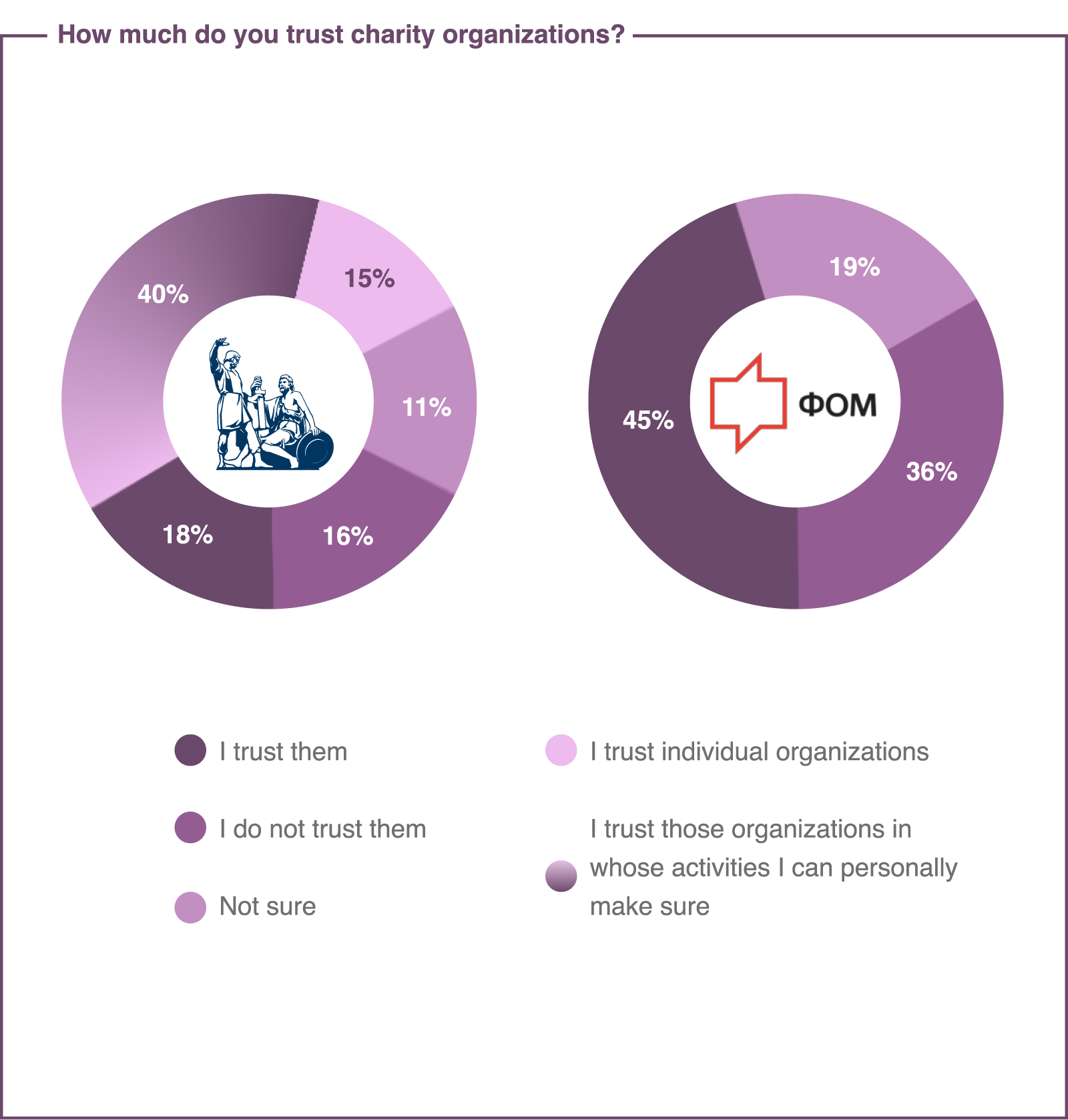
Source: Civic Chamber of the Russian Federation191 For survey description see link 153. Source: POF192 Attitude to the charity//POF, 21.12.2017: https://fom.ru/TSennosti/13898.
When asked by the Civic Chamber of the Russian Federation about the reasons for trust, a charitable organization, 50.9% of respondents called the provision of real assistance to charitable organizations; 36.5% chose the ability to check the activities of a charitable organization; 27.7% called trust in specific funds and their representatives.
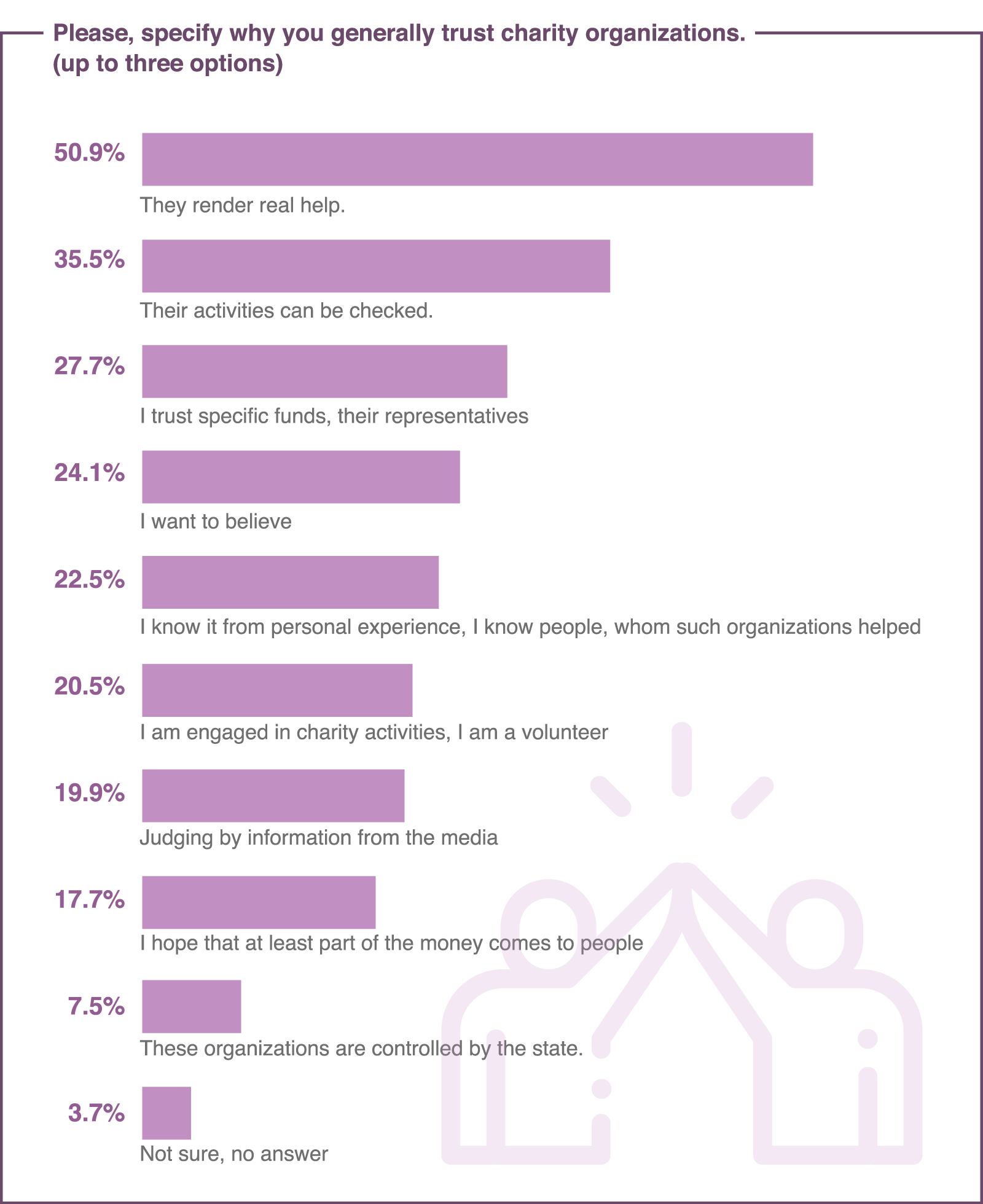
Source: Civic Chamber of the Russian Federation193 For survey description see link 153.
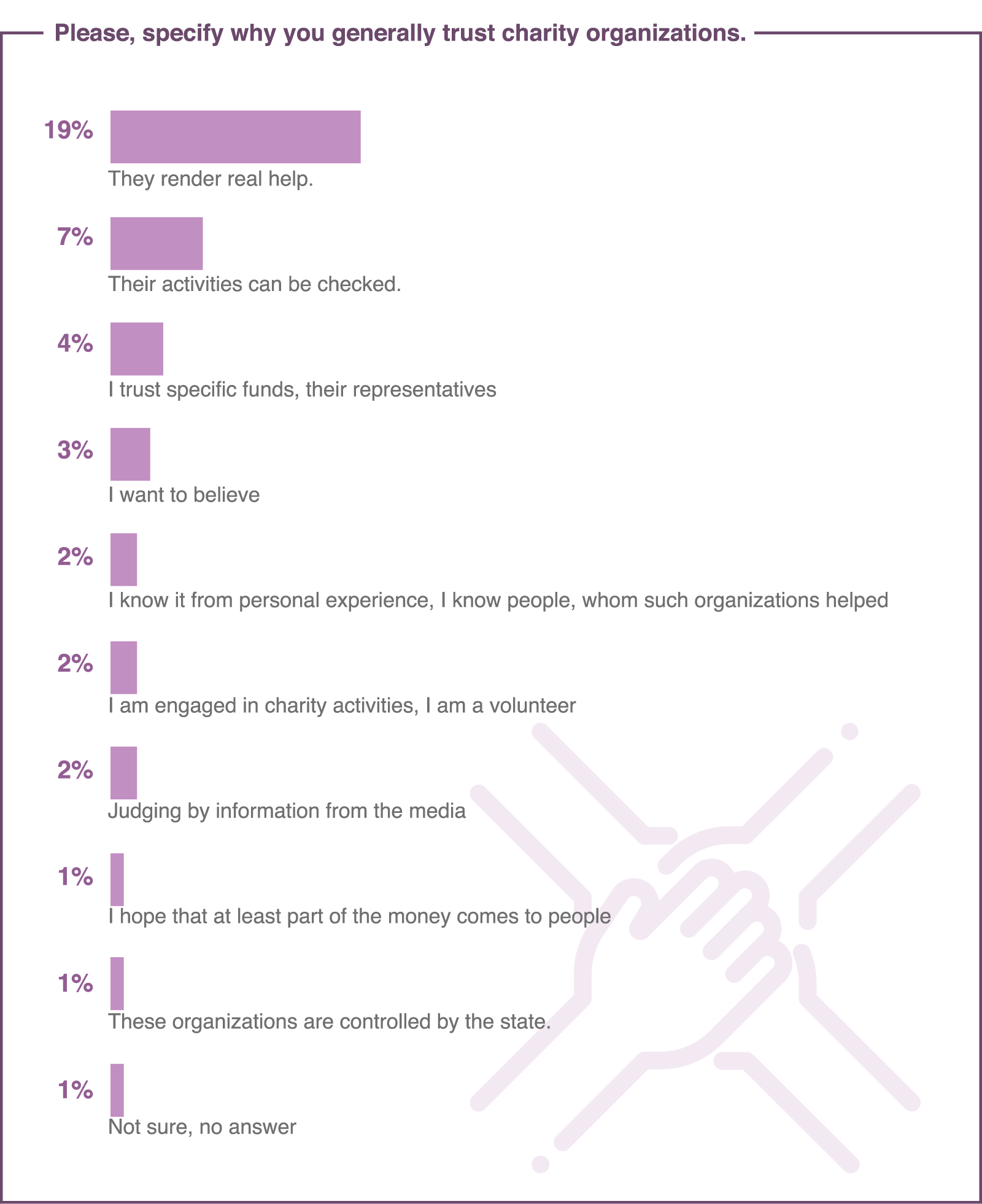
Source: POF194 Attitude to the charity//POF, 21.12.2017: https://fom.ru/TSennosti/13898.
The main reasons for mistrust to charitable organizations, according to respondents of the Civic Chamber of the Russian Federation, are the lack of control, transparency, and reporting (47.8%); respondents perceived charitable organizations as crooks who steal money and do not convey it to people (24%); awareness of specific examples of the dishonesty of charitable organizations (22.6%).
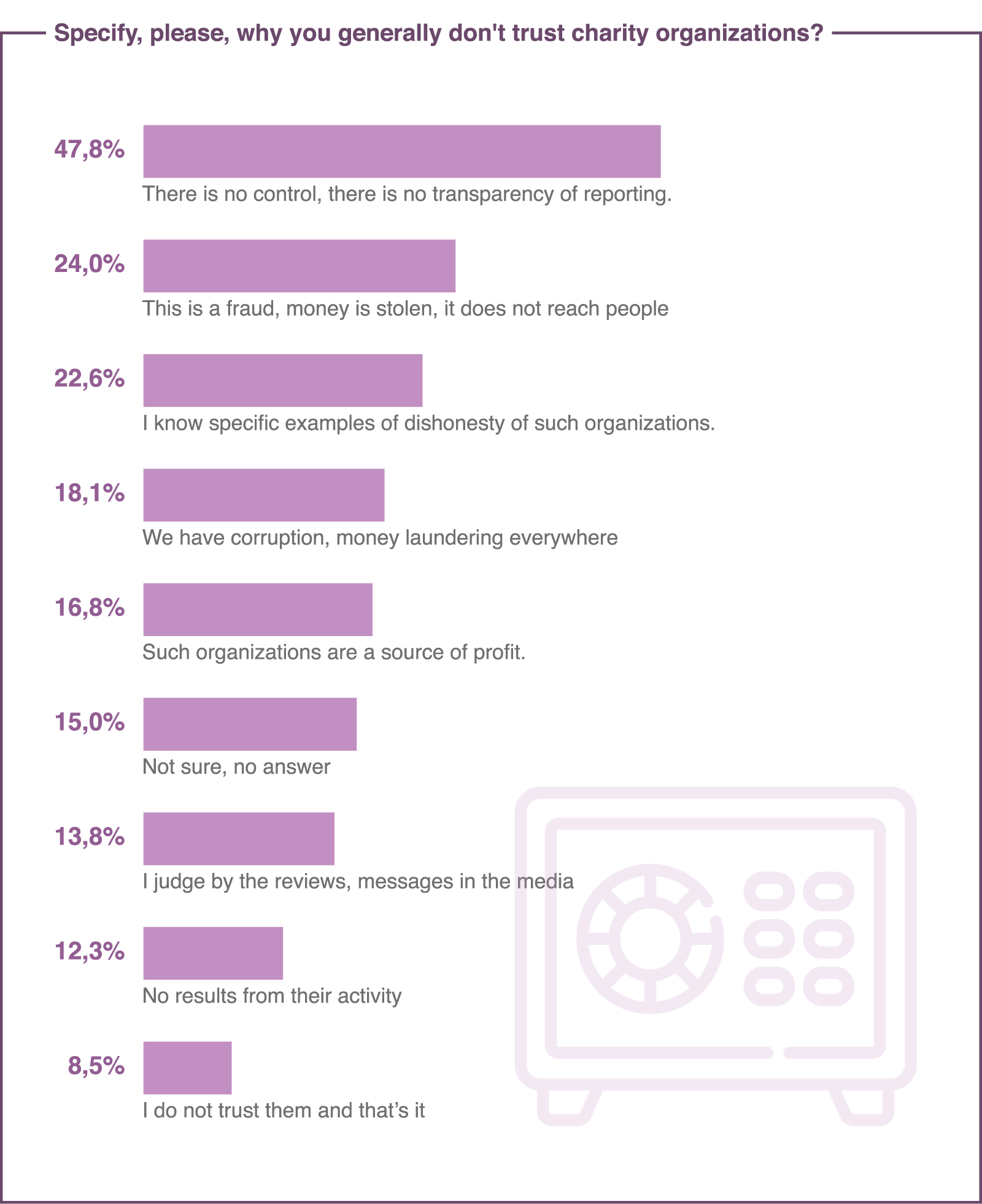
Source: Civic Chamber of the Russian Federation195 For survey description see link 153.
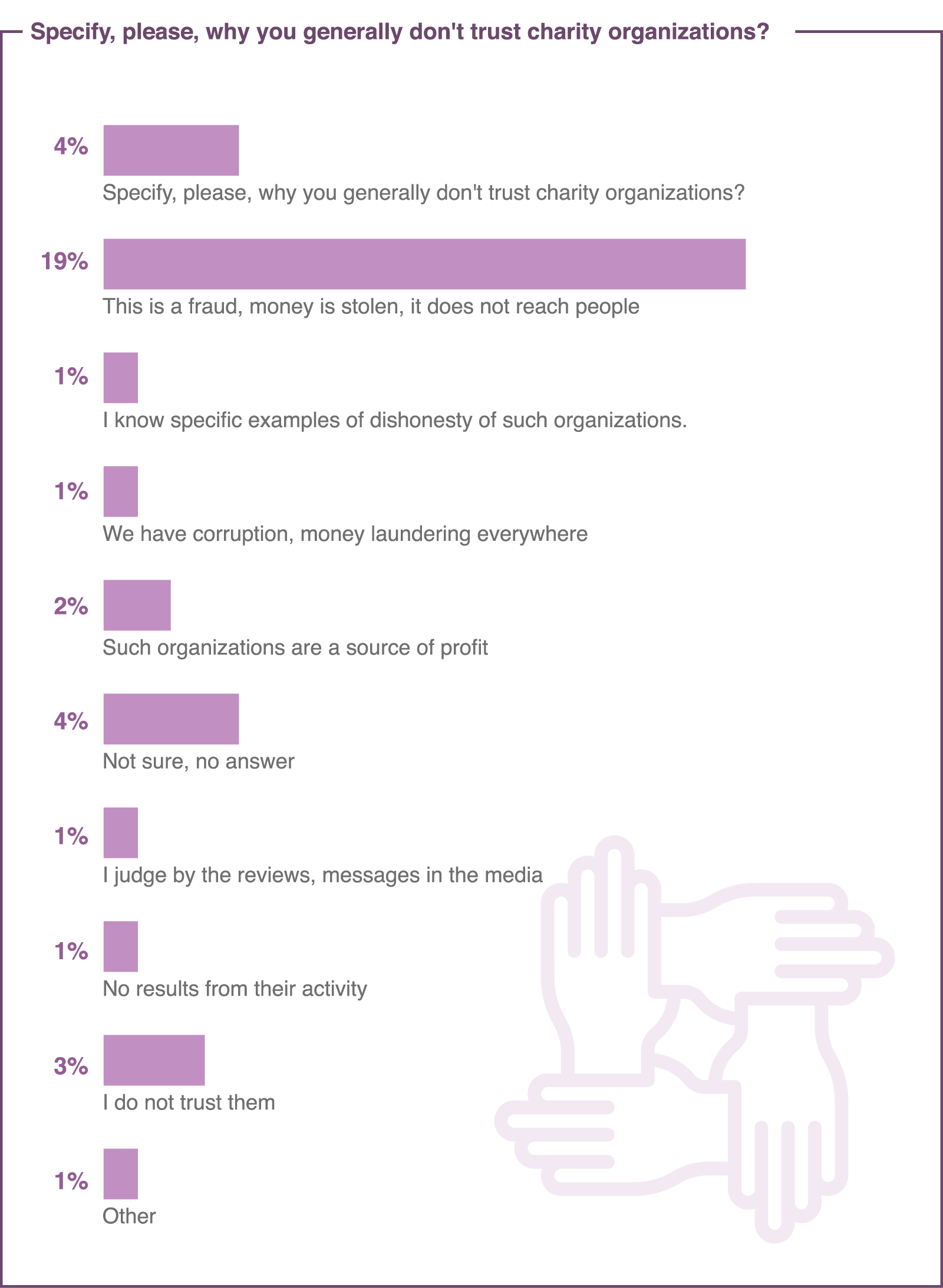
Source: POF196 Attitude to the charity//POF, 21.12.2017: https://fom.ru/TSennosti/13898.
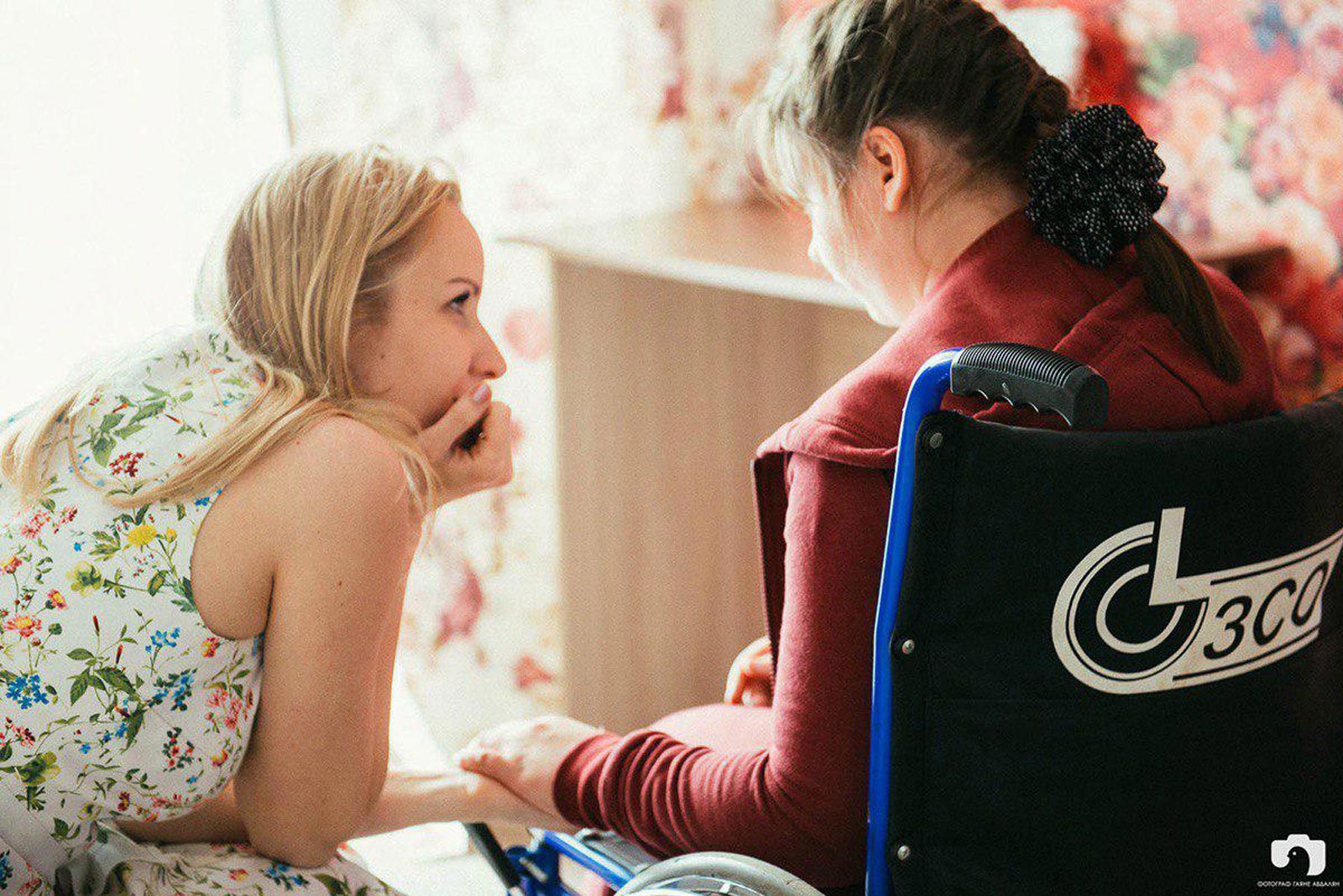
Trust between charities and society is undermined by high-profile reputational scandals. The scandal around the “Fair Help of Doctor Liza”197 It didn’t work out without Doctor Liza // Znak Internet newspaper, 08.08.2018: https://www.znak.com/2018-08-08/kak_fond_elizavety_glinki_doshel_do_publichnogo_skandala_i_ugolovnogo_dela. foundation and the head office of the Russian Red Cross has not ceased198 “After the audit, financing was terminated” // Znak Internet newspaper, 10.08.2018: https://www.znak.com/2018-08-10/mezhdunarodnyy_krasnyy_krest_priostanovil_sotrudnichestvo_s_golovnym_ofisom_rossiyskogo_krasnogo_kre..
Sector participants admit that many of the above problems arise from the low transparency of the work of charitable foundations and programs. Very few funds publish financial statements and activity reports on their websites. For example, in the fall of 2018, technical support for the social network VKontakte threatened to close the group of the social movement against slavery “Alternative” – because the movement does not follow the fundraising rules that VKontakte established for its users. The group “Alternative” has no monthly reports in the social network “VKontakte”, only a table in the “Google Docs”, but the data contradict the words of the leader of the movement199 Collection against slavery // Rusfond, 26.09.2018: https://www.rusfond.ru/technology/011#text.. Such situations are unacceptable when working with private donations.
In addition, over the years, representatives of the sector talk about the absence of tax incentives. Legal entities involved in charitable activities have no tax benefits, and NPOs employees experience the same tax burden as entrepreneurs. In fact, part of the funds that the charitable funds collect as donations, have to be given to the state as taxes – it prevents development. Self-employed citizens are stimulated by tax holidays, while non-profit organizations are not encouraged at all200 Tax benefits, crooks and the “kindness diary”: what NPO were talking about with Dmitry Medvedev // Philanthropist magazine, 08.06.2018: http://philanthropy.ru/news/2018/06/08/64310/.. Representatives of charitable organizations are asked to leave a credit insurance contributions to charities that expires this year201 Tax benefits, crooks and the “kindness diary”: what NPO were talking about with Dmitry Medvedev // Philanthropist magazine, 08.06.2018: http://philanthropy.ru/news/2018/06/08/64310/..
THE MOST PRESSING PROBLEMS OF THE SECTOR IN RECENT YEARS ARE FALSE CHARITY AND TOXIC CHARITY. THE COMMUNITY OF THE CHARITY SECTOR IS ACTIVELY SHAPING ETHICAL STANDARDS AND SEEKING PROTECTION FROM CROOKS. IT WILL NOT BE POSSIBLE TO DEFEAT THE CROOKS ONLY BY THE FORCES OF THE NON-PROFIT SECTOR – THE STATE MUST BE INVOLVED IN THIS PROCESS.